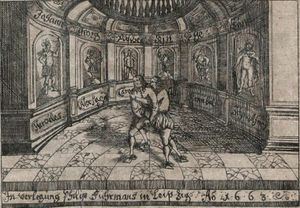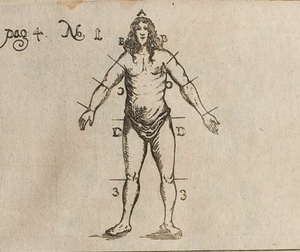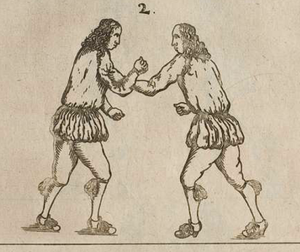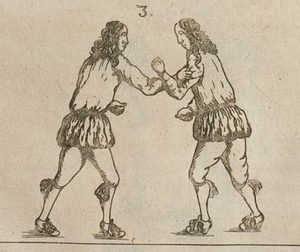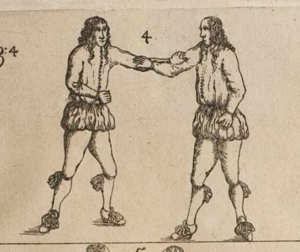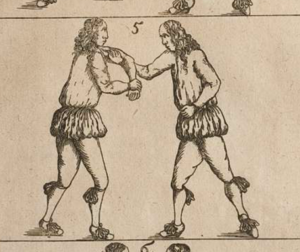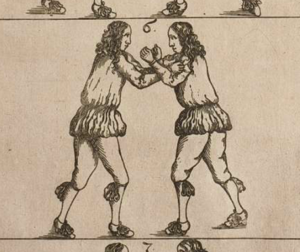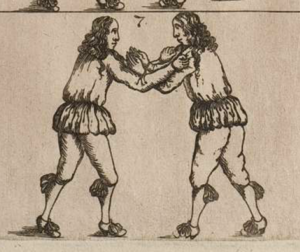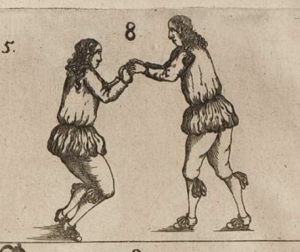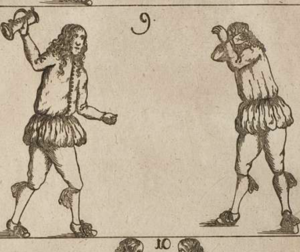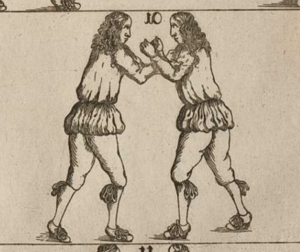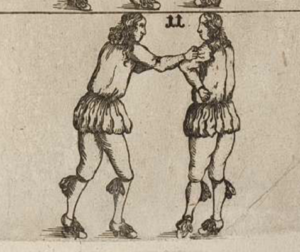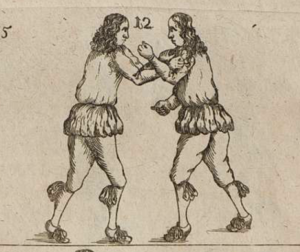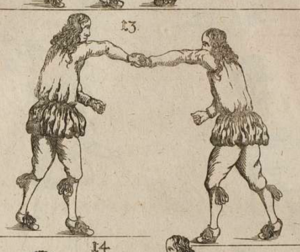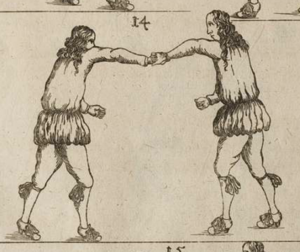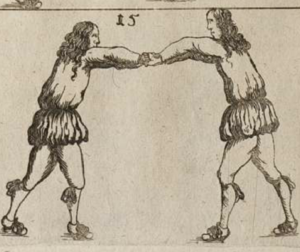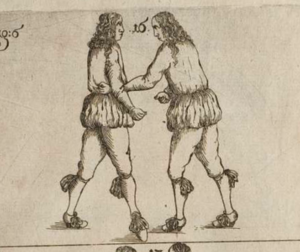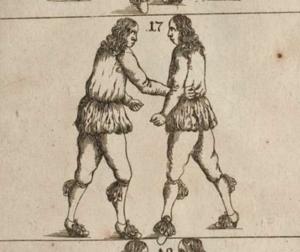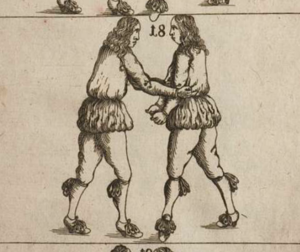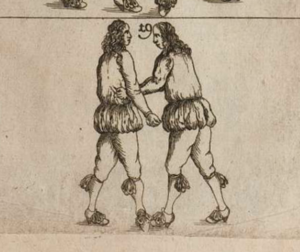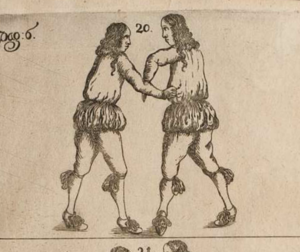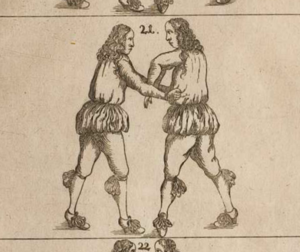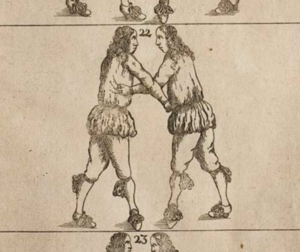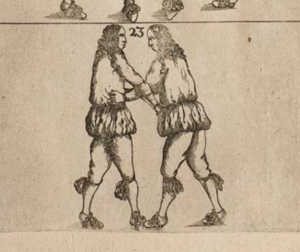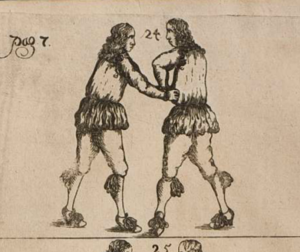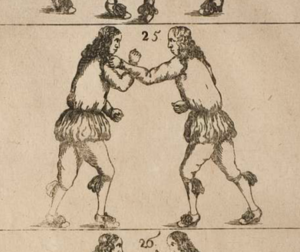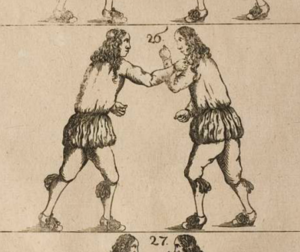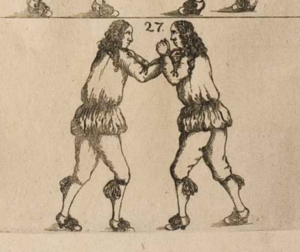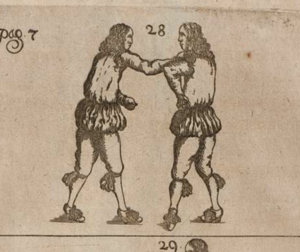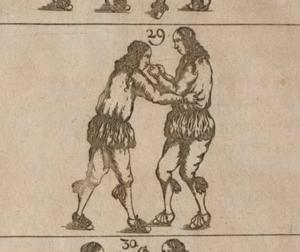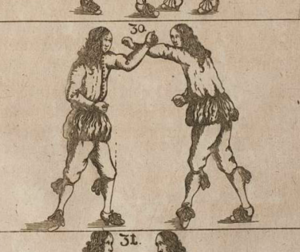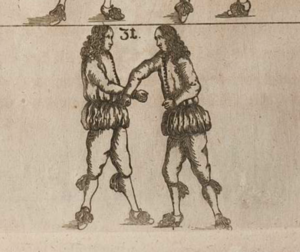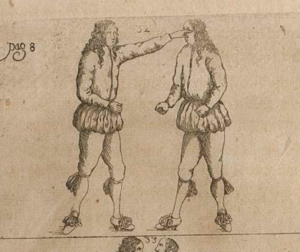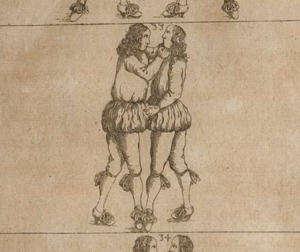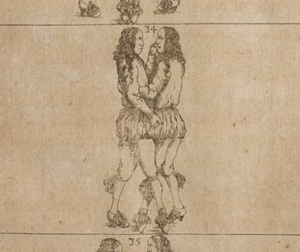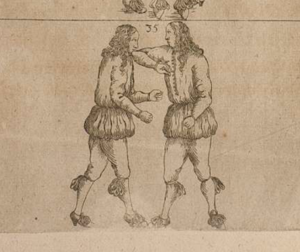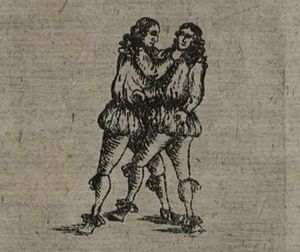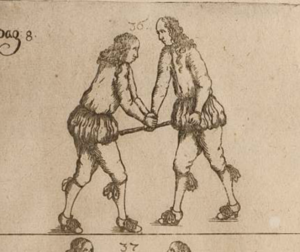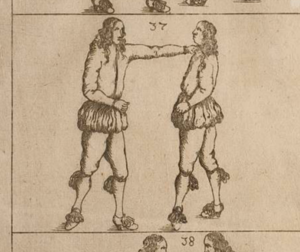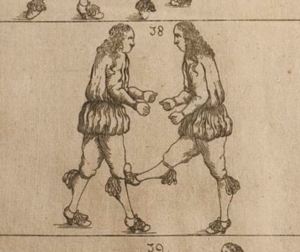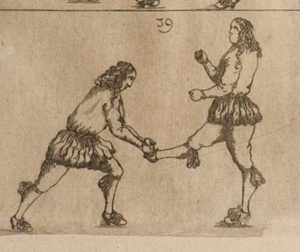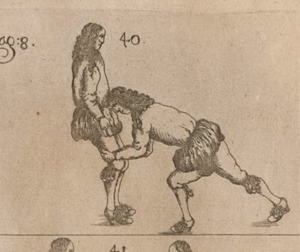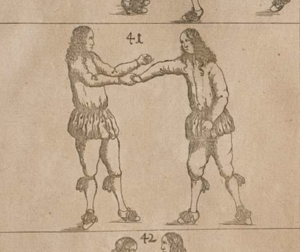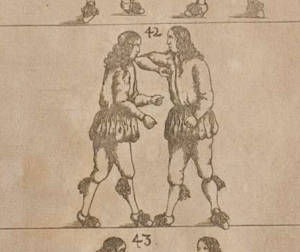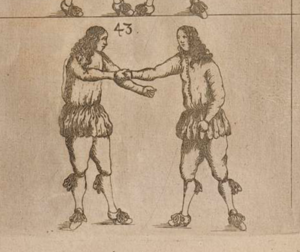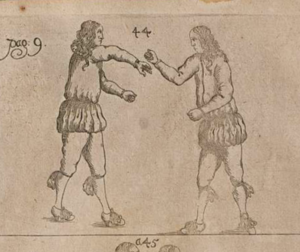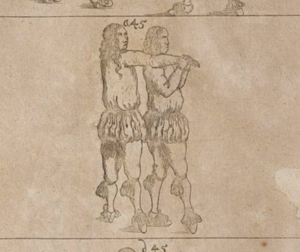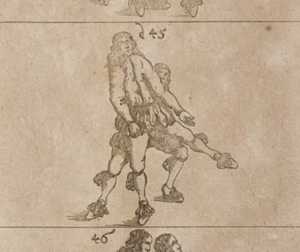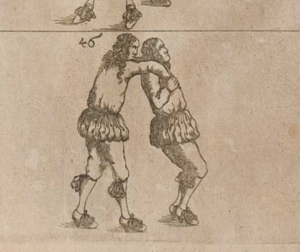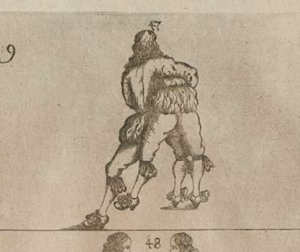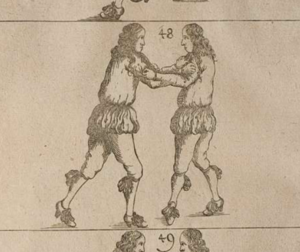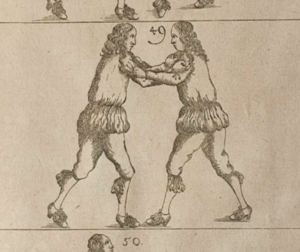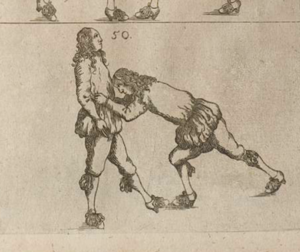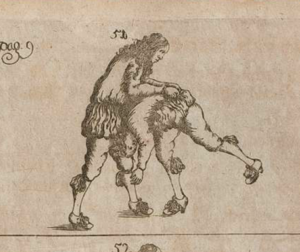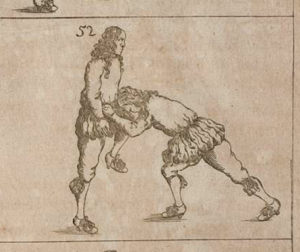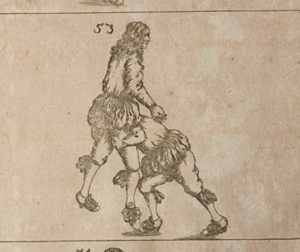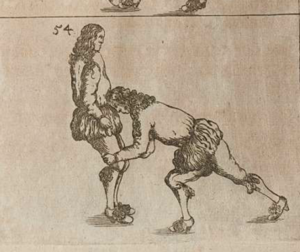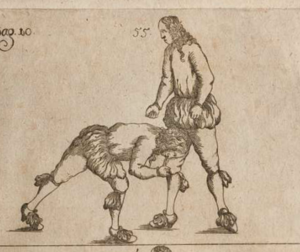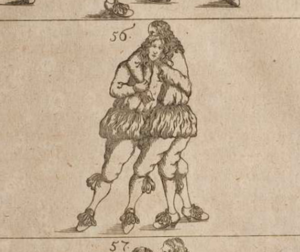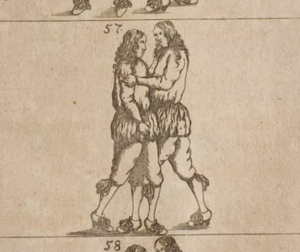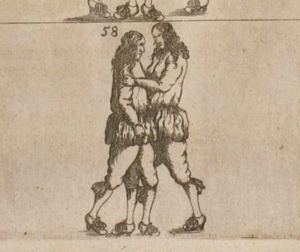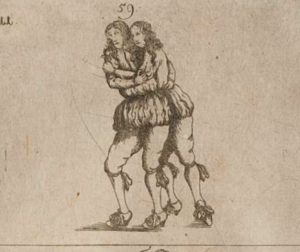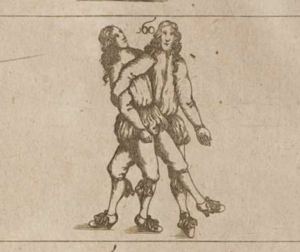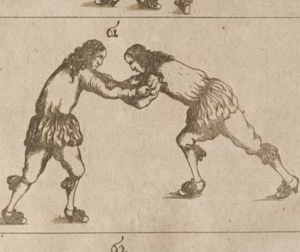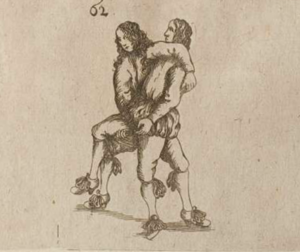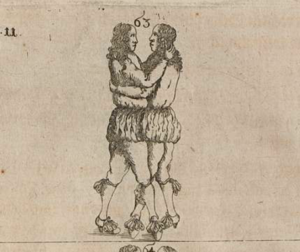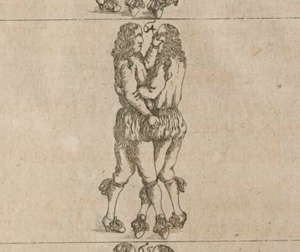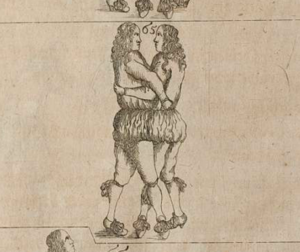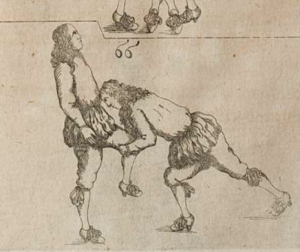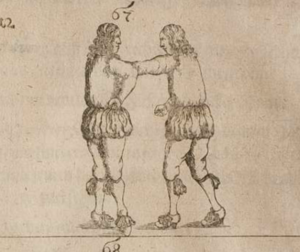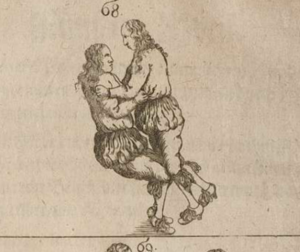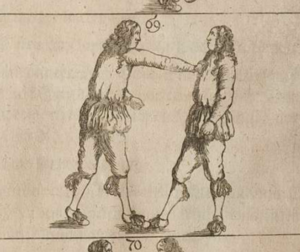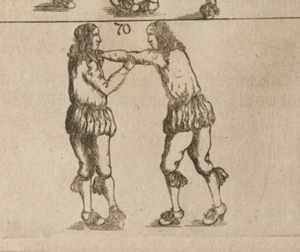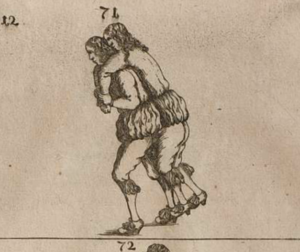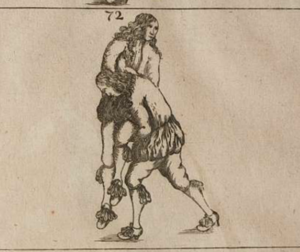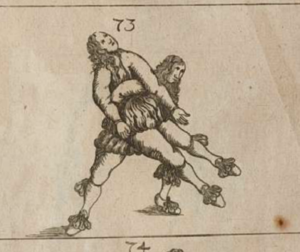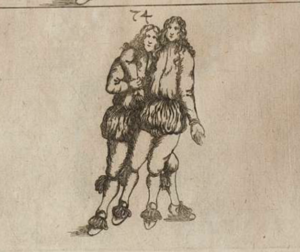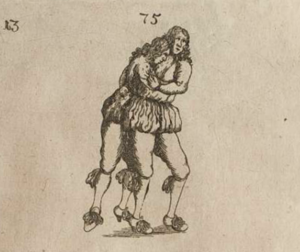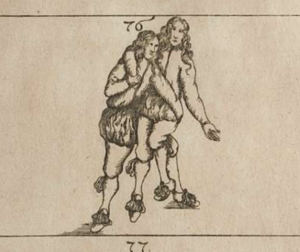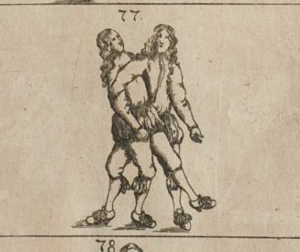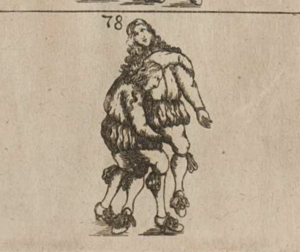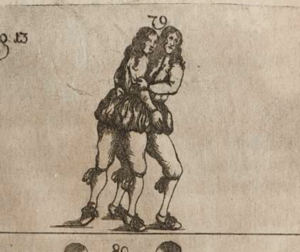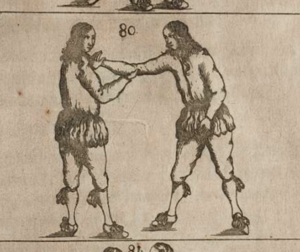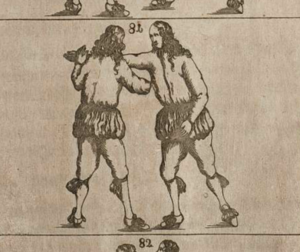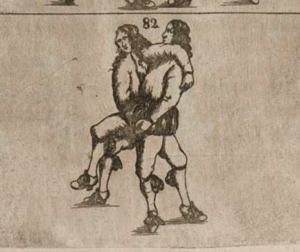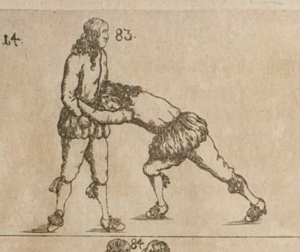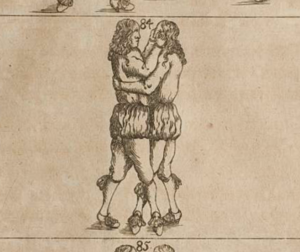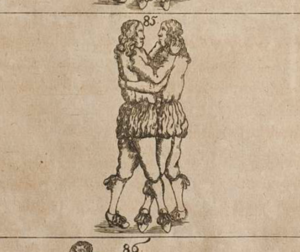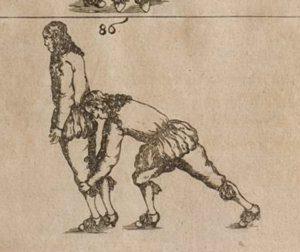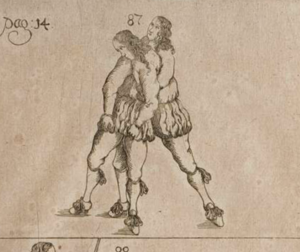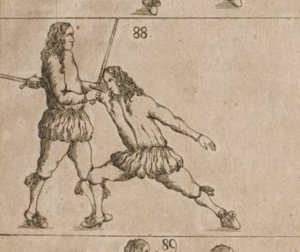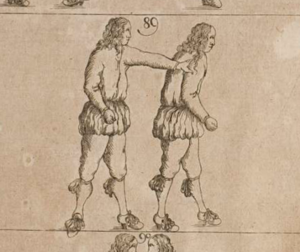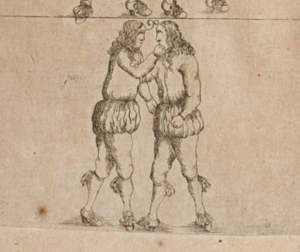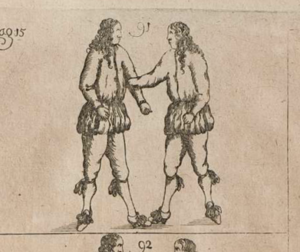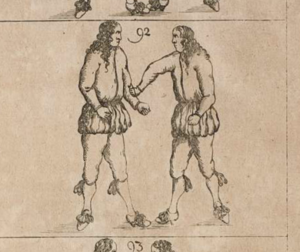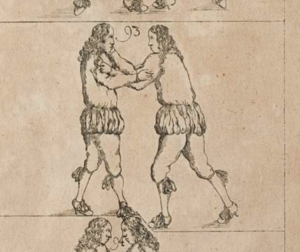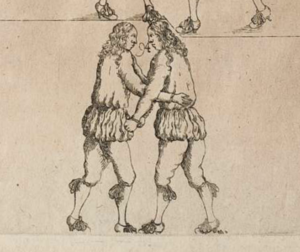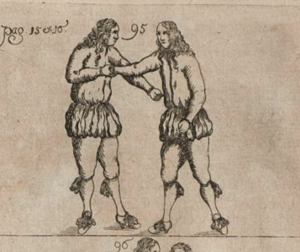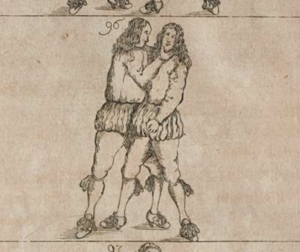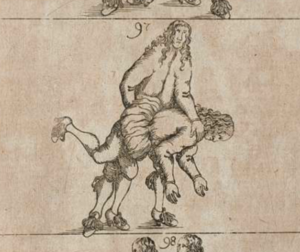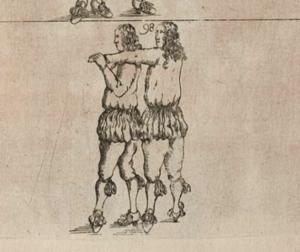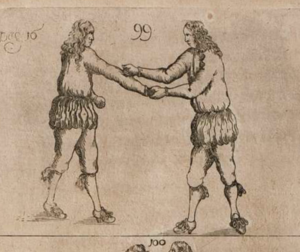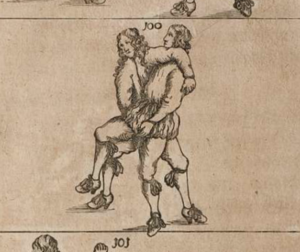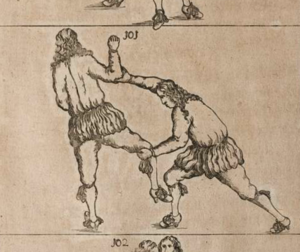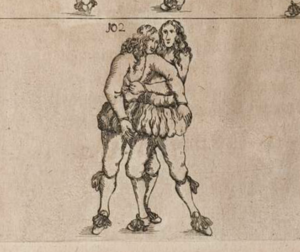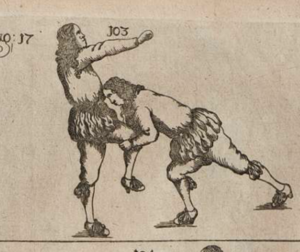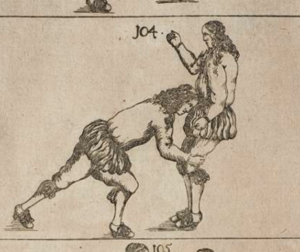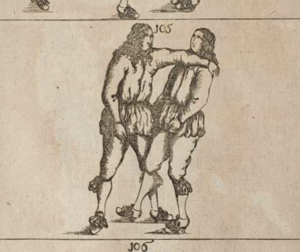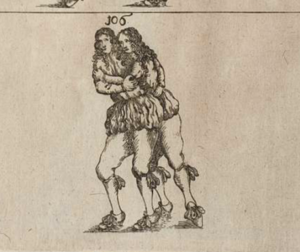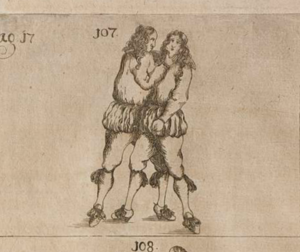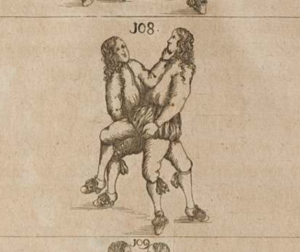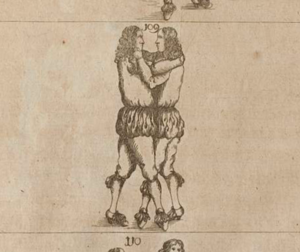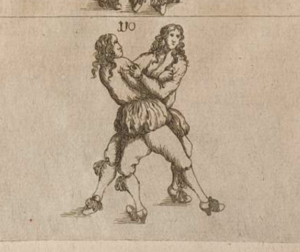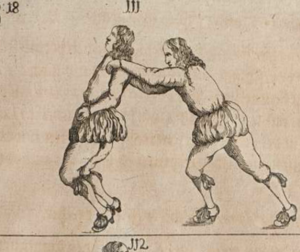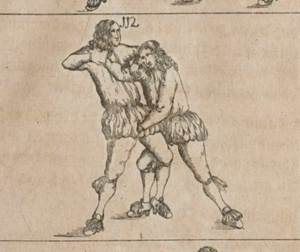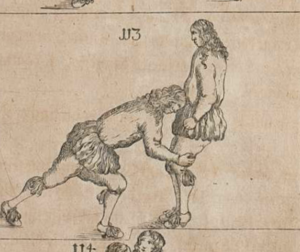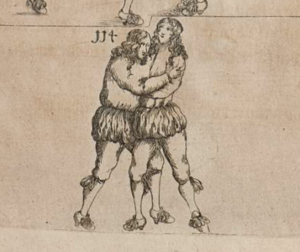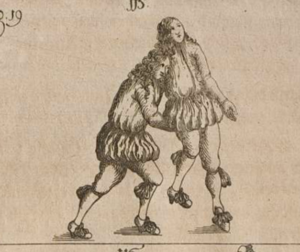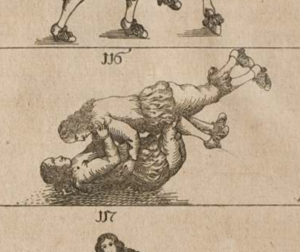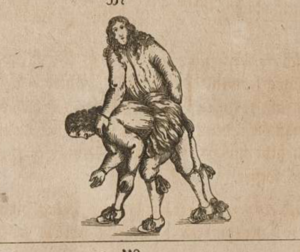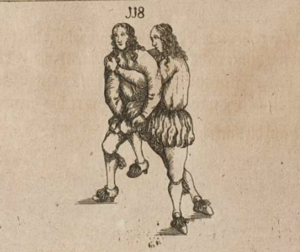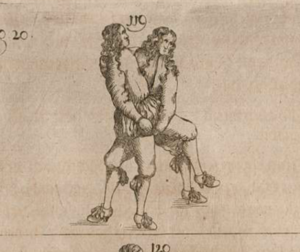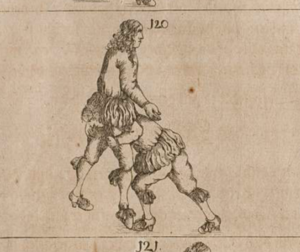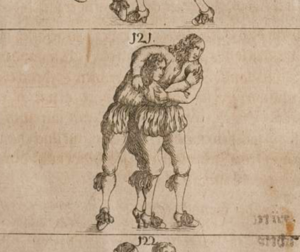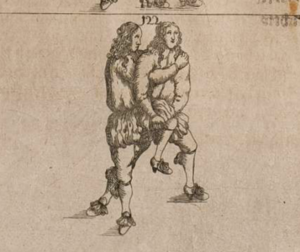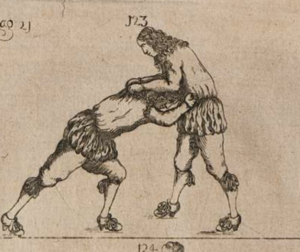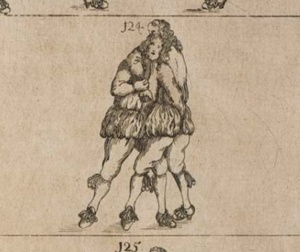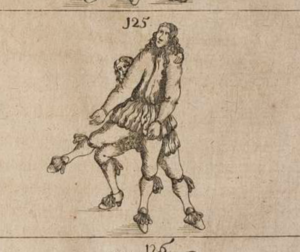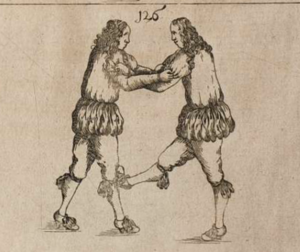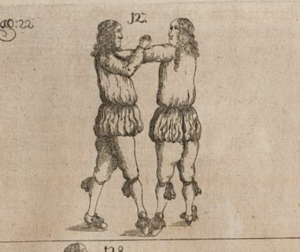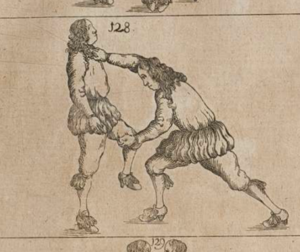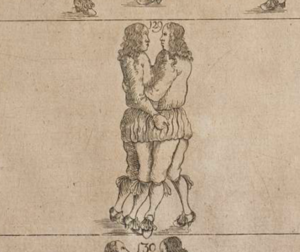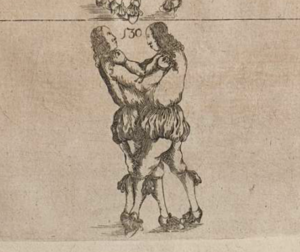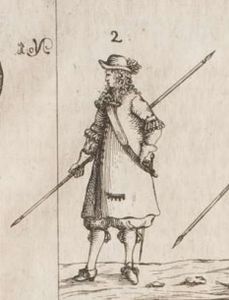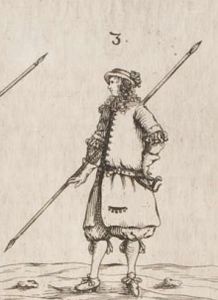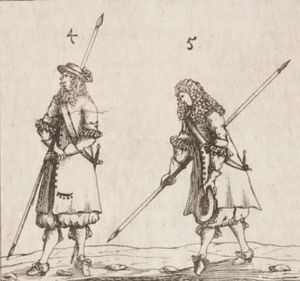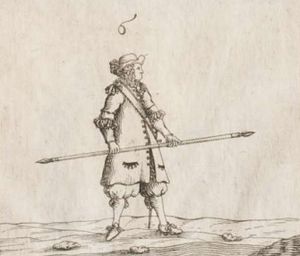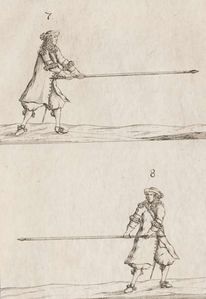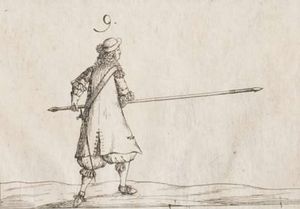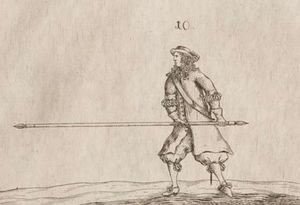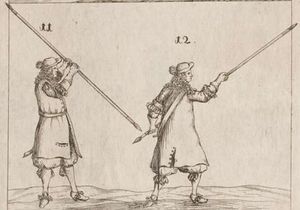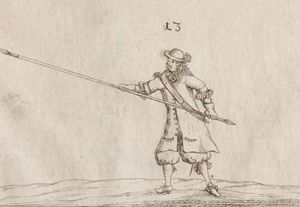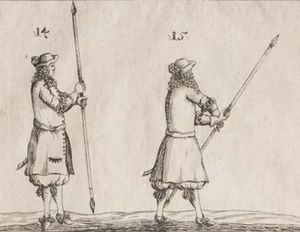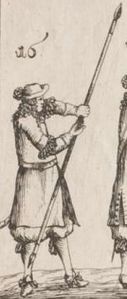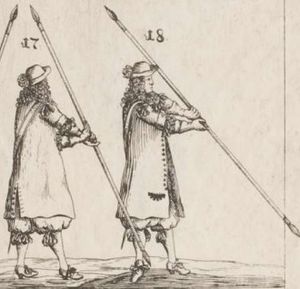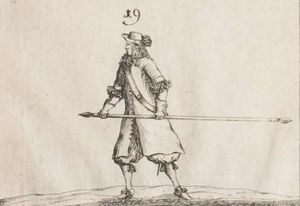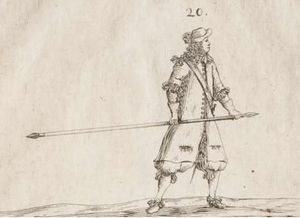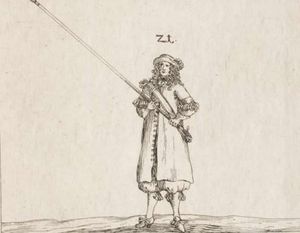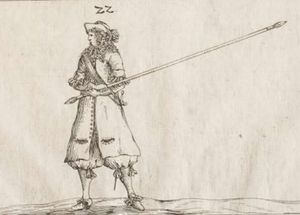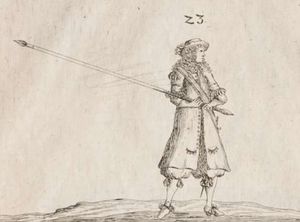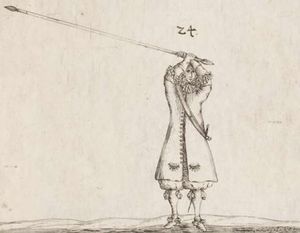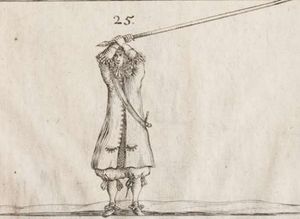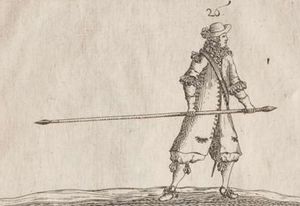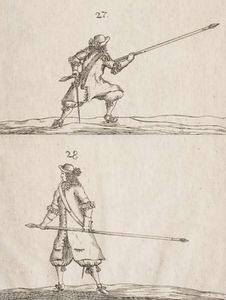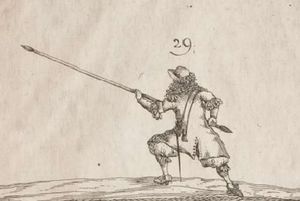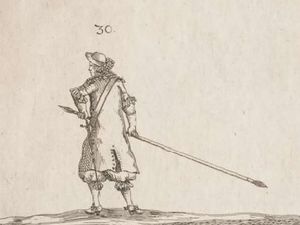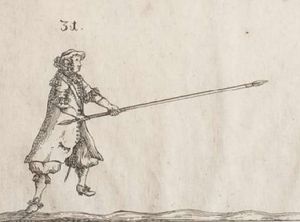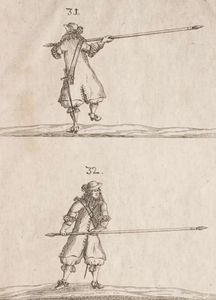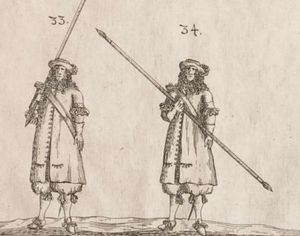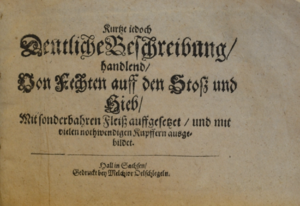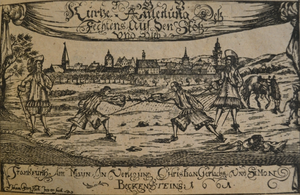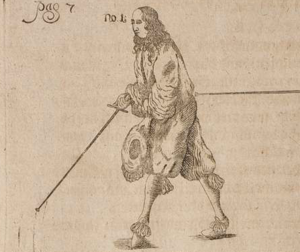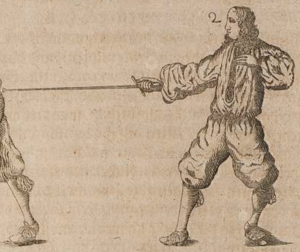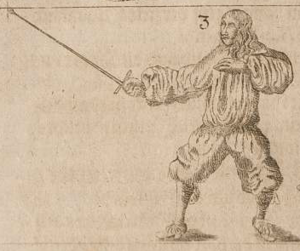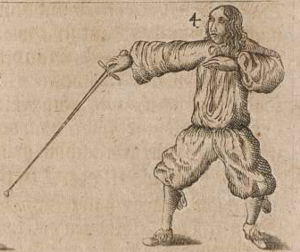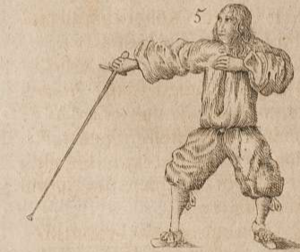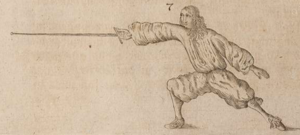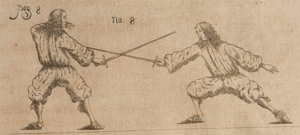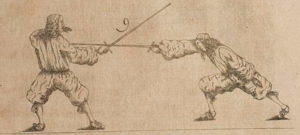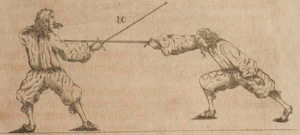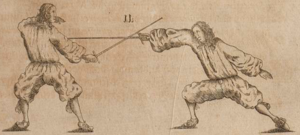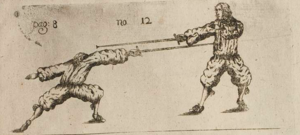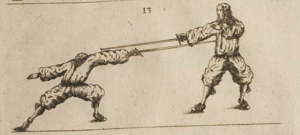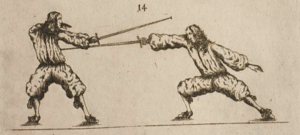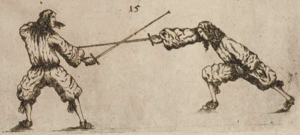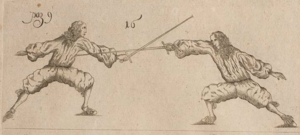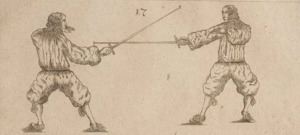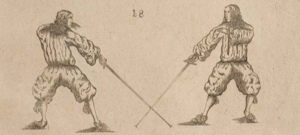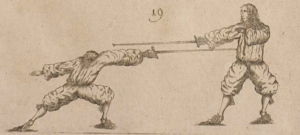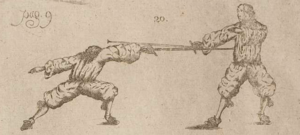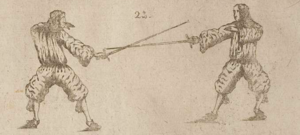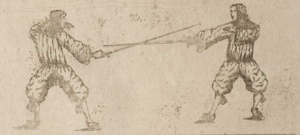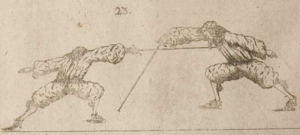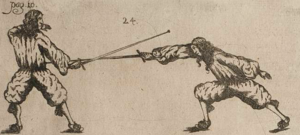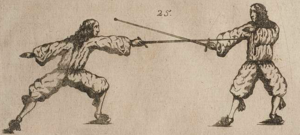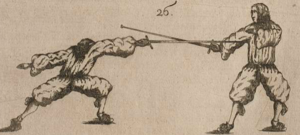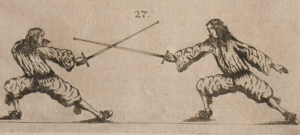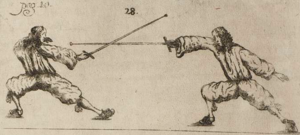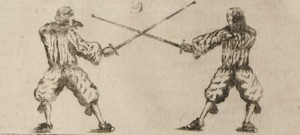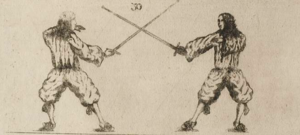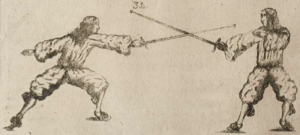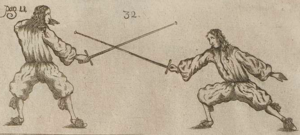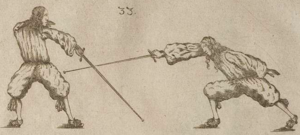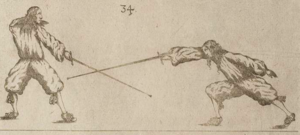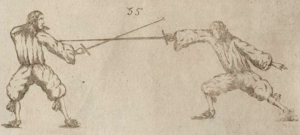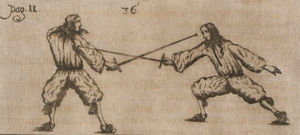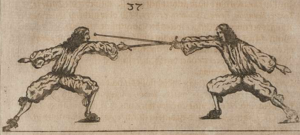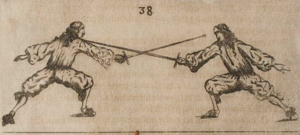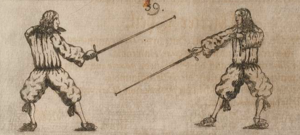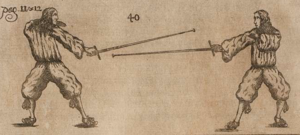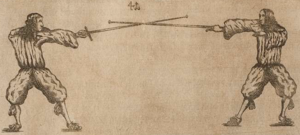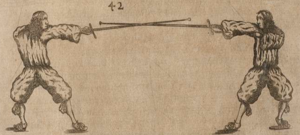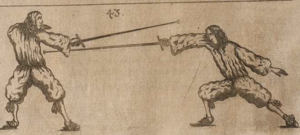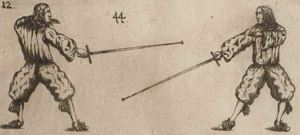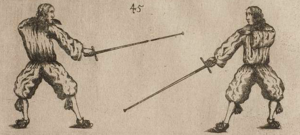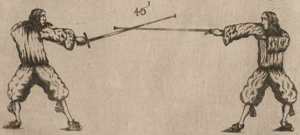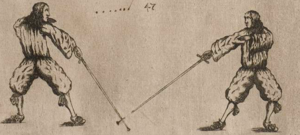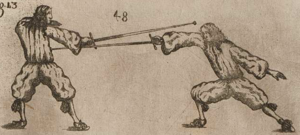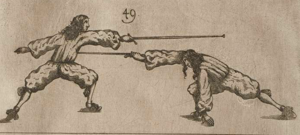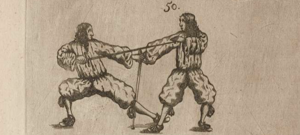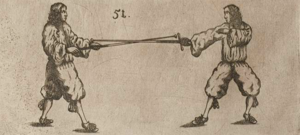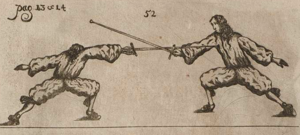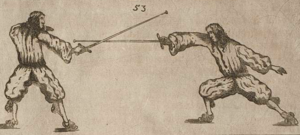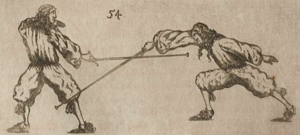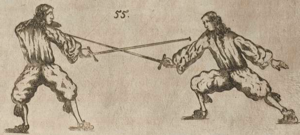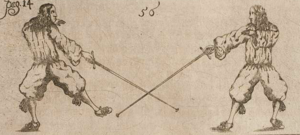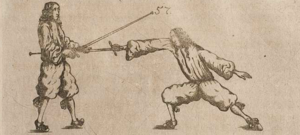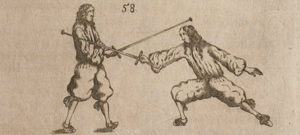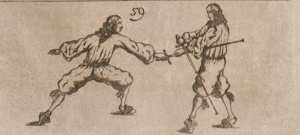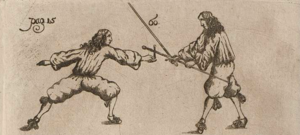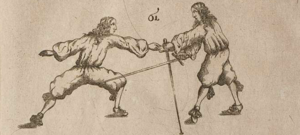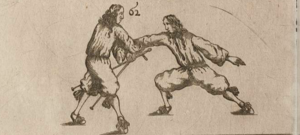|
|
You are not currently logged in. Are you accessing the unsecure (http) portal? Click here to switch to the secure portal. |
Difference between revisions of "Johann Georg Pascha"
(→Treatise: rapier fifth part) |
|||
| Line 1,317: | Line 1,317: | ||
|- | |- | ||
| [[File:Pascha Jager Number 1.jpg|300x300px|center]] | | [[File:Pascha Jager Number 1.jpg|300x300px|center]] | ||
| − | |The stick with two points, hunting stick, half pike, or the springing-stick; each name means the same. About the stick itself, it is a strong stick approximately four fingers thick and four half cubits long, or so long as a man can reach, which you will need. Both ends have points with edges, as No. 1 shows, whereby with which one in the event of need can defend against 10, 20 and 30 men with bare swords. This seems, no doubt, quite impossible, however, for one who knows this science it must become acknowledged, but such must only occur out of necessity. When one goes in a house away from many who have bared swords ready to kill him, and he fears that the house will become stormed so that he had better drive himself through and retreat on in to a protected place, if he waits and they come into the house, then he could not use the stick in the narrows at all; However, when he becomes attacked by many with swords in a more open alley, so he can equally hold off and in the open place long defend himself against the people that come there. How then to do this in this Exercise are such lessons that a man can defend himself against 20 or 30 over an half-quarter hour in one place where there is space. But that must all take place out of necessity, and it is not advised! This he performs wantonly in danger, as with other Exercises such as fencing, wrestling, and the like, which should only become applied out of necessity and for defense. | + | |The stick with two points, hunting stick, half pike, or the springing-stick; each name means the same. About the stick itself, it is a strong stick approximately four fingers thick and four and a half cubits long, or so long as a man can reach, which you will need. Both ends have points with edges, as No. 1 shows, whereby with which one in the event of need can defend against 10, 20 and 30 men with bare swords. This seems, no doubt, quite impossible, however, for one who knows this science it must become acknowledged, but such must only occur out of necessity. When one goes in a house away from many who have bared swords ready to kill him, and he fears that the house will become stormed so that he had better drive himself through and retreat on in to a protected place, if he waits and they come into the house, then he could not use the stick in the narrows at all; However, when he becomes attacked by many with swords in a more open alley, so he can equally hold off and in the open place long defend himself against the people that come there. How then to do this in this Exercise are such lessons that a man can defend himself against 20 or 30 over an half-quarter hour in one place where there is space. But that must all take place out of necessity, and it is not advised! This he performs wantonly in danger, as with other Exercises such as fencing, wrestling, and the like, which should only become applied out of necessity and for defense. |
|Der Baston A Deux bous, Jaegerstock/ halbe Pique/ oder der Springe-Stock/ wie selbigen etzliche nennen/ an sich selber nun/ ist ein starcker Stock ohngesehr 4. Finger dicke und 4 tehalbe Ellen lang/ oder so lang als ein Mensch reichen kan/ welcher ihn brauchen wil/ Auff beyden Enden Spitzen mit Schneiden/ wie No.1. weiset/ wordurch man sich imfall der Noth gegen 10. 20. und 30. Mann welche blosse Degen haben/ wehren kan. Es scheinet zwar fast unmuglich zuseyn/ wer aber desselben Wissenschafft hat/ wird es bekrafftigen mussen/ doch muss solches nur geschehen im Nothfall. Wann einer etwan in einem Hause von vielen mit blossen Degen umbringet/ und sich befurchten muste/ das das Hauss gesturmet wurde/ so that er besser/ er schluge sich durch/ und reterirte sich an einen sich ern Ort/ als dass er wartete/ biss sie ins Hauss kamen/ und er als dann den Stock in der Enge nicht gebrauchen konte; Oder/ wann Er auf offener Gassen von vielen mit Degen attaqviret wurde/ so kan er sich ebenfalss aufhalten/ und auf den raumen-Platze so lange wehren/ biss Leute darzukommen/ wie denn in diesen Exercitio dergleichen Lectiones seyn/ dass man sich uber eine halbe Biertelstunde auff einer Stelle/ wo Raum ist/ gegen 20. oder 30. wehren kan/ dass muss aber alles im Nothfall geschehen/ dann keinen zu rathen! Dass er sich muthwillig in Gefahr gebe/ wie dann auch andere Exercitia als Fechten/ Ringen/ und dergleichen in der Noth und zur Defension nur sollen gebrauchet werden. | |Der Baston A Deux bous, Jaegerstock/ halbe Pique/ oder der Springe-Stock/ wie selbigen etzliche nennen/ an sich selber nun/ ist ein starcker Stock ohngesehr 4. Finger dicke und 4 tehalbe Ellen lang/ oder so lang als ein Mensch reichen kan/ welcher ihn brauchen wil/ Auff beyden Enden Spitzen mit Schneiden/ wie No.1. weiset/ wordurch man sich imfall der Noth gegen 10. 20. und 30. Mann welche blosse Degen haben/ wehren kan. Es scheinet zwar fast unmuglich zuseyn/ wer aber desselben Wissenschafft hat/ wird es bekrafftigen mussen/ doch muss solches nur geschehen im Nothfall. Wann einer etwan in einem Hause von vielen mit blossen Degen umbringet/ und sich befurchten muste/ das das Hauss gesturmet wurde/ so that er besser/ er schluge sich durch/ und reterirte sich an einen sich ern Ort/ als dass er wartete/ biss sie ins Hauss kamen/ und er als dann den Stock in der Enge nicht gebrauchen konte; Oder/ wann Er auf offener Gassen von vielen mit Degen attaqviret wurde/ so kan er sich ebenfalss aufhalten/ und auf den raumen-Platze so lange wehren/ biss Leute darzukommen/ wie denn in diesen Exercitio dergleichen Lectiones seyn/ dass man sich uber eine halbe Biertelstunde auff einer Stelle/ wo Raum ist/ gegen 20. oder 30. wehren kan/ dass muss aber alles im Nothfall geschehen/ dann keinen zu rathen! Dass er sich muthwillig in Gefahr gebe/ wie dann auch andere Exercitia als Fechten/ Ringen/ und dergleichen in der Noth und zur Defension nur sollen gebrauchet werden. | ||
Revision as of 13:52, 17 June 2016
| Johann Georg Pascha | |
|---|---|
 | |
| Born | 9 September 1628 Dresden, Germany |
| Died | 4 September 1678 Magdeburg, Germany |
| Spouse(s) | Annen Margarethen |
| Relative(s) |
|
| Occupation | Fencing master |
| Genres | |
| Language | New High German |
| Notable work(s) | See below |
| Manuscript(s) | MS Dresd.C.13 (1671) |
| Translations | |
Johann Georg Pascha (Pasch, Pasche, Paschen, Passchen; 1628-1678) was a 17th century German fencing master and one of the most prolific authors on fencing of his time. He wrote at least fourteen books on military subjects including grappling, fencing with the pike, rapier, staff, and spear, musketry, cutting, and various gymnastic exercises.
The following is a list of Pascha's known works:[1]
- Kurze Unterrichtung belangend die pique die Fahne, den Jägerstock, Das Voltesiren, das Ringen, das Fechten auf den Stoss und Hieb, und endlich das Trincieren verferrigts (1657)
- Kurtze doch Gründliche Unterrichtung den Pique, den Trillens in der Pique, die Fahne, des Jägerstocks, Trincieren, Fechtens auf den Stoss und auf den Hieb (1659)
- Kurtze iedoch deutliche Beschreibung Des Pique-Spielens/ wie auch Des Trillens auf der Pique (1660)
- Kurtze Anleitung des Jägerstocks oder Halbe Pique (1660)
- Kurtze iedoch gründliche Beschreibung des Voltiger (1660)
- Kurze, jedoch deutliche Beschreibung handelnd vom Fechten auf den Stoss und Hieb (1661)
- 84 Fahnen Lectiones, wie selbige zierlich geschwungen, nebst denen Tritten, wie niet derselben zu jedweder Lection gemacht werden müssen (1661)
- Vollständiges Ring-Buch, darinnen angewiesen wird wie man adversarium recht sol angreiffen sich loss machen die Schläge pariren, unterschiedene Lectiones und die ContraLectiones darauff machen (1663)
- Vollständiges Fecht- Ring- ûnd Voltigier-Bũch (1666)
- Deutliche Beschreibung, Von dem Exerciren in der Mußquet In drey Theil abgetheilet (1666)
- Deutliche Beschreibung von dem Exerciren in der Musquet und Pique, wie auch von dem Baston a deux Bous, Jägerstock (1667)
- Kurtze Anleitung wie der Baston à deux bous, Jägerstock, oder halbe Pique oder Springestock wie ihn etliche nennen (1669)
- Deutliche Beschreibung von dem Exerciren in der Musquete und Pique in vier Theil abgetheilet -Déclaration ponctuelle de l'exercice du mousquet et de la pique (1672)
- Deutliche Beschreibung Unterschiedener Fahnen-Lectionen : In Acht Spiel eingetheilet/ Nebst dem Piquen-Spiel/ Pertuisan und halben Piquen/ oder Jägerstock (1673)
- Le Parfait Capitaine d'Infanterie (1687)
Contents
Treatise
The text here is transcribed and translated from the 1663 edition, but has been augmented in a few places by additional text from the 1666/1673 edition; the images all come from the 1673 (save for the 1663 title pages).
Images |
Transcription (1663) | |
|---|---|---|
| THE COMPLETE WRESTLING BOOK WHERE IS SHOWN HOW TO ATTACK AN OPPONENT, BREAK FREE OF HOLDS, PARRYING STRIKES, SEPARATING LESSONS AND THE APPROPRIATE COUNTER-LESSONS, WRITTEN WITH DILIGENCE AND ILLUSTRATED WITH THE NUMEROUS NECESSARY PLATES. | VOLLSTANDINGES RING-BUCH / DARINNEN ANGEWIESEN WIRD / WIE MAN ADVERSARIUM RECHT SOL ANGREIFFEN / SICH LOΒ MACHEN DIE SCHLÄGE PARIREN, UNTERSCHIEDENE LECTIONES UND DIE CONTRA-LECTIONES DARAUFF MACHEN / MIS FLEIΒ BESCHRIEBEN UND MIT VIELEN NOTHWENDIGEN KUPFFERN A UΒGEBILDET | |
| Edited by Philip Fuhrmanns, bookseller in Leipzig, then in Halle by Melchior Oelschlegeln in year 1663 | In verlegung Philipp Fuhrmanns / Buchhändlers in Leipzig/ gebrucht zu Hall ven Melchior Oelschlegeln im Jahr 1663 | |
| To the favourable reader:
Wrestling used to be a useful exercise, that our ancestors practiced not only for recreation, but also in earnest. This is well known history, because it is not only a gift for the whole body, but it allows a weaker man who knows this science and is dedicated to its practice to protect himself from a stronger, and even resist him. As high-esteemed as it was by our forefathers, it is now forgotten, so that in our time it is neglected and forsaken. Nowadays, everybody relies the same way on their size and strength, which is a mistake (when confronted with a smaller man trained in wrestling). Because it is almost lost, I want to defend its cause, and bring it to light with this print and coppers. No doubt its enthusiasts will willingly and joyfully accept this little work of mine, which I put under God’s protection, in his grace. |
An den günstigen Leser.
Was das Ringen vor ein nützliches Exercitium und wie es unsere Vorfahren nicht allein in Schertz/sondern auch in Ernst gebrauchet haben/Solches ist auβ denen historien gnugsam bekant/denn es machet nicht allein des Menschen gantzen aus Leib geschickt/ sondern es kan auch ein schwacher Mensch/ welcher dessen wissenschaft hat/ und darinnen wolgeübt/ sich gegen einem stärckern beschützen und also demselben widerstand thun/ wie hoch es nun bei denen Vorfahren/ wie gedacht / gehalten worden/ so gering wird es zu Unsern zeiten geachtet und verlasset sich heutiges tages ein ieder auff seine grösse und stärcke/ da er doch hierinnen (wenn ein kleiner in Ringen geübter mit ihm zu thun hat) gar sehr fehlet/ und weil es nun fast erloschen/ habe ich dahero Ursach nehmen wollen/ solches durch dessen Druck und Kupffer in etwas ans Licht zu bringen/ zweifele nicht/ es werde der Liebhaber desselben / solches geringe Wercklein von mirwillig und gerne annehmen / welchen ich in den Schutz GOTTES / mich aber in seine Gewogenheit befehle. Ringen/ | |
| FIRST PART
1 – First, it is necessary to know that a man’s arm is divided in three parts: the strong, the halfstrong and the weak. [Image 1'] |
ERSTER THEIL.
1 – Zum Ersten ist zu wissen nöthig/ daβ des Menschen Arm in drei Theil getheilet warden/ in die Stärcke/ halbe Stärcke und Schwäche. | |
| 2 – That the head is two parts, the strong and the weak.The top of the head [A] is the weak, whereas below [B] is the strong. | 2 – Daβ der Kopff in zwei Theil / in die Schwäche und Stärcke/ oben am Kopffe ist die Schwäcke unten aber die Stärcke. | |
| 3 – That the body and the feet are divided in three parts : the strong [C], the half-strong [D], and the weak [E]. | 3 – Daβ der Leib und Füsse in drei theil getheilet werden / in die stärcke/ halbe stärcke und schwäche. | |
| 4 – When you break free from a hold, you must come with your half-strong to the weak of the opponent’s arm. | 4 – Wenn du dich loβ machest/ so mustu mehrentheils mit deiner halben stärcke in Adversarii schwäche deβ Armes kommen. | |
| 5 – When the opponent grabs your right arm, then free yourself from outside as N.1 shows. | 5 – Wenn dich Adversarius am rechten Arm angreifft/ so mache dich auβwendig loβ/ wie N.1. zeiget. | |
| 6 – When the opponent grabs your left arm, then free yourself from outside. [Image 3'] | 6 – Wenn dich Adversarius am lincken Arm angreifft/ so mache dich auβwendig loβ. | |
| 7 – When the opponent grabs your right arm, then free yourself from inside. | 7 – Wenn dich Adversarius am rechten Arm angreifft/ so mache dich inwendig loβ. | |
| 8 – When the opponent grabs your left arm, then free yourself from inside. | 8 – Wenn dich Adversarius am lincken Arm angreifft/ so mache dich inwendig loβ. | |
| 9 – When the opponent grabs your right arm, then strike hard on his arm-joint as shown in N.2. | 9 – Wenn dich Advers. Am rechten angreifft/ Arm so schlage Advers. Stärck in sein Armgelencke wie N.2 zuersehen. | |
| 10 – Do the same when the opponent grabs your left arm. | 10 – Eben so mache wenn dich Advers. Am lincken Arm angreifft. | |
| 11 – When the opponent grasps the strong of your left arm with his right hand, then grab with both hands over his weak and turn downward as shown in N.3. | 11 – Wenn dich Adversarius mit seiner rechten Hand in die stärcke deines lincken Arms Fast/ so greiffe mit beiden Händen über seine schwäche/ und trüde nieder/ wie N. 3 zuersehen. | |
| 12 – Do the same when he grasps the strong of your right arm with his left hand. | 12 – Mache es eben so/ wenn er mit seiner lincken Hand in die stärcke deines Rechten Arms fasset. | |
| 13 – When the opponent grabs both your arms, free yourself from outside as N.4 shows. | 13 – Wenn dich Advers. In deine beide Arm greifft/ so mache dich ausswendigloss/ wie N.4 weiset. | |
| 14 – When the opponent grabs both your arms, free yourself from inside. | 14 – Wenn dich Adversarius in deine beide Arm greifft/ so mache dich inwendig loβ. | |
| 15 – When the opponent grabs both your arms, strike with both your hands in his arm-joints. [Image 7'] | 15 – Wenn dich Adversarius in deine beiden Armen greiffe/ so Schlage ihm mit beiden Händen in sein Arm-gelencke. | |
| 16 – When you can come with your fingers between the opponent’s fingers, press his hands back so that he has to fall on his knees, or twist his fingers outwards, so that they dislocate. [Image 8'] | 16- Wenn du mit deinem Fingern zwischen Advers. Finger kommen kanst/ so drücke ihm seine Hände zurücke/ alsdenn muβ er sich auff die Knie setzen/ oder drehe ihn seine Finger ausswertd so werden sie sich verrencken. | |
| 17 – When the opponent wants to throw a stein, or something else, on you, then attack him with your arms crossed, so that your head is covered, as N.5 shows. | 17- Wenn dich Adversarius mit einer Kann oder sonsten werffen wil / so gehe ihm mit den Armen Kreuβweiβ an/ damit dein Kopff bedecked ist/ wie N. 5 zeiget. | |
| 18 – When the opponent grabs you crosswise, free yourself from outside as N.6 shows. | 18 – Wenn dich Adv. Kreuβweiβ angreifft/ so mache dich ausswending loβ wie N. 6 weiset. | |
| 19 – When the opponent grabs you crosswise, free yourself from inside. | 19 – Wenn dich Adv. Kreuβweiβ angreifft/ somache dich inwendig loβ. | |
| 20 – When the opponent grabs the strong of your arm with both his hands, then put your right hand on your right side, and shove his hands away with your right elbow as shown in N.7. | 20 – Wenn dich Adv. Mit beiden Händen in die Stercke deiner Arm greifft / so setze deine Rechte Hand in deine Rechte Seite / und stosse mit deinem R. Ellenbogen seine hände weg/ wie N. 7 zuersehen. | |
| 21 – Likewise, shove his hands away with your left elbow. | 21 – Eben so stosse mit deinem lincken Ellenbogen seine Hände weg. | |
| 22 – Or, when the opponent has grasped you in this way, then strike with your right arm over both his arms, so that he has to let go, as shown in N.8. | 22 – Oder wenn dich Adv. Also gefasset hat/ so schlage mit deinem R. Arm über seine beide Arme so muβ er loβ lassen/ wie N. 8 zuersehen. | |
| 23 – Or with your left arm over both his arms. | 23 – Oder mit deinem lincken Arm über seine beide Arme. | |
| 24 – When the opponent has grasped the weak of your right hand, free yourself from outside. [Image 13'] | 24 – Wenn dich Adv. An der R. Hand in die Schwäche gefasset hat so mache dich auβwendig loβ. | |
| 25 – Also from inside. | 25 – Also auch inwendig. | |
| 26 – When the opponent has grasped the weak of your left hand, free yourself from outside. [Image 14'] | 26 – Wenn dich Adv. An deiner Lincken Hand an die Schwäche gefasset hat/ so mach dich auβwendig loβ/ | |
| 27 – Also from inside. | 27 – Also auch innwendig/ | |
| 28 – When the opponent has grasped the weak of both your hands, free yourself from outside with both your hands. [Image 15'] | 28 – Wenn dich Adv. An beiden Händen in die Schwäche fasset/ so mache dich mit beiden Händen auβwendig loβ. | |
| 29 – Also from inside. | 29 – Also auch innwendig. | |
| SECOND PART
1 – When the opponent grabs your right side, free yourself from outside, as N.9 shows. |
ANDER THEIL.
1 – Wenn dich Adv. In die Rechte Seite greifft/so mach dich auβwendig loβ/ wie N.9 zeiget. | |
| 2 – Also from inside. | 2 – Also auch innwendig. | |
| 3 – When the opponent grabs your left side, free yourself from outside. [Image 17'] | 3 – Wenn dich Adv. In die lincke Seite greifft/ so mache dich auβwendig loβ/ | |
| 4 – Also from inside. | 4 – Also auch innwendig. | |
| 5 – When the opponent grabs both your sides with both his hands, free yourself with both hands from inside. [Image 18'] | 5 – Wenn dich Adv. Mit beiden Händen in deine beide Seiten greifft/ so mache dich mit beiden Händen innwendig loβ. | |
| 6 – When the opponent grabs your sides with both his hands, free yourself from outside with your right hand in the opponent’s weaks. [Image 19'] | 6 – Wenn dich Adv. Mit beiden Händen in deine Seiten greifft/ so mache dich mit Rechter Hand auβwendig loβ in Adversarii Schwäche/ | |
| 7 – Also from outside with your left hand. | 7 – Also auch mit lincker Hand auβwendig. | |
| 8 – When the opponent grasps your left side with his right hand only, strike in his right arm-joint with your left hand, as shown in N.10. | 8 – Wenn Adv. Mit der Rechten Hand alleine in deine lincke Seiten fast/ so schlage ihn mit der lincken Hand in sein Recht Arm-Gelencke/ wie N.10 zuersehen. | |
| 9 – When the opponent grasps your right side with his left hand only, strike in his left arm-joint with your right hand. | 9 – Wenn Adv. Mit der lincken Hand allein in deine R. seiten fast/ so schlage ihn mit rechter Hand in sein linck Arm-Gelencke. | |
| 10 – When the opponent grasps both your sides with both his hands, then strike both his arm-joints with both your hands. [Image 21'] | 10 – Wenn Adv. Mit beiden Händen dich in deine beide Seiten fast/ so schlage mit beiden Händen in des adversarii beide Arm-Gelencke. | |
| 11 – When the opponent grasps your right side with his left hand, then strike his left elbow with your right hand as N.11 shows. | 11 – Wenn dich Adversarius mit der lincken Hand an deine Rechte Seite fast/ so schlage mit Rechter Hand an seinen lincken Ellebogen/ wie N.11 weiset. | |
| 12 – Do the same on the other hands. | 12 – Eben so mache es auff der andern Hand. | |
| 13 – When the opponent grabs both your sides with both his hands, strike his left elbow with your right hand. [Image 23'] | 13 – Wenn dich Adv. Mit beiden Händen in beide Seiten greifft / so schlage mit der R. Hand an des Adversarii L. Ellebogen/ | |
| 14 – The same goes for the opponent’s right elbow with your left hand. | 14 – Eben so gehet es mit der lincken Hand an Adversarii R. Ellebogen. | |
| 15 – Or strike his weaks from inside with both your hands. [Image 24'] | 15 – Oder schlage ihn mit beiden Händen innwendig in seine Schwäche/ | |
| 16 – When the opponent has grasped your neck with his right hand, free yourself from outside with your right hand as N.12 shows. | 16 – Wenn dich adv. Mit der Rechten Hand am Halse gefasset hat / so mache dich mit rechter Hand auβwendig loβ/ wie N 12 weiset/ | |
| 17 – Also from inside, with your right hand. | 17 – Also auch mit der Rechten innwendig. | |
| 18 – When the opponent has grasped your neck with his left hand, then free yourself from outside with your left hand. [Image 26'] | 18 – Wenn dich Adv. Mit der L. Hand am Halse gefasset hat so mache dich auβwendig mit L. Hand loβ/ | |
| 19 – Also from inside, with your left hand. | 19 – Also mit L Hand innwendig. | |
| 20 – When the opponent has grasped your neck with both his hands, then free yourself from outside with both hands, as N.13 shows. | 20 – Wenn dich Adv. Mit beiden Händen am Halβ gefasset hat/ so mache dich mit beiden Händen auβwendig loβ / wie N. 13 weiset/ | |
| 21 – Also from inside. | 21 – Also auch innwendig. | |
| 22 – When the opponent has grasped your neck with his right hand, then put your left hand on your side and shove his right arm away with your left elbow, and free yourself. [Image 28'] | 22 – Wenn dich Adv. mit der Rechten Hand am Halse gefasset hat / so setze deine lincke Hand in die Seite / und stosse mit deinen lincken Ellebogen an seinen R. arm/ und mache dich loβ. | |
| 23 – The same goes with your right elbow, when the opponent has grasped your neck with his left hand. | 23 – Eben so gehet es mit deinen Rechten Ellebogen / wenn Adv. dich mit Lincker Hand am Halse gefasset. | |
| 24 – When the opponent grasps with both his hands the front of your doublet, go with both your elbows between his arms, at the weak, and free yourself as is shown in N.14. | 24 – Wenn dich Adv. mit beiden Händen vorn ins Wambs fasset/ so fahre mit deinen beiden Ellebogen zwichen seine Arme in die Schwäche und mache dich loβ. Wie N 14 zuersehen. | |
| 25 – Make the parries with the right and left arm below and above. | 25 – Mache die paraden mit Rechten und lincken Arm unten und oben. | |
| [1666: Make the Parade with the right arm high, as in N° 30.
The same with the left arm high.] |
||
| [1666: Make the Parade with the right arm low, as in N° 31.
The same with the left arm low.] |
||
| 26 – Strike with the edge of the palm of your hand to the nose, the jaw or the throat. [Image 32'] | 26 – Schlage mit der Schneide deiner flachen Hand auff die Nase Maul oder Gurgel. | |
| 27 – Pull back the opponent’s head by his hair with your right hand, and strike his chin from below with a closed fist. [Image 33'] | 27 – Ziehe Adv. oben mit Rechter Hand bei seinen Haaren zurück/ und schlage ihn mit geballter Faust von unten ans Kinn. | |
| 28 – When the opponent enclosed you with his arms, put your thumb inside his mouth between his teeth and his cheek, and tear his mouth off as N.15 shows. | 28 – Wenn dich Adv. umbfasset hat / so fahre Adv. mit deinem Taumen zwichen seine Zähne und Backen ins Maul und reiβ ihn das Maul auff / wie N. 15 weiset. | |
| 29 – Shove your right elbow in the opponent’s face or ribs. [Image 35'] | 29 – Stoss Adversar. Mit deinem Rechten Ellebogen ins Gesichte oder in die Ribben/ | |
| 30 – Also with the left elbow. | 30 – Also auch mit deinen lincken Ellenbogen. | |
| 31 – When the opponent wants to thrust his right elbow in your face or ribs, then parry it away on his right with your right hand, Shove him backward, put your left foot behind his foot, grab his left shoulder with your left hand, as N.16 shows, and throw him over your left leg. | 31 – Wenn dich Adv. mit seinen rechten Ellebogen ins Gesichte oder in die Ribben stossen wil/ so parire mit Rechter Hand seine Rechte weg/ stosse ihn zurücke setze deinen lincken Fuβ hinter seine Füsse/ greiff ihn mit Lincker Hand an seine Lincke achsel wie N 16 weiset / und wirff ihn über dein linck Bein/ | |
| 32 – Do likewise with your left hand when the opponent thrusts his left elbow. | 32 – Also mache es mit deiner Lincken Hand/ wenn dich Adv. mit seinen Lincken Ellebogen stösset. | |
| THIRD PART
1 – When the opponent has something in his fist, grasp his hand with both hands and pull him down strongly, so that the veins will pull up to his head.[2] [Image 36'] |
DRITTER THEIL
1 – Wenn Adv. was im Fäusten hat/ so fasse mt beiden Händen seine Hand/ und ziehe sie starck nieder / alsdenn ziehen sich die Adern biβ ins Haupt/ | |
| 2 – Grab the opponent by the throat or the collar with the right or left hand, and shove him vigorously as N.17 shows. | 2 – Greiff Advers. Mit Rechter oder Lincker Hand in seinen Kragen oder Gurgel/ und stosse wacker/ wie N. 17 zeiget. | |
| 3 – Kick the opponent’s right knee with your right foot, so that the foot must break [it]. [Image 38'] | 3 – Stosse Adv. mit deinen Rechten Füsse/ auff sein Recht Knie/ so muβ der Fuβ brechen. | |
| 4 – Also with the left foot on the left knee | 4 – Also auch den L. Fuβ auff sein L. Knie. | |
| 5 – When the opponent wants to break your foot, pull your foot backwards, grasp his foot with both hands and throw him over, as shown in N.18. | 5 – Wenn Adv. dir also den Fuβ brechen wil/ so ziehe deinen Fuβ zurück/ fasse mit beiden Händen seinen Fuβ/ und wirff ihn über/ wie N. 18 zuersehen. | |
| 6 – When the opponent grasps the front of your doublet, free yourself with your elbow, catch both his legs, put your head to the opponent’s stomach and throw him backwards. [Image 40'] | 6 – Wenn dich Adv. vorn ans Wambs fasset/ so mache dich mit deinem Ellebogen loβ/ erwische seine beide Beine/ setze darneben deinen Kopff an Adversarii Leib/ und wirff ihn hinder sich. | |
| 7- Grasp the opponent’s right hand with your right hand, turn it inwards completely and break his arm in half with your left hand as N.19 shows. | 7 – Fasse Adv. mit Rechter Hand/ seine R. Hand/ drehe sie einwerts herumb/ und schlage seinen Arm mit lincker Hand entzwei/ wie N. 19 weiset/ | |
| 8 – Also with the other hand. | 8 – Also auch mit der andern Hand. | |
| 9 – When the opponent turns your arm, free yourself by shoving your elbow into his face, go also over both arms. [Image 42'] | 9 – Wenn dir Adv. den Arm drehet so mache dich loβ stosse ihm deinen Ellebogen ins Gesicht/ gehet auch auff beide Arm an. | |
| 10 – Grasp the opponent’s right hand with your right hand, pull it to you and break his arm, as N.20 shows. | 10 – Greiff mit Rechter Hand Adv. R. Hand/ ziehe sie zu dir und zerbrich mit lincker Hand seinen Arm / wie N. 20 weiset/ | |
| 11 – Also with the other hand. | 11 – Also auch mit der andern Hand. | |
| 12 – The counter : turn your arm and free yourself or shove your elbow into the opponent’s face. [Image 44'] | 12 – Das Contra, Drehe den Arm und mache dich loβ/ oder stosse Adv. den Ellebogen ins Gesicht. | |
| 13 – Grasp the opponent’s right arm with both hand, draw it on your right shoulder and break it as shown in N.21. | 13 – Fasse Advers. Rechten Arm mit beiden Händen/ nim selbigen auff deine R. Achsel/ und zerbrich ihn wie N. 21 zuersehen. | |
| 14 – The counter : wind the arm, take the opponent’s left foot in your left hand and throw him over your right leg. [Image 45b'] | 14 – Das Contra, wende den Arm/ nimb Adv. mit Lincker Hand bei seinen Lincken Fuβ/ und wirff ihn über dein R. Bein. | |
| 15 – Grasp the opponent’s left arm with both hands, draw it to your left shoulder and break it. | 15 – Fasse Advers. Lincken Arm mit beiden Händen/ nim selbigen auff die L. Ach. Und zerbrich ihn. | |
| 16 – The counter is the same as in lesson 14. | 16 – Das vorige Contra, wie in der 14. Lection/ | |
| 17 – Or turn the arm and put your knee in the back of the opponent’s knee-joint, and pull him down backwards. [Image 66'] | 17 – Oder drehe den Arm und setze deine Knie in Adv. Kniekehlen und ziehe ihn rücklings nieder. | |
| 18 – When the opponent grasps the strong of your arm with both hands, free yourself from his left hand from outside, wind at the same time and wrap around his body under your arm with your right hand, spring with your right hip in front of his legs as shown in N.22 and throw him over. | 18 – Wenn dich Advers. Mit beiden Händen in die Stärcke der Arme greifft/ so mache seine lincke Hand auβwendig loβ/ winde zugleich/ fasse ihm mit Rechter Hand umb den Leib unter den Arm/ spring mit deiner Rechten Hüffte vor seinen Leib/ wie N. 22 weiset und würff ihm über. | |
| 19 – Likewise over the left hip. | 19 – Eben so über die Lincke Hüffte. | |
| 20 – Grab the opponent from inside, push and shove him away. [Image 48'] | 20 – Greiff Adversarium innwendig an / dringe und stoss Adv. fort. | |
| 21 – The counter : place yourself on your feet and push back. [Image 49'] | 21 – Das Contra, setze dich mit deinen Füssen und drenge gegen/ | |
| 22 – Put your head against the opponent’s stomach, as N.23 shows, and run him over and over. | 22 – Setze deinen Kopffan Adv. Leib/ wie N. 23 zuersehen und lauffe ihn über und über. | |
| 23 – The counter : Press his head down and grasp the back of his pants, so that he plunges on his head. [Image 51'] | 23 – Das Contra, drücke seinen Kopff nieder/ und fasse ihn hinten an seinen Hosen. Daβ er auff den Kopff stürtzt/ | |
| 24 – Or shove your knee into his face. [Image 52'] | 24 – Oder stosse ihn mit den Knie ins Gesicht. | |
| 25 – Put your head between the opponent’s legs, and throw him over yourself. [Image 53'] | 25 – Stecke deinen Kopff swichen Advers. Beine/ und wirff ihn über dich/ | |
| 26 – The counter : grasp the back of his pants so that he plunges on his head. [As in lesson 23, image 51'] | 26 – Das Contra, Fasse hinten an die Hosen/ daβ er auff den Kopff stürtzt/ | |
| 27 – Put your head to your opponent’s stomach, grab his knee joints with both hands, as N.24 shows, and throw him backwards. | 27 – Setze deinen Kopff an Adv. Leib/ greiff mit beiden Händen in seine Kniekehle wie N. 24. zeiget /und würff ihn hinter sich/ | |
| 28 – The counter is the same as in lesson 24. [Image 52'] | 28 – Das Contra wie in der 24. Lection/ | |
| FOURTH PART
1 – When the opponent puts his head against the body, free yourself with your right hand so that his head runs into the ground. |
VIERTER THEIL
1 – Wenn die Advers. Den Kopff an Leib setzet/ so mache dich mit deiner Rechten Hand loβ/ das ser mit seinen Kopff gegen die Erde Laufft/ | |
| 2 – Likewise with your left hand, or shove your foot into his face. | 2 – Eben so mit der lincken Hand/ oder stosse ihn mit deinen Füsse ins Gesicht/ | |
| 3 – Catch the opponent’s left hand with your right, pull it over yourself and run with your head and your body under his left arm, step with your left thigh in front of his leg, grasp with your left hand over the opponent’s back, as N.25 shows, and throw him. | 3 – Erwische Adversarii lincke Hand mit deiner Rechten/ zucke dieselbe über dich/ und lauffe mit den Kopffe und leibe unter seinen L. Arm hindurch/ tritt mit deinem Lincken Schenckel vor seinen Leib/ greiff mit deiner Lincken Hand über Adv. Rücken/ wie N.25 zuersehen/ und wirff ihn. | |
| 4 – Likewise with the other hand. | 4 – Eben so mit der Andern Hand/ | |
| 5 – Throw the opponent over your left hip, while at the same time you step with your left foot behind his left foot. | 5 – Wirff Adv. Über deine Lincke Hüffte/ indem du mit deinem L.Fuβ hinter seinen L.Fuβ tritst / | |
| 6 – Likewise over the right hip. | 6 – Eben so über die Rechte Hüffte/ | |
| 7 – Throw the opponent over your right leg, while at the same time, you step with your right foot outside his left leg, as N.26 shows. | 7 – Wirff Adv. Über dein Recht Bein / indem du mit deinen Rechten Fuβ ausserhalb sein Linck Bein tritst/ wie N.26 zuersehen/ | |
| 8 – Likewise over the left leg. | 8 – Eben so über das Lincke Bein/ | |
| 9 – When the opponent wants to throw you over the right leg, enclose him with your left hand as N.27 shows and throw him over your left hip. | 9 – Wenn dich Adv. Über sein Recht Bein werffen wil/ so umbfasse ihn mit deiner Lincken Hand/ wie R27 zeiget/ und wirff ihn über deine Lincke Hüffte. | |
| 10 – When he wants to throw you over his left leg, enclose him with your right hand and throw him over your right hip. | 10 – Wenn er dich über sein Linck Bein werffen wil / so umbfasse ihn mit deiner Rechten Hand / und wirff ihn über deine Rechte Hüffte/ | |
| 11 – When the opponent grabs the strong of your right arm with his left hand, free yourself with your right hand, stretch your right hand over his breast, spring with your right leg behind both his legs, as N.28 shows, and throw him over. | 11 – Wenn dich Adv. Mit seiner Lincken Hand an deinen Rechten Arm in die Stärcke greifft/ so mache dich mit Rechter Hand auβwendig loβ/ strecke deine Rechte hand über seine Brust/ springe mit deinem Rechten Beine hinter seine beide Beine wie N.28 weiset und wirff ihn über/ | |
| 12 – Do the same with the other hands. | 12 – Mache es eben so mit der Andern Handt. | |
| 13 – When the opponent wants to run over you, grasp both his arms and pull him down and spring backwards. | 13 – Wenn Adv. Auff dich zu dringet/ so fasse ihn an beide Armen und ziehe ihn vorn nieder und springe zurück. | |
| 14 – When the opponent has grabbed the strong of your arms with both his hands, free yourself from both his hands with your left hand, wipe with your left hand over his breast, step with your left thigh behind his legs, lift up his right leg with your right hand, and throw him over your left leg. | 14 – Wenn dich Adv. Mit beiden Händen in die Stärcke der Arme gefasset/ mache auβwendig mit deiner L. Hand seine beide Hände loβ/ und wische mit deiner Lincken Handt über seine Brust tritt mit deinen Lincken Schenckel hinter seine Beine/ hebe mit deiner R. Hand sein R. Bein auff/ und wirff ihn über dein Linck Bein/ | |
| 15 – Likewise on the other side. | 15 – Eben so auff des andern seiten. | |
| 16 – When the opponent has embraced you, press under his ear. | 16 – Wenn dich Adv. Umbfasset hat/ so drücke ihn hinter sein Ohr/ | |
| 17 – Or shove two fingers into his eyes, as shown in N.29. | 17 – Oder stosse ihn mit zweien Fingern in seine Augen wie N. 29 zu sehen. | |
| 18 – When the opponent has enclosed you, press the joints of your fingers, or your thumbs in his sides, as N.30 shows. | 18 – Wenn dich Adv. Umbfasset hat/ so drücke ihm mit beiden Kniebeln oder Daumen in die Seiten/ wie N.30 zeiget. | |
| 19 – Put your head against the opponent’s breast, grab his right leg and throw him over. | 19 – Setze Adv. Deinen Kopff an seine Brust/ greiff ihn an sein Recht Bein/ und wirff ihn über. | |
| 20 – The same goes for the left leg. | 20 – Eben so gehet es an mit dem Lincken Beine. | |
| 21 – The counter : shove your foot into the opponent’s face. | 21 – Das Contra : Stosse Adv. Einen Fuβ ins Gesichte. | |
| 22 – When the opponent has the neck by his left hand, put your right arm on your side, grasp his weak with the other hand, and strike his left elbow with your right arm, so that the arm must break. | 22 – Wenn dich Adv. Mit Lincker Hand bei dem Halse hat/ so setze deinen R. Arm in deine Seite / mit der andern Hand fasse seine Schwäche/ und schlage ihm mit deinem Rechten Arm an seinen Lincken Ellebogen/ so muβ der Arm brechen. | |
| 23 – Do the same with the left arm when he grabs you with his right arm. | 23 – Also mache es auch mit deinem L. Arm/ wenn er dich mit seinem R. Arm angreifft. | |
| 24 – When the opponent wants to throw you to the ground, then put your knee at his, fall down and throw him over yourself. | 24 – Wenn dich Adv. Zu boden werffen wil/ so setze deine Knie an seine/ falle nieder/ und wirff ihn über dich. | |
| 25 – Step on the opponent’s right foot, shove him with your right hand at his body, as N.31 shows. | 25 – Tritt Adv. Auff seinen R. Fuβ/ und stosse ihn mit Rechter Hand an seinen Leib/ wie N. 31 zuersehen. | |
| 26 – Also with the left foot and the left hand. | 26 – Also auch mit dem L.Fuβ/ und L.Handt. | |
| 27 – When the opponent grabs you by the neck with his left hand, grab his weak with your left hand, grasp his left elbow with your right hand and break the arm as N.32 shows. | 27 – Wenn dich Adv. Mit Lincker Hand bei deinem Halse gefasset/ so greiff mit Lincker Hand in seine Schwäche/ mit der R. Hand fasse seinen L. Ellebogen und zerbrich den Arm/ wie N. 32 zuersehen. | |
| 28 – Likewise on the other hand. | 28 – Ebe, so gehet es auch auff die andere Hand. | |
| FIFTH PART
1 – Grab the opponent’s right hand with your right, and his left with your left, turn around, so that you can drag him. |
FÜNFFTER THEIL
1 – Fasse Adv. Rechte Hand mit deiner Rechten/ und seine Lincke mit deiner Lincken Hand/ winde dich unten durch. So kanst du ihn weg tragen. | |
| 2 – When you stand in front of him, grab with your right hand under the opponent’s right side. With the left at his left leg, put your right leg way outside behind his left leg and throw him over. | 2 – Greiff mit deiner Rechten Hand/ wenn du vor ihm stehest/ unter Advers. Rechte Seiten/ mit der Lincken an sein Linck Bein/ setze dein Recht Bein hinter sein Linck Bein weit hinauβ und würff ihn über. | |
| 3 – Likewise with the left hand, as N.33 shows. | 3 – Eben so mit der Lincken Hand/ wie N. 33 weiset. | |
| 4 – The counter : on both sides, what comes before. | 4 – Das Contra : auff beiden Seiten/ welcher ehe kömbt. | |
| 5 – When you stand behind him, grab with your right hand on his left side, with your left to his right leg, while with the help of your right leg you throw him over. | 5 – Greiff mit deiner Rechten Hand/ wenn du hinter ihm stehest/ auff seine Lincke Seiten. Mit der Lincken an sein Recht Bein/ in dem du mit deinem R. Beine die Hülffe giebest und wirff ihn über. | |
| 6 – Likewise with the left hand. | 6 – Eben so mit der Lincken Handt. | |
| 7 – Grab the opponent’s right hand with your right hand, and take it over your head, wipe with your left hand between his legs and throw him over, as N.34 shows. | 7 – Greiff mit deiner Rechten Adv.Rechte Hand/ nim sie über den Kopff/ mit deiner Lincken Hand/ wische zwischen seine Beine und wirff ihn über/ wie N. 34. zuersehen. | |
| 8 – The same goes with the left hand. | 8 – Eben so gehet es mit der Lincken Hand. | |
| 9 – When the opponent has enclosed you, turn yourself, so that your right hip comes to his body,[3] grab his left arm with your right hand and his right arm with your left hand and throw him over your hip. | 9 – Wenn dich Adv. Umbfasset hat/ so wende dich/ daβ deine Rechte Hüffte an deinen Leib kömbt/ greiff ihn mit Rechter Hand an seinen Lincken Arm/ mit deiner Lincken seinen Rechten Arm/ und wirff ihn über die Hüffte. | |
| 10 – Likewise over the left hip. | 10 – Eben so über die Lincke Hüffte. | |
| 11 – Grab the opponent’s left hand with your right hand, take it over the head, with your left hand in front of his left leg, put your left leg behind his right leg and throw him over as N.35 shows. | 11 – Greiff mit deiner Rechten, Advers. Rechte Hand/ nimb sie über den Kopff/ mit der Lincken sein Linck Bein von forne/ setze dein Linck Bein hinter sein Recht Bein/ und wirff ihn über/ wie N. 35 zeiget. | |
| 12 – Likewise with the left hand and right leg. | 12 – Eben so mit der Lincken Hand und Rechten Beine. | |
| 13 – Put your right foot behind his feet, grab him over the breast with your right hand and throw him over your right foot as N.36 shows. | 13 – Setze Advers. deinen R. Fuβ hinter seine Füsse/ und greiffe ihn mit rechter Hand über seine Brust/ und wirff ihn alsdann über deinen rechten Fuβ/ wie N. 36 zuersehen. | |
| 14 – Likewise over the left foot. | 14 – eben so über den Lincken Fuβ. | |
| 15 – Fall with your left arm over the opponent’s left arm, lift up his right leg from the inside over your right knee, step with your left thigh behind his right knee-joint and throw him over. | 15 – Falle mit deinem Lincken Arm über Adv. Lincken Arm/ hebe von innwendig sein linck Bein über dein Recht Knie/ tritt mit deinem Lincken Schenckel hinter sein Recht Knie-Gelencke/ und wirff ihn über. | |
| 16 – Likewise with your right arm. | 16 – Eben so mit dem Rechten Arm. | |
| 17 – When the opponent has grabbed your neck with his left hand, free yourself from his left hand from outside with your right hand and wind with your right thigh to the opponent’s body, as N.37 shows, and throw him over your right hip. | 17 – Wenn dich Adv. Mit seiner Lincken Hand an Halβ gefasset/ so mache mit deiner Rechten Hand/ Adv. Lincke Hand auβwendig loβ/ und winde mit deinem Rechten Schenckel an Adv. Leib/ wie N. 37 weiset/ und wirff ihn über die Rechte Hüffte. | |
| 18 – The same goes over the left hip. | 18 – Eben so gehets über die Lincke Hüffte. | |
| 19 – Parry with your left arm on the opponent’s right arm, grasp the opponent’s right elbow with your right hand and break his right arm. | 19 – Parire mit deinem Lincken Arm Adv. Rechten Arm auβ/ befasse mit deiner Rechten Hand des adv. Rechten Elleboge,/ und zerbrich seinen Rechten Arm. | |
| 20 – Likewise, break his left arm. | 20 – Eben so zerbrich den Lincken Arm. | |
| 21 – Parry with your left arm the strike or the grab the opponent does with his right hand, step and shove your right elbow into the opponent’s face or ribs, as N.38 shows. | 21 – Parire Advers. Griff oder Schläge/ so er mit der Rechten Hand thut/ mit deinen Lincken Arm aus/ trite in und stosse Adv. Mit deinem Rechten Ellebogen ins Gesicht oder Ribben/ wie N.38 zeiget. | |
| 22 – When the opponent want to strike you with his right hand, parry with your right hand, and meanwhile, go with your left hand and left arm over his breast, grab with your right hand the opponent’s right leg from outside, put your left leg behind his legs and throw him over. | 22 – Wenn Adv. Mit Rechter Hand auff dich zuschlägt/ so parire mit deinen Rechten Arm/ und fahre zugleich mit Lincker Hand über seine Brust/ und Lincken Arm/ greiff mit R. Hand Advers. R. Bein auβwendig/ setze dein Linck Bein hinter seine Beine und wirff ihn über. | |
| 23 – Also with the left arm. | 23 – Also auch mit dem Lincken Arm. | |
| 24 – Put your head on the opponent’s breast, wrap your hands around his body and press him shut. | 24 – Setze deinen Kopff an Adv. Brust/ schlage deine Hände umb seinen Leib und drücke zu. | |
| 25 – When you lay under, or when the opponent has enclosed you, grasp his hair with both hands and press his eyes inside his head as N.39 shows. | 25 – Wenn du unten liegest / oder Adv., hat dich umbfasset/ so fasse seine Haare mit deinen beiden Händen/ und drücke ihm die Augen in den Kopff/ wir N.39 zuersehen. | |
| 26 – When you lay under or cannot free yourself, grasp the opponent’s ears and twist them. | 26 – Wenn du unten liegest/ oder kanst dich nicht loβ machen/ so fasse Adv. Ohren/ und drehe sie herum. | |
| 27 – When the opponent turns his back, put your head to his coccyx, grab his legs from below, and pull him away. | 27 – Wenn Adv. Dir den Rücken kehret/ so setze ihm deinen Kopff an seinen Steuβ/ greiff ihn unten an die Beine/ und ziehe sie weg. | |
| 28 – When the opponent has enclosed you from behind, put your right foot behind his left, grab his pants with both hands and throw him over. | 28 – Wenn dich Advers. von hinten umbfasset hat/ so setze deinen Rechten Fuβ hinter seinen Lincken greiff ihn mit beiden Händen an seine Hosen/ und wirff ihn über. | |
| 29 – Also with the left foot. | 29 – Also auch mit den Lincken Fuβ. | |
| 30 – While fencing, when your opponent thrusts or cuts, parry, step and kick away his front foot with your left leg as N.40 shows. | 30 – Wenn sich Adv. Im Fechten verstossen oder verhauen/ parire/ tritt ein und schlage ihn deinem lincken Schenckel seinen Fördersten Fuβ weg/ wie N. 40 weiset. | |
| SIXTH PART
1 – When the opponent strikes towards you with his right hand, then parry with your right hand, grab the opponent under his right arm with your left hand, and shove him over, you can also go for his back, as N.41 shows. |
SECHSTER THEIL.
1 – Wenn Adv. mit rechter Hand nach dir schlägt/ so parire mit deiner Rechten Hand/ fasse Adv. mit deiner Lincken Hand unter seinen Rechten Arm/ und stosse ihn über/ also kanstu ihn von Rücken bekommen/ wie N. 41 zuersehen. | |
| 2 – Also with the other hand. | 2 – Also auch mit der andern Hand. | |
| 3 – When the opponent stikes toward you from outside with his right hand, and you stand with your left foot forward, then grasp his right arm under your left, and shove your right hand into his face as N.42 shows. | 3 – Wenn Adv. mit Rechter Hand auβwendig nach dir schlägt/ und du mit Lincken Fuβvorstehest/ so fasse seinen Rechten Arm unter deinen Lincken und stosse ihn mit deiner Rechten Hand ins Gesichte / wie N. 42 zeiget. | |
| 4 – Also with the other hand. | 4 – Also auch mit der andern Handt. | |
| 5 – Or when the opponent strikes towards you from outside with his right hand, and you stand with your left foot forward, grasp his right arm under your left, and then turn on your right side, so that the arm must break. | 5 – Oder wenn Adv. mit Rechter Hand auβwendig nach dir schlägt/ und du mit deinem L. Fuβ vorstehest/ so fasse seinen Rechten Arm unter deinen Lincken/ hernach wende dich nach Rechter Seite/ so muβ der Arm brechen. | |
| 6 – Also with the other hand. | 6 – Also auch mit der andern Hand. | |
| 7 – The counter : When the opponent wants to break your arm, pull your arm out. | 7 – Das Contra : Wenn dir Adv. den Arm brechen wil / so drehe den Arm herauβ. | |
| 8 – When the opponent has grasped both your arms, the grasp his arms from inside, with your hands in his arms, and slap him on the ear frome one hand to the other. | 8 – Wenn dich Adv. mit beiden Händen in deine Arm gefasset/ so fasse ihn innwendig mit deinen Händen in seine Arm/ und gib ihn Ohrfeigen mit einer Hand nach der Andern. | |
| 9 – When the opponent grasps your arm with both hands, free yourself from inside so that his arms come under your arms, as N.43 shows, and turn from a side to the other so that they must break. | 9 – Wenn dich Adv. mit beiden Händen an deine Arme fast/ so mäche dich innwendig loβ/ daβ seine Arme unter deine Arme kommen / wie N. 43 zu ersehen/ und wende dich von einer Seiten zur Andern/ so müssen sie brechen. | |
| 10 – When the opponent has grasped you at the top of the strong of your left arm with his right hand, then put your left arm from inside on his right hand, free yourself from inside, meanwhile, go with your right arm under his right elbow and break the arm. | 10 – Wenn dich Adv. oben an die Stärcke deines Lincken Armes mit Rechter Hand gefasset hat/ so setze deinen Lincken Arm innwendig auff seine Rechte Hand/ mache dich von innwendig loβ/ und befasse zugleich mit deinem Rechten Arm / fahre ihm unter seinen Rechten Ellebogen und zubrich den Arm. | |
| 11 – Also on the other hand. | 11 – Also auch auff die Andere Hand. | |
| 12 – When the opponent strikes towards you, then catch the strike on your right arm, and, while you catch the strike, step quickly with your left foot behond his right, grasp his neck with your right hand, and from behind with your left on his left shoulder, and throw him, as N.44 shows. | 12 – Wenn Adv. mit seiner Rechten Hand nach dir schlägt/ so fange den Schlag mit deinem Rechten Arm auff / und in dem du den Schlag aufffängest/ so tritt geschwinde mit deinem Lincken Fuβ hinter seinen Rechten / Fasse ihn mit deiner Rechten Handt am Halβ/ und mit der Lincken von Hinten am seine Lincke Achsel/ und wirff ihn/ wie N. 44 zuersehen. | |
| 13 – Likewise on the other hand. | 13 – Eben so auff die Andere Handt. | |
| 14 – Grab the opponent’s right hand with your right hand, pull his hand to you, and come with your left hand under his elbow, so that he gives you his back. Strike with your left hand over his neck from behind, and press him downwards with your left hand, grab between his legs with your right hand, while you step with your left foot in front of his left foot, and throw him. | 14 – Greiff mit deiner Rechten Adv. Rechte Handt / zucke seine Handt zu dir / und kom mit deiner Lincken Handt unter seinen Ellebogen / so giebt er dir den Rücken/ schlage mit deiner Lincken Hand hinten über seinen Halβ/ und drücke ihn mit der Lincken Handt nieder / greiff mit Rechter Handt zwischen seine Beine / in dem du mit deinem Lincken Fuβ vor seinen Lincken tritst/ und wirff ihn. | |
| 15 – Likewise on the other hand. | 15 – Eben so auff die andere Handt. | |
| 16 – When the opponent strikes towards you with his right hand, stand with your left foot forward, take his hand with both hands, then turn around on your left and take it on your left shoulder and break it, as N.45 shows. | 16 – Wenn Adv. mit seiner Rechten Handt nach dir schlägt/ so stehe mit dem Lincken Fuβ vor/ fasse ihm seine Handt mit beiden Händen und drehe sie / hernach wende dich Lincks / nimb sie auff deine Lincke Achsel und zerbrich sie/ wie N. 45 zeiget. | |
| 17 – Likewise on the other hand. | 17 – Eben so auff die Andere Handt. | |
| 18 – When the opponent strikes towards you with his right hand, stand with your right foot forward, take his hand with both hands, turn it inwards, keep it only in your left hand, and then strike with your right hand on his right elbow, so that it must break. | 18 – Wenn Adv. mit seiner Rechten Hand nach dir schlägt/ so stehe mit deinem Rechten Fuβ vor/ fasse seine Hand/ mit deinen beiden Händen/ drehe selbige innwarts/ behalte sie in deiner Lincken Hand alleine/ und schlage alβdenn mit deiner Rechten Handt auff seinen Rechten Ellebogen/ so muβ er brechen. | |
| 19 – Likewise on the other hand. | 19 – Also auch auff die andere Handt. | |
| 20 – When the opponent springs with his right leg near your right leg, then spring with your left behind his feet, put your left hand over his breast, grasp his right leg with your right hand, and throw him over as N.46 shows. | 20 – Wenn Adv. mit seinem Rechten Schenckel nach deinem Rechten Schenckel springt/ so spring mit deinem Lincken hinter seine Füsse / fahre mit deiner Lincken Handt über seine Brust/ fasse mit deiner Rechten Handt seinen Rechten Schenckel/ und wirff ihn über/ wie N-46 zeiget. | |
| 21 – Also when he springs with his left leg. | 21 – Also auch wenn er mit dem Lincken Schenckel springt | |
| 22 – When the opponent stands with his right foot forward, and strikes towards you with his right hand, catch the strike on your right arm, so that your right arm come under his elbow, press his arm backwards, so that he must yield a little, or be weaker on his feet, grab quickly in his knee-joint with your left hand and throw him. | 22 – Wenn Adv. mit seinem R. Fuβ vorstehet/ und mit seiner R. Handt nach dir schlägt/ fange den Schlag mit deinen Rechten Arm auff/ daβ dein Rechter Arm unter seinen Ellebogen kompt/ drücke seinen Arm zurücke/ so muβ er ein wenig weichen/ oder wird schwächer auff den Füssen/ fasse ihn den geschwind mit deiner Lincken Handt in die Rechte Kniekehle/ und wirff ihn. | |
| 23 – Likewise on the left hand. | 23 – Eben so auff die Lincke Handt. | |
| 24 – When the opponent grasps over your breast with his left hand, and puts his left leg behind your right and wants to throw you, enclose the opponent with your right hand around his body, and throw him over your right hip as N.47 shows. | 24 – Wenn dich Adv. mit der Lincken Hand über die Brust greiffet/ und setzet seinen Lincken Schenckel hinter deinen Rechten und wil dich werffen / so fasse den Adv. mit der Rechten Hand umb den Leib/ und wirff ihn über deine Rechte Hüffte / wie N. 47. Weiset. | |
| 25 – Likewise over your left hip. | 25 – Eben so über die L.Hüffte. | |
| 26 – When you strike with your right hand towards the opponent, and he grabs you afterwards, then grasp his front foot with both hands and throw him to the ground. | 26 – Wenn du mit deinem Rechten Arme nach/ Advers. Schlägest/ und er darnach greifft/ so fasse ihm mit beiden Händen am fördersten Fuβ und wirff ihn zu Boden. | |
| 27 – Likewise with the left hand. | 27 – Eben so mit der Lincken Hand. | |
| 28 – This lesson goes likewise, when the opponent stands with feet together, then grab his knee-joints with both hands, or put your head on his breast, and throw him over. | 28 – Diese Lection gehet eben so an / wenn Adv. mit gleichen Füssen stehet/ so fasse ihn mit beiden Händen in die Kniekehlen/ oder setze den Kopff an seine Brust und wirff ihn über. | |
| SEVENTH PART
1 – When the opponent stands right foot forwards, and you stand the same way, before he can react, strike away his right foot with your left, and with your left hand, shove or strike him into the neck so that he must fall, as N.48 shows. |
SIEBENDER THEIL
1 – Wenn Advers. Mit seinem Rechten Fuβ vorstehet/ und du auch also stehest/ ehe er sichs versiehet/ so schlage ihm seinen Rechten Fuβ mit deinem lincken weg / und mit der lincken Hand stosse oder schlage ihn vor den Halβ/ so muβ er fallen/ wie N. 48. zu ersehen. | |
| 2 – Also on the other foot. | 2 – Also auch auff den andern Fuβ. | |
| 3 – When the opponent falls with his right arm over your left, then grab his left arm with your right arm, spring with your left leg inside and take the hip, grasp the opponent around the body with your left hand and throw him. | 3 – Wenn Adversarius mit seinem rechten Arm über deinen lincken fällt/ so greiffe mit deinem rechten Arm an seinen Lincken Arm / springe mit deinem Lincken Schenckel hinein/ und nim die Hüffte / mit deiner lincken Hand / fasse Adversarium um den Leib/ und wirff ihn. | |
| 4 – Likewise with the right hip. | 4 – Eben so mit der Rechten Hüffte. | |
| 5 – When the opponent stands with his right foot forward, and strikes towards you, catch the strike on your left arm. While you stand with your right foot forward, put your left foot behind his right, then grab him from the front by the neck with your right hand, from behind by the left shoulder with the left, and throw him to the ground. | 5 – Wenn Adversarius mit seinem rechten Fuβ vorstehet/ und nach dir schlägt/ fang emit deinem lincken Arm den schlag/ in dem dein rechter Fuβ vorstehet/ setze deinen Lincken Fuβ hinter seinen rechten darauff fasse ihn mit deiner R. Hand von forne bei dem Halse/ mit der lincken hinten bei seiner L. Schulter/ und wirff ihn zu boden. | |
| 6 – It goes the same with the other hand. | 6 – Mit der andern Hand gehet es eben so an. | |
| 7 – When the opponent strikes towards you and stands with the right foot forward, he strikes with his right hand as well towards you, and you stand with your right foot forward too, then parry his right with your left, and bring him forward with your left hand at the neck, with the right at his right leg, step with your left foot behind his right and throw him to the ground as N.49 shows. | 7 – Wenn Adversarius nach dir schlägt/ und stehet mit seinem Rechten Fuβ vor/ schlägt auch mit rechter Hand nach dir/ und du auch mit dem Rechten Fuβ vorstehest/ so parire mit deiner L. Seine R. Und fahre ihm forne mit L. Hand an den Hals/ mit der R. an sein R. Bein/ tritt mit deinem L. Fuβ hinter seinen R. und wirff ihn zu boden/ wie N. 49 zeiget. | |
| 8 – Likewise when the opponent stands with the left foot forward. | 8 – Eben so wenn Adv. L. Fuβ vorstehet. | |
| 9 – When the opponent has enclosed you with both his hands, free your right or left hand by moving, and shove your closed fist under the chin, or press him in both sides. | 9 – Wenn dich Advers. mit beiden Händen ümbfasset/ so kriege deinen R. oder L.Arm/ in dem du beide Arme bewegest/ loβ/ und stosse ihn mit gebalter Hand unter das Kinn/ oder drücke ihn in die Seite. | |
| 10 – When you wrestle with the opponent, and you press on the left side, and him on your right side, before he may react, give him the side where he pressed, so that he falls to the ground. | 10 – Wenn du mit Advers. Ringest/ und er dich auff R. Seite/ und du ihm auff die L.Seite dringest/ ehe er sichs verstehet/ so gib dich auff die Seite/ da dein Advers. Dich hin dringet/ so fällt er zu boden. | |
| 11 – Also on the other side. | 11 – Also auch auf der andern seite. | |
| 12 – When the opponent wants to throw you over his right hip, fall with your knee in his kneejoint, and press him downwards, while you bend backwards, so that he comes on his knee. | 12 – Wenn Adv. Dich über seine R. Hüffte werffen wil, so fall emit deinem Knie in seine Kniekehlen/ und drucke ihn nieder/ in dem du dich zu rück beugest/ so kömbt er auf seine Knie. | |
| 13 – Likewise when the opponent wants to throw you over his left hip. | 13 – Eben so wenn Adv. Dich über die lincke Hüffte werffen wil. | |
| 14 – When the opponent pulls your right hand with his right hand, and wants to break your arm, then step with your right leg behind his left leg, press his body backwards with your elbow, grasp between his legs with your left hand and throw him as N.50 shows. | 14 – Wenn Advers. deine R. Hand mit seiner R. zu sich ziehet/ und wil den Arm brechen/ so trit mit deinem R. Bein hinter sein linck Bein/ drücke ihn mit deinem Ellebogen an leib zurück/ erhasche ihn mit deiner L. Hand zwischen seine Beine/ und wirff ihn über/ wie N. 50 weiset. | |
| 15 – Likewise when he wants to break your left arm. | 15 – Eben so wenn er deinen L. Arm brechen wil. | |
| 16 – When the opponent comes on you, and wants to embrace you, bend over quickly, shove your head forward into his stomach, lift his feet with both hands and throw him to the ground. | 16 – Wenn Advers. Auff sich zu gehet/ und dich ümbfassen wil/ so bücke dich geschwind/ stosse ihn vorn deinem Kopff vor dem Leib/ hebe mit beiden Händen seine Füsse auff/ und wirff ihm zu boden. | |
| 18 – When the opponent wants to throw you over his right hip, while he steps with his right foot behind your right foot, put your left foot behind the opponent’s left foot, grasp him around the body with your left hand and throw him as N.51 shows. | 18 – Wenn dich Advers. Über seine R. Hüffte werffen wil/in dem Er mit seinem R. Fuβ hinter deinen R. Fuβ tritt/ so setze Advers. Deinen Lincken Fuβ hinter seinen Lincken Fuβ/ fasse ihn mit deiner lincken Hand üm den Leib/ und wirff ihm über/ wie N. 51 zeiget.[4] | |
| 17 – Likewise when the opponent wants to throw you over his left hip. | 17 – Eben so wenn dich Advers. Über seine lincke Hüffte werffen wil.[4] | |
| [1666: Also auch wenn er dich über seine lincke Hüffte werffen wil.] | ||
| 19 – When the opponent wants to throw you over his right hip, draw yourself a little backwards, grasp the opponent around his body with your left hand, lift up his right leg with your right hand and throw him. | 19 – Wenn dich Advers. Über seine R. Hüffte werffen wil/ so ziehe dich ein wenig zu rücke/ fasse Advers. mit deiner lincken Hand üm seinen Leib / hebe mit deiner R. Hand sein R. Bein auff und wirff ihn. | |
| 20 – Likewise when the opponent wants to throw you over his left hip. | 20 – Eben so wenn dich Advers. über seine L. Hüffte werffen wil. | |
| 21 – When the opponent throws you to the ground and wants to fall on top of you, put your feet quickly together, while he now falls on top of you, grasp over his arms, bend backwards, and pull him to yourself, but your feet must come to his stomach, lift him up and throw him over yourself. | 21 – Wenn dich Advers. zu boden wirfft/ und auf dich fallen wil / so thue geschwind deine Füsse zusammen/ in dem er nun auff dich fällt/ so fasse oben seine Arme/ bücke dich zu rücke/ und ziche ihn zu dir/ deine Füsse aber müssen vor Adversarii Leib kommen/ hebe ihn so den in die höhe/ und wirff ihn über dich. | |
| 22 – When the opponent presses you strongly, so that you have to fall backwards, then hold on to him, and do the previous lesson. | 22 – Wenn dich Advers. starck drenget/ daβ du nieder fallen must/ so halte ihm feste und mache die vorhergehende Lection. | |
| 23 – When the opponent wants to throw you over his right hip, come with your right hand over his neck, press him downwards with it, grab between his legs with your left hand from behind, and turn it around to the right. | 23 – Wenn Advers. dich über seine R. Hüffte werffen wil / so komme mit deiner R. Hand über seinen Halβ/ drücke ihn damit nieder/ greiff mit L. Hand zwischen seine Beine von hinten/ und drehe ihm rechts herum. | |
| 24 – Likewise over the left hip. | 24 – Eben so auff die lincke Hüffte. | |
| 25 – When the opponent grasps both your arms, then free yourself from his left with your right, bring your right hand over his breast, put your right foot behind both his legs and throw him over. | 25 – Wenn dich Adversarius an beide Arme fast/ so mache mit deiner Rechten seine Lincke auβwendig loβ/ fahre Adversarium mit deiner Rechten Handt über seine Brust/ setze ihm deinen Rechten Fuβ hinter seine beide Beine/ und wirff ihn über. | |
| 26 – Likewise with the other hand. | 26 – Eben so auff die andere Handt. | |
| 27 – When the opponent wants to throw you over his right hip, go with your left hand over his head, and grasp his right foot with both hands, at the knee joint, lift up the foot in the air, bend on your right side, and throw him over as N.52 shows. | 27 – Wenn dich Adversarius über die Rechte Hüffte werffen wil/ so fahre mit Lincker Handt über seinen Kopff/ und greiffe mit beiden Händen an seinen Rechten Fuβ/ in die Kniekehle/ hebe den Fuβ in die Höhe/ beuge dich auff deine Rechte Seite/ und wirff ihn über/ wie N. 52 zeiget. | |
| 28 – Also when the opponent wants to throw you over his left hip. | 28 – Also auch dich Adversarius über seine Lincke Hüffte werffen wil. | |
| 29 – When the opponent strikes towards you with his right hand, parry the strike with your left hand, while you stand with your right foot forward, grasp him quickly with the same hand, behind the collar, or by the hair, spring with your left foot behind his right, but with your right hand between his legs, as N.53 shows, lift him up in the air, pull him backwards and throw him. | 29 – Wenn Adversarius mit Rechter Handt nach dir schläget/ so parire den Schlag mit Lincken Handt. In dem du mit deinem Rechten Fuβ vorstehest/ fasse ihn geschwinde mit derselben Hant hinten in Kragen/ oder bei den Haaren/ in dem du mit deinem Lincken Fuβ hinter seinen Rechten springst/ mit der Rechten Handt aber zwischen seine Füsse/ wie N. 53 weiset/ hebe ihn die Höhe/ ziehe ihn von hinten zurück/ und wirff ihn. | |
| 30 – It goes the same way for the other hand. | 30 – Eben so gehet es mit der andern Handt an. | |
| EIGHTH PART
1 – When the opponent throws you to the ground, and he still stands, pull yourself up, put your head between his legs, and throw him over yourself, or on the side. |
ACHTER THEIL
1 – Wenn dich Advers. zu boden wirfft/ und er noch stehet/ so raffe dich etwas auff stecke deinen Kopff zwischen seine Beine/ und wirff ihn über dich/ oder auff die Seite. | |
| 2 – When the opponent has grasped both your arms, free yourself and go with your right hand over his left shoulder, go with your right thigh to his stomach and throw him over te right hip, as N.54 shows. | 2 – Wenn dich Adversarius in beide Arm gefasset/ so mache dich innwendig loβ/ und fahre ihn mit Rechter Handt über seine Lincke Achsel/ lauffe ihn mit deinem Rechten Schenckel an seinen Leib/ und wirff ihn über die Rechte Hüffte/ wie N. 54 weiset. | |
| NB : A small one cannot do this lesson with a tall one, because as he puts his hand over the right shoulder of the opponent, he has to lift himself up, and he cannot enclose the opponent any more. | NB. Diese Lection kan ein kleiner it einem Grossen nicht mal machen/ weiln er in dem er seine Lincke Handt über Advers. R. Achsel legt und sich heben muβ/ den Adv. nicht mahl umbfassen kan. | |
| 3 – Likewise over the left side. | 3 – Eben so über die Lincke Seite. | |
| 4 – When you want to throw the opponent over the right hip and he goes backwards, put your right elbow in the back and push him away from you, you may also strike him in the back at the same time. | 4 – Wenn du Adversarium über deine Rechte Hüffte werffen wilst/ und er sich zurücke legt/ so setze Adv. deinen Rechten Ellebogen in der Rücken und dringe ihn von dir/ du kanst ihn auch zugleich in Rücken stossen. | |
| 5 – Likewise with the left elbow. | 5 – Eben so mit dem Lincken Ellebogen. | |
| 6 – When the opponent has grasped both your hands, fall with your left arm over the opponent’s arms, and lift up his left leg by the knee-joint, from outside with your left hand, and from inside with your right hand, step with your left thigh behind his right, and throw him over. | 6 – Wenn dich Adversarius in beide Arme gefasset/ so falle mit deinem Lincken Arm über Advers. Arme und hebe von auβwendig mit Lincker Hand/ und von innwendig mit Rechter Handt sein Linck Bein über das Knie auff/ tritt mit deinen Lincken Schenckel hinter seinen Rechten/ und wirff ihn über. | |
| 7 – Likewise with the right hand. | 7 – Eben so mit der R. Handt. | |
| 8 – when the opponent comes with his head to your breast and presses forward, grasp on his collar with both hands, as N.55 shows, spring backwards and pull him down, but if he wears his doublet, enclose your hands around his neck, and pull him down too, or grab behind his hair, and pull him down. | 8 – Wenn Adversarius mit dem Kopff an deine Brust kombt und drucket zu/ so fasse Adversarium oben mit beiden Händen in seinen Kragen/ wie N. 55 zeiget/ Springe zurück und ziehe ihn nieder/ hat aber Advers. sein Wambs an/ so schliesse beide Hände oben üm den Halβ/ und ziehe ihn also nieder/ oder fasse ihn hinten bei die Haare und ziehe ihm nieder. | |
| 9 – Take the opponent’s left hand with your right hand, come through with your head under his left arm, and step with your left leg between his legs, then come with your left hand between his legs and throw him that way. | 9 – Nimb Adversarii Lincke Hand mit deiner rechten Hand/ wische mit deinem Kopff unter seinen Lincken Arm hindurch/ und tritt mit deinem Lincken Bein zwischen seine Beine/ so kömt deine Lincke Hand zwischen seine Beine/ und wirff ihn also. | |
| 10 – It goes likewise with the other hand. | 10 – Eben so gehets mit der andern Hand. | |
| 11 – When the opponent wants to throw you over his right hip, step with your left foot behind his legs, and grasp around his neck so that your hand comes to lay on his left shoulder, pull it backwards and grasp his right leg with your right hand, and throw him over your left leg. | 11 – Wenn dich Adversarius über seine Rechte Hüffte werffen will/ so tritt mit deinem lincken Fuβ hinter seine Beine/ und fasse mit deiner Lincken Hand üm seinen Halβ/ daβ Sie auff seine lincke Achsel zu liegen kömt/ ziehe dieselbe zurück/ und ergreiffe ihn mit deiner Rechten Hand bei seinem Rechten Schenkel/ und wirff ihn über dein Linck Bein. | |
| 12 – Also when the opponent wants to throw you over his left hip. | 12 – Also auch wenn dich Adversarius über seine Lincke Hüffte werffen wil. | |
| 13 – When the opponent stands with straight legs, grasp both his arms, and shove your right leg on his right kneecap, as N.56 shows, so that his foot must break. | 13 – Wenn Adversarius mit gestrecktem Beine stehet/ so fasse Advers. in beide Arme/ und stosse ihn mit deinem rechten Beine auff seine rechte Knie-scheibe/ wie N. 56 zu ersehen/ so muβ der Fuβ brechen. | |
| 14 – Likewise on the left kneecap. | 14 – Eben si auff die lincke Knie-scheibe. | |
| 15 – When the opponent has grasped both your arms, free yourself from his left arm with your right arm, turn around at the same time, so that his left arm comes to lay on your right shoulder, and go with your right hand on the opponent’s left elbow and break the arm. | 15 – Wenn dich Adversarius in beide Arme gefasset/ so mache du Adversarii L. Arm mit deinem R. auβwendig loβ/ winde zugleich herum/ daβ sein lincker Arm auff deine R. Achsel zu liegen komme/ und fahre mit deiner R. Hand auf des Advers. L. Ellebogen/ und zerbrich den Arm. | |
| 16 – Likewise on the other arm. | 16 – Also auch mit dem andern Arm. | |
| 17 – When the opponent stands with his right foot forward, grab him by the neck with your right hand, with the left hand by the right leg oh his pants, or by the right knee-joint, as N.57 shows and throw him backwards. | 17 – Wenn Advers. mit Rechtem Fusse vorstehet/ so greiffe ihn mit R. Hand an Halβ/ mit L. Hand an die R. Hosen oder R. Kniekehle/ wie N. 57 weiset und wirff ihn zu rück. | |
| 18 – When the opponent stands with his left foot forward, grab him by the neck with your left hand, with the right hand by the left leg of his pants, or by the left knee-joint, and throw him backwards. | 18 – Wenn Advers. mit lincken Fusse vorstehet/ so greiff ihn mit lincker Hand am Hals/ mit R. an die lincken Hosen/ oder lincke Kniekehle/ und wirff ihn zu rück. | |
| 19 – Enclose the opponent around the body with both hands, as N.58 shows, lift him up in the air, and send him down hard, so that you can break his back. | 19 – Fasse Adversarium üm den Leib mit beiden Händen/ wie N. 58 zeiget/ hebe ihn in die höhe/ setze ihn starck nieder/ so kanst du ihn den Rücken zerbrechen | |
| 20 – When the opponent has grasped the strong of your arms with both hands, step with your left leg behind his right leg, come with your left hand under his chin, and press him away from you, as N.59 shows, so that he loses his strength. | 20 – Wenn dich Adversarius mit beiden Händen in die stärcke der Armen gefasset hat/ so trit mit deinem lincken Schenckel hinter sein recht Bein/ komme mit deiner lincken Hand unter sein Kinn/ und drücke ihn also von dir/ wie N. 59 weiset/ so hat er keine Macht. | |
| 21 – Likewise with the right hand. | 21 – Eben so mit der R. Hand. |
Images |
German Transcription (1669) |
French Transcription (1673) | |
|---|---|---|---|
Short manual |
Kurtze ANLEIDUNG | ||
With diligence, most in part from the French |
Mit Fleisz meistentheils aus Franzosischer | ||
LEIPZIG |
LEIPZIG/ | ||
Short manual |
Kurtze Anleitung | ||
With diligence written and with many necessary |
Mit Fleisz beschrieben/ und mit vielen Nothwendigen | ||
hall in Saxony. |
Hall in Sachsen/ | ||
The most high, serene |
Dem hochwurdigsten/ Durchlauchtigsten | ||
Lord AUGUSTO, |
Herrn AUGUSTO, | ||
His most gracious Prince and Lord |
Seinem Gnadigsten Fursten und Hernn | ||
| What the fencing with the cut and thrust is, such is sufficiently well known, but during this time this exercise in Germany does not especially prosper, but in France is only customary. As I have deemed it to be necessary, preliminarily, before the lessons are set forth, to show something therefrom, what it is as an instrument, how long it must be, and what it has for an advantage. | Was das Fechten auff den Hieb und Stoss sey/ solches ist gnugsam bekandt/ welln aber dieses Exercitium noch zur Zeit in Teutschland nicht sonderlich floriret, sondern in Franckreich nur brauchlich/ Als habe ich die Nothdurfft zuseyn erachtet/ Zuvorhero/ ehe die Lectiones gesetzet werden/ etwas davon zu melden/ Was es fur ein Instrument & wie lang es seyn muss & und was es vor ein Nutzen hat. | ||
| The stick with two points, hunting stick, half pike, or the springing-stick; each name means the same. About the stick itself, it is a strong stick approximately four fingers thick and four and a half cubits long, or so long as a man can reach, which you will need. Both ends have points with edges, as No. 1 shows, whereby with which one in the event of need can defend against 10, 20 and 30 men with bare swords. This seems, no doubt, quite impossible, however, for one who knows this science it must become acknowledged, but such must only occur out of necessity. When one goes in a house away from many who have bared swords ready to kill him, and he fears that the house will become stormed so that he had better drive himself through and retreat on in to a protected place, if he waits and they come into the house, then he could not use the stick in the narrows at all; However, when he becomes attacked by many with swords in a more open alley, so he can equally hold off and in the open place long defend himself against the people that come there. How then to do this in this Exercise are such lessons that a man can defend himself against 20 or 30 over an half-quarter hour in one place where there is space. But that must all take place out of necessity, and it is not advised! This he performs wantonly in danger, as with other Exercises such as fencing, wrestling, and the like, which should only become applied out of necessity and for defense. | Der Baston A Deux bous, Jaegerstock/ halbe Pique/ oder der Springe-Stock/ wie selbigen etzliche nennen/ an sich selber nun/ ist ein starcker Stock ohngesehr 4. Finger dicke und 4 tehalbe Ellen lang/ oder so lang als ein Mensch reichen kan/ welcher ihn brauchen wil/ Auff beyden Enden Spitzen mit Schneiden/ wie No.1. weiset/ wordurch man sich imfall der Noth gegen 10. 20. und 30. Mann welche blosse Degen haben/ wehren kan. Es scheinet zwar fast unmuglich zuseyn/ wer aber desselben Wissenschafft hat/ wird es bekrafftigen mussen/ doch muss solches nur geschehen im Nothfall. Wann einer etwan in einem Hause von vielen mit blossen Degen umbringet/ und sich befurchten muste/ das das Hauss gesturmet wurde/ so that er besser/ er schluge sich durch/ und reterirte sich an einen sich ern Ort/ als dass er wartete/ biss sie ins Hauss kamen/ und er als dann den Stock in der Enge nicht gebrauchen konte; Oder/ wann Er auf offener Gassen von vielen mit Degen attaqviret wurde/ so kan er sich ebenfalss aufhalten/ und auf den raumen-Platze so lange wehren/ biss Leute darzukommen/ wie denn in diesen Exercitio dergleichen Lectiones seyn/ dass man sich uber eine halbe Biertelstunde auff einer Stelle/ wo Raum ist/ gegen 20. oder 30. wehren kan/ dass muss aber alles im Nothfall geschehen/ dann keinen zu rathen! Dass er sich muthwillig in Gefahr gebe/ wie dann auch andere Exercitia als Fechten/ Ringen/ und dergleichen in der Noth und zur Defension nur sollen gebrauchet werden. | ||
It is thus necessary to firstly know that the Stick |
Ist also erstlich zu wissen nothig das der Stock | ||
| The first manner is: when you hold the Stick in the middle with the right hand and take it under your right arm, so that the one point behind is high and the other is forward and low, how N:2 shows. | Die Erste Manier ist/ wann du den Stock in der mitten mit rechter Hand fassest/ nimbst denselben unter deinen rechten Arm/ dass die eine Spitze hinten hoch/ die andere aber forne niedrig ist/ wie N:2 zeiget | ||
| Another manner: you hold the Stick level under your right arm, the same method as how you did before with your right hand in the middle of the Stick, only now the fingers lay above, how N:3 shows. | Die Ander Manier/ halstu den Stock eben unter deinen rechten Arm/ wie vor/ nur dass du deine R. Hand in der Mitten des Stocks verfehrest/ das die Finger oben liegen/ wie N:3. weiset. | ||
| Then the third manner: the Stick comes level under the right arm, only now that your left hand is on the Stick and your right hand lays on your left wrist! how N:4 shows. And in this same manner the Stick can be carried in marching. Take this lesson only before those who will exercise, so you make a salute, how N:5 shows. | Den der Dritten Manier kompt der Stock eben so unter deinen R. Arm/ nur dass du deine L. Hand auf den Stock und deine R. Hand auf deinen L. Arik legest! wie N: 4. weiset. Und auff solche Manieren kan der Stock in Margiren getragen werden/ dafern du nun diese Lectiones vor jemanden Exerciren wilst/ so mache einen Reverentz wie N:5. zeiget | ||
| Now follow the lessons. | Nun folgen die Lectiones. | ||
| I. Set your left foot forward and then the right behind, hold the Stick two spans from the one point with your left hand and two spans from the other point with your right hand, how N:6 shows, and when you now approach each man to attack, then glide it before you through both hands, how N:7 shows, and quickly again backwards, how N:8 shows. When you will glide on the left side forwards and backwards, so you must step forward with your right foot, yet that your left foot remains ahead and your right comes behind, and thus step forward with your right foot in all four corners and to every man. You must at all times look back quickly behind you, quickly to the side, wherever they assault you, you must also defend at that same point. When you have now made this lesson in all four corners and thus again stand as you began, so glide forth, so that your right hand is on one point of the Stick and with the left on the Stick not more than three spans from the same point, how N:7 shows. | I. Stette deinen L. Fuss vor und den R. zuruck/ fasse den Stock zwey spaunen von der einen spitze mit deiner L. Hand und swey spannen von der andern spitze mit deiner R. Hand/ wie N:6. zeiget/ und wen dich nun jemand wilforn angreiffen/ so glitzire vor durch beyde Hande wie N:7. weiset/ und geschwinde wiedrum zuruck wie N:8. zuersehen/ Wann du auf die lincke seite vor und zuruck glitziren wilst/ so mustu mit deinen R. Fuss fort treten/ doch das dein L. Fuss vor bleibet/ und dein R. hinten komt/ und also in alle vier Ecken und zu jedenmahl mit deinen R. Fuss fort getreten/ du must dich aber allezeit umbsehen/ bald hinter dich/ bald auf die Seiten/ wo sie dich wollen angreiffen/ dann anselbigen Ort mustu dich auch defendiren, Wann du nun diese Lection in allen vier Ecken gemachet hast/ und also wiedrumb so steheft/ alwo du angefangen/ so glitzire vorauss/ dass du mit deiner R. Hand den Stock an der einen Spitzen hast/ und mit der L. den Stock ohngesehrdrey spannen von selbiger spitzen/ wie N: 7. geschehen. | ||
The two Spanish thrusts in all |
Die zwey Spaniol Stockaden in allen
| ||
| II. As you glide left near the right hand to the thick end, and with the right hand glide from the point to where the left hand is, and step with your right foot forwards, how N:9 shows, glide the right hand to the left hand to the thick end, and with the left hand glide from the point to where the right hand is, and step with your left foot forward and thus do it in all four corners and you again come to stand how you had begun and indeed to every side go around left. | II. Alss glissiredie L. an die rechte Hand/ biss ans dicke Ende/ und mit der R. Hand glissiren aus biss ans Ort wo die L. Hand gewisen ist/ und tritt mit deinen R. Fuss vor/ wie N:9. zeiget/ glissire die R. Hand an die L. Hand biss ans dicke Ende/ und mit der L. Hand glissiren aus biss ans Ort/ wo die rechte hand gewesen ist und tritt mit deinen L. Fuss vor/ und also mache es in allen vier Ecken/ biss du wiedrumb zustehen kombst wo du angefangen hast/ und zwar jederzeit lincks herumb. | ||
| III. Make the two Spanish-thrusts half around, first behind you, afterward half there-around again to the same point where you first stood, then to your left side again drive half there-around to your right side, pull again to the point where you had first begun to stand, in these thrusts you must drive around left every time you glide and step forward, as in the last proceeding lesson. | III. Mache die zwey Sapniol-stockade halb herum/ als erstlich hinter dich/ hernach halb herumb/ wiedrumb an selbigen Ort/ wo du erst gestanden/ dann auff deine lincke seiten/ ferner halb herumb auf deine R. seite/ zulckt wiedrum an den ort/ wo du zum Anfange gestanden/ In diesen Stockaden mustu dich jederzeit l herum fehren/ es wird aber glissiret und zugetreten/ wie in der vorhergehenden andern Lection. | ||
| IV. Make only one Spanish-thrust half around, so that you stand where you began, so make a thrust behind you half around to your left and step with your right foot forwards, how N:10 shows, afterward do a Spanish-thrust again around right to the same point where you first stood and step with your left foot forwards continuing to your left side around to your left, and step with your right foot forwards, follow on your right side half right around and step with your left foot forwards and pull around left to the same point where you first began, and step with your right foot forwards and make a thrust after; you must make a Spanish-thrust with every step. With this Spanish-thrust, glide with your right and left hand how it was written in the last proceeding lesson. | IV. Mache nur eine Spaniol-stockade halb herumb/ als indem du stehest wie du hast angefangen/ so mache eine Stockade hinter dich l. halb herum/ und trit mit deinen R. Fuss vor/ wie N:10. zeiget/ hernach eine Spaniol-stockade wiedrum an den Ort/ wo du erstlichen gestanden R. herumb/ und tritt mit deinen L. Fuss vor/ weiter auf deine l. seite lincks herumb/ und tritt mit deinen R. Fuss vor/ folgends auf deine R. seite halb R herum/ und tritt mit deinen lincken fuss vor/ und zulekt lincks herumb an den Ort/ allwo du angefangen hast/ und trit mit deinen rechten fuss vor/ und mache noch eine Stockade/ Es muss zu jeden Tritt eine Spaniol-stockade gemacht werden/ zu dieser Spaniol-stockade glissirest du mit R. und L. hand/ wie in den vorhergehenden Lectionibus gedacht worden. | ||
| V. Just as you made the two Spanish-thrusts in all four corners, thus can several more also come before and behind you. | V. Gleich wie die zwey Spaniol-stockaden in alle vier Ecken gemacht werden/ also kan es auch etzliche mahl vor und hinter sich geschehen. | ||
| VI. Make the strike over the head and the Spanish thrust thereto, namely, so you stand where you first began, and with your left foot forward, glide your right hand near your left, how N:11 shows. Grasp with your left hand under your right and glide the left hand near the point of the stick and step with your right foot forwards, how N:12 shows, and strike to make a Spanish-thrust, and step with your left foot forwards as noted in the other lesson, and thus make it in all four corners, so that you stand where you had begun, and indeed to every side around left. | VI. Mache die schlage uber den Kopff und Spaniol-stockade darzu/ nehmlich in dem du stehest/ wo du angefangen hast/ und dein L. Fuss vor/ so glissire deine R. Hand biss an deine L. wie N:11. weiset/ Greiff mit deiner L. Hand unter deine R. und glissire die L. Hand biss an die spitze des Stocks/ und tritt mit deinem R. Fuss vor/ wie N:12. zeiget/ und schlage also zu/ mache eine Spaniol-stockade/ un trit mit deinem L. Fuss vor/ wie in der andern Lection gemeldet/ und also mache es in alle vier Ecken/ biss du zu stehen komst/ wo du angefangen hast/ und zwar jederzeit lincks herumb. | ||
| VII. Make the strike over the head and Spanish-thrusts thereto half around as you have made in all four corners, first behind you half around left, afterward again to the same point where you first stood half around left, then on your left side, again half around on your right side, lastly again to the point where you first stood, in this lesson you must drive around left to every side with gliding and stepping, as you did in the last proceeding lesson. | VII. Mache die schlage uber den Kopff/ und Spaniol-stockade darzu halb herum/ wie du sie in alle vier Ecken gemacht hast/ als erst l. hinter dich halb herum/ hernach wiederum anselbigen Ort/ wo du erst l gestanden/ halb herum/ dann auf deine L. seiten/ ferner halb herum auf deine R. seiten/ zuletzt wiederum an deinen Ort wo du zum Anfange gestanden/ In dieser Lection mustu dich jederzeit L. herum fehren/ es wird aber glissiret und zugetreten/ wie in der vorhergehenden Lection. | ||
| VIII. Make the strike over the head without the Spanish-thrusts going half around, so that you stand where you began. Glide your right hand by your left, grasp with your left hand under your right and glide the left to the point of the stick. Step with your right foot half left around and strike thus, how N:13 shows, glide your left hand by your right, grasp with your right hand under your left hand and glide the right hand to the point of the stick, step with your left foot half around right, so that you come to the point where you first began, and strike thus. Glide your right hand again to your left, grasp with your left hand under your right and glide the left to the point of the stick. Step with your right foot around left to your left side, and strike thus. Glide your left hand again to your right, grasp with your right hand under your left and glide the right hand to the point of the stick. Step with your left foot half around right, and strike thus. Glide your right hand to the endmost on your left and grasp with your left hand under your right hand and glide the left hand to the point of the stick. Step with your right foot around left on your left side so that you come to stand on the point where you began and strike thus. | VIII. Mache die schlage uber den Kopf ohne Spaniol-Stockaden halb herum/ als in dem du stehest/ wo du angefangen/ so glissire deine R. Hand biss as deine L. greiff mit deiner L. Hand unter deine R. und glissire die L. biss an die spitze des Stockes/ tritt mit deinen R. Fuss halb l. herum/ und schlage also zu/ wie N:13. weiset/ Glissire deine L. Hand biss an deine R. greiff mit deiner R. Hand unter deine L. Hand/ und glissire die R. hand biss an die Spitze des Stockes/ trit mit deinen L Fuss halb r. herum/ das du an den Ort kompst/ alwo du angefangen hast/ und schlage also zu/ glissire wiederum deine R. hand biss an deine L. greiff mit deiner L. Hand unter deine R. und glissire die L. biss an die spitze des Stocks/ trit mit deinen R. Fuss l. herumb auf deine l. seite/ und schlage also zu/ glissire ferner deine L. hand biss an deine R. greif mit deiner R. hand unter deine L. und glissire die R. hand biss an die spitze des Stockes/ tritt mit deinen l. Fus halb rechts herumb/ und schlage also zu/ glissire zu letzt deine R. Hand biss an deine L. und greiff mit deiner L. Hand unter deine rechte Hand/ und glissire die L. Hand biss an die spitze des Stocks/ tritt mit deinen R. Fuss lincks herum auf deine L. seite/ das du an den Ort zustehen komst/ allwo du angefangen/ und schlage also zu. | ||
| IX. Just as you made the strike over the head and the Spanish-thrust in all four corners, thus can several more also come before and behind you. | IX. Wie du die Schlage uber den Kopff und Spaniol-stockade in Qvadrat machest/ also kan es auch etliche mahl vor und hinter sich geschehn. | ||
| X. Just as you made the Strike over the head without Spanish-thrusts in all four corners, thus can more also come before and behind you. | X. Gleich wie die Schlage uber den Kopff ohne Spaniol-Stockaden in alle vier Ecken gemachet werden also kan auch solches vor und hinter sich geschehen. | ||
| XI. Make the parading from above, before and behind, thus set the feet equal and grasp the stick with right and left hand in the middle, so that your fingers on the right hand are above and the left hand comes below, hold the stick before you so that the one point is by your left hand and the other is by your right hand, how N:14 shows, let the point that is by your left [right?] hand drive from above before you by your left foot going forward, how N:15 shows, hereafter yet the same point goes before by your right foot, how N:16 shows, and so along, and go several steps forward and backward. | XI. Mache die Paraden von oben vor und zuruck/ Alss setze die Fusse gleich/ und fasse den Stock mit R. und L. Hand in die mitten/ doch das deine Finger in der R. hand oben/ und in der L. hand unten komen/ halt den Stock vor dich/ das die ein spitze bey deiner L. hand und die ander bey deiner R. hand ist/ wie N 14. zeiget/ lass die spitze welche bey deiner l. hand ist von oben vo dir warts bey deinen l. Fuss vorben gehn/ wie N:15. weiset/ hernach eben selbige spitze bey deinem R. Fuss vorben/ wie N:16. zuersehen/ und so weiter/ und gehe etzliche Schritt vor und zuruck. | ||
| XII. Make the parading from under, before and behind, namely so your feet stand equal and you hold the stick in the hands as you held it in the parading before, so let the point, whichever is by your left hand, come from under behind you by your left foot and go over, how N:17 shows, here after the same point goes over by your right foot, how N:18 shows, and so continue, and go several steps before and backwards, how you did a short while ago. | XII. Mache die Paraden von unten vor und zuruck/ nehml. in dem du mit deinen Fussen gleich stehest/ und den Stock in den Handen/ wie in vorigen Paraden/ halst/ so lasse die spitze/ welche bey deiner l. hand ist/ von unten hinter dir warts bey deinen l. Fuss vorbey gehen/ wie N:17. zeiget/ hernach ebenselbige spitze bey deiner r. Fuss vorben/ wie N:18. weiset / und so weiter/ und gehe etzliche schrit vor und zuruck wie vorhin. | ||
| XIII. Step with your left foot behind and turn your right hand, glide one point behind you over by your left side, how N:19 shows, and make the blows on both sides before and behind, so that you still stand so, then strike one entire circle with your right hand around right and step with your left foot before, grasp the stick with your left hand, that the finger comes under and glide one point again behind you over by your right side, how N:20 shows, strike with your left hand around left one entire circle, step with your right foot before and grasp the stick with your right hand that the finger comes under and glide after so that yet again the point comes behind you over by your left side and make several such blows after. When now at last your right foot comes before and again the point of the stick has glided over by your left side, so strike one entire circle with the right hand around right and step with your right foot backwards, grasp the stick with your left hand so that the finger comes under and glide the point behind you over by your right side, strike one entire circle with the left hand around left and step with your left foot backwards, grasp the stick with your right hand so that the finger comes under, and glide one point behind you over by your left side, and make several such blows after. | XIII. Tritt mit deinen l. fuss zuruck/ und verkehre deine r. hand/ glissire eine spitze hinter dich bey deiner l. seiten vorbey/ wie N:19. weiset/ und mache die Hiebe auf beyden seiten vor und zuruck/ als in dem du so stehest/ so haue einen gantzen Circkel mit deiner r. hand r. herum/ und trit mit deinen l. fuss vor/ fasse den Stock mit deiner l hand/ das die finger unten komen/ und glissire eine spitze wiederum hinter dich/ bey deiner r. seiten vorbey/ wie N:20 zuersehe/ un haue mit deiner l. hand l. herum/ einen gantzen Circkel/ tritt mit deinen r. fuss vor und fasse den Stock mit deiner R. hand das die finger unten kommen/ und glissire noch mals eine spitze hinter dich bey deiner l. seite vorbey/ und mache noch etz l. solche hiebe/ wan nun zuletzt dein r. fuss vor kome und du wiedrumb die Spitze des Stocks bey deiner l. Seiten vorbey glissiret hast/ so haue einen gantzen Circkel mit R. Hand R. herumb und tritt mit deinen R. fuss zuruck/ fasse den Stock mit deiner L. Hand das die Finger unten komen und glissire eine Spitze hinter dich bey deiner R Seiten vorbey/ haue einen gantzen Circkel mit L. Hand l. herum/ und tritt mit deinen L. Fuss zuruck/ fasse den Stock mit deiner R. Hand das die Finger unten kommen/ und glissire eine spitze hinter dich bey deiner L. Seiten vorbey/ und mache noch etzliche solche Hiebe. | ||
| XIV. This lesson can be made in all four corners on every side, half around with two strikes. | XIV. Diese lection kan in alle vier Ecken jederzeit halb herumb mit zwey Schlagen gemachet werden. | ||
| XV. This lesson can be made in all four corners on every side half around, with one strike. | XV. Diese Lection kan in alle vier Ecken jederzeit halb herumb mit einen Schlage gemachet werden. | ||
| XVI. When now finally your left foot stands behind, so grasp the stick with the right hand so that the fingers come above one span from the left hand, so the stick goes around left and you have the point by your left hand so that the fingers come under, how N:21 shows, and make the blows with both hands forward and behind, so that your left foot stands behind, throw your left foot to your left side around behind your right foot, so that you face on the other side, step and stand equal with the feet, and hew with both hands one entire circle left around the head, throw your right foot around over your left, so that your feet stand equal, and you come to stand as you first stood and hew with both hands one entire circle left around the head, make after several such blows and step with each, as it becomes described. When your right foot now stands before, so make the blow backwards, thus throw your right foot under left foot to your left side backwards, so that you face on the other side, turn and hew with both hands one entire circle left around the head, throw again your left foot to your left side around behind your right foot, and hew with both hands one entire circle left around the head, make several such blows after, so you come to the point where you began and step with every blow backwards, as the work becomes described. With these blows you turn at all times on your right or left side and stand equal with your feet. | XVI. Wann nun zuletzt dein L. Fuss hinten stehet/ so fasse den Stock mit R. Hand/ dass die Finger oben kommen/ eine Spanne von der L. Handen/ in dem der Stock l. herumb gehet/ und du deine L. Hand bey der Spitze hast/ das die Finger unten kommen wie N:21 zeiget/ und mache die Hiebe mit beyden Handen vor und zuruck/ als in dem dein L. Fuss hinten stehet/ so wirf deinen L. Fuss nach deiner l. seiten/ hinter deinen R. Fuss herumb/ das du dein Gesichte auff die andre Seite schrese und mit den Fussen gleich stehest/ und haue mit beyden handen einen gantzen Circkel l. umb den Kopff/ wirff deinen R. Fuss uber deinen L. herum/ dass deine Fusse gleich zustehen kommen/ und du zustehen kompst/ wir du erst gestanden und haue mit beyden handen einen gantzen Circkel l. umb den Kopff/ mache noch etzliche solche Hiebe und tritt zu jeden zu/ wie gemeldet worden/ wenn nun dein R. Fuss vorstehet/ so mache diese Hiebe zuruck/ als wirff deinen R. Fuss udern L. Fuss nach deiner L. Seiten zu ruck/ das so du dein Gesichte auf die andre Seite wendest/ und haue mit beyden Handen einen gantzen Circkel l. umb den Kopff/ wirff ferner deinen L Fuss nach deiner l. Seiten hinter deinen R. Fuss herumb/ und haue mit beyden Handen einen gantzen Circkel l. umb den Kopff/ mache noch etzliche solche Hiebe/ biss du an den Ort Kommest/ alwo du angefangen/ und tritt zu jeden Hieb zuruck/ wie albereit gemeldet worden/ bey diesen Hieben kehrestu dich allezeit auff deine R. oder L. Seiten/ und stehest mit deinen Fussen gleich. | ||
| XVII. When now your left foot comes behind, so let the stick run on your left arm so that you thus stand how N:22 shows, and hew on both sides before and behind, namely, hew with both hands from you to your right side so that the stick comes to lay on your right arm, and step with your left foot forward, how N:23 shows. Hew around with both hands from you to your left side so that the stick comes to lay on your left arm, and step with your right foot forwards and make after several such blows, and step with each as described. When now finally your right foot comes before, and the stick lies on your left arm, so make this lesson around behind. Thus hew with both hands from you to your right side so that the stick runs on your right arm, and step with your right foot backwards. Hew again with both hands from you to your left side so that the stick runs on your left arm, and step with your left foot behind and make thus after several such blows, and you thus come to the point where you began, and step with every blow behind how in this lesson becomes described. | XVII. Wenn nun dein L. Fuss hinten kompt/ so lass den Stock an deinen L. Arm lauffen/ dass du also stehest wie N:22. zeiget/ und haue auff beyde Seiten vor und zu ruck/ nehmlich haue mit beyden Handen von dir nach deiner R. Seiten zu das der Stock an deinen R. Arm zu liegen kommt/ und tritt mit deinen L. Fuss nor/ wie N:23, weiset/ Haue wiederumb mit beyden Handen von dir nach deiner L. Seite zu/ das der Stock an deiner L. Arm zuliegen kommt/ und tritt mit deinem R. Fuss vor/ und mache noch etzliche solche Hiebe/ und tritt zu jeden zu/ wie gemeldet. Wann nun zuletzt dein rechter Fuss vorkommt/ und der Stock an deinen lincken Arm lieget/ so mache diese Lection wiedrumb zuruck/ Als haue mit beyden Handen von dir nach deiner R. Seiten zu/ das der Stock an deinen R. Arm lausse/ und tritt mit deinen R. Fuss zuruck/ Haue ferner mit beyden Handen von dir nach deiner L. Seiten zu/ das der Stock an deinen L. Arm laufft/ und tritt mit deinen L. Fuss zuruck/ und mache also noch etzliche solche Hiebe/ biss du an den Ort komst/ alwo du angefangen/ und tritt zu jeden Hieb zuruck/ wie in dieser Lection gemeldet worden. | ||
| XVIII. This lesson you can make in all four corners with two strikes. | XVIII. Diese lection kanstu in alle vier Ecken mit zwey schlagen machen. | ||
| XIX. This lesson you can make also in all four corners on every-side half around, with two strikes. | XIX. Diese lection kanstu auch in alle vier Ecken jederzeit halb herumb mit zwey schlagen machen. | ||
| XX. This lesson you can also make in all four corners every-side half around, with one strike. | XX. Diese lection kan auch in alle vier Ecken jederzeit halb herum mit einem schlage gemacht werden. | ||
| XXI. Now follow the blows roundabout right, so that your right foot stands before. So step with your left foot to your right side in one angle, and hew one entire circle right around the head, how N:24 shows, step again with your left foot in the other angle, and hew one entire circle right around the head, in this fashion in the third and fourth angles, and step with every blow, so that you do it right around the head, step with your left foot forward, so that your left comes to stand before and you thus stand on the point where you began. | XXI. Nun folgen die Hiebe rundherumb Rechts/ als in dem dein R. Fuss vorsteher. so tritt mit deinem L. Fuss auff deine rechte seiten in einem Winckel/ und haue einen gantze Circkel R. umb den Kopf/ wie N:24. zeiget/ tritt ferner mit deinem lincken Fus in den andern Winckel/ und haue einen gantzen Circkel R. umb den kopff/ auff diese Art in den dritten und vierdten Winckel/ und tritt zu jeden Hiebe/ welchen du R. umb den Kopff thust/ zu/ tritt mit deinen lincken Fus fort/ bis dein lincker vor zustehen kombt/ und du an den Ort stehest allwo du angefangen. | ||
| XXII. Make this blow roundabout left to all sides or angles, as you have made on the right, now that you face left, also hew left about, and with your right foot step before on all sides, how N:25 shows, when you now finally turn your face, and stand how you began, your right foot also stands before, so set your right foot behind and glide the stick over by your right side, so that your left hand is on the point, and your right hand is two spans therefrom, how N:26 shows. | XXII. Mache diese Hiebe lincks rund herumb/ in alle Seiten oder Ecken/ wie du sie R. gemacht hast/ nur das dieses lincks geschicht/ auch lincks herum hauest/ und mit deinem R. Fuss allezeit fort trittest/ wie N:25. weiset/ wenn du nun zuletzt dein Gesichte hinwendest/ und stehest wo du hast angefangen/ dein rechter fuss auch vorstehet/ so setze deinen rechten fuss zuruck/ und glissire den Stock bey deiner rechten seiten vorbey/ dass deine lincke Hand an der spitze/ und deine R. Hand zwey spannen darvon ist/ wie N:26. zu ersehen | ||
| XXIII. When your right foot now stands behind, and the stick has glided over by your right side, so make the strike from above downward in all four corners, so that your left foot stands before, so strike from above downward, and step with your right foot before, how N.27 shows, glide over by your left side, so that your right hand is on the point, and the left comes two spans from the point, how N.28 shows, and strike around from above downward, and step with your left foot forwards, how N.29 shows, and thus in all four corners, so you come again on the point where you began, and indeed every time around left, when you now stand how you began this lesson, and have glided over by your right side, so that your left hand is on the point of the stick and your right hand is two spans therefrom. | XXIII. Wenn nun dein R. Fuss zurucke stehet/ und du den Stock bey deiner R. seiten vorbey glissiret hast/ so mache die schlage von oben herunter in alle vier Ecken/ alss in dem dein lincker Fuss vorstehet/ so schlage von oben herunter/ und tritt mit deinem R. Fuss vor/ wie N.27. zeiget/ glissire bey deiner lincken seiten vorbey/ dass deine R. Hand an die spitze/ un die lincke hand zwey spannen von der spitze komt/ wie N. 28. weiset/ und schlage wiederumb vou oben herunter/ und tritt mit deinem lincken Fuss vor/ wie N.29. zuersehen/ und also in alle vier Ecken/ biss du an den Ort wie derumb kommest/ alwo du angefangen/ und zwar jederzeit lincks herum/ wenn du nun so stehest/ wie du diese lection angefangen/ und bey deiner R. seiten vorbey glissiret hast/ das deine lincke hand an der spitze des Stocks und deine Rechte hand zwey Spannen darvon. | ||
| XXIV. So make this strike from above downward in all four corners half around, firstly behind you, thereafter again to the same point as you firstly stood, then on your left side, thereafter half around on your right side, lastly around on the point as you first stood. In this strike you must sweep left every time, it becomes yet gliding and stepping like in the previous lesson, when now your left foot stands before and you have glided over by your right side. | XXIV. So mache diese schlage von oben herunter in alle vier Ecken halb herum/ als erstlich hinter dich/ hernach wiederumb an selbigen Ort/ wo du erstlich gestanden/ dann auff deine lincke seite/ hernach halb herumb auf deine rechte seite/ zuletzt wieder-umb an den Ort/ wo du anfangs gestanden/ in diesen schlagen must du dich iederzeit lincks herum kehren/ es wird aber glissiret und zugetreten/ wie in der vorher gehende lection/ wann nun dein lincker Fuss vorstehet/ und du bey deiner rechten seiten vorbey glissiret hast. | ||
| XXV. So make only one strike from above downward in all four corners, firstly behind you half around left and step forward with your right foot, thereafter again on the point as you first began about right, and step with your right foot forward, follow on your right side half around right, and step with your left foot forward and lastly around left on the point where you began, and step with your right foot forward. In this lesson comes gliding as in the previous lesson. | XXV. So mache nur einen schlag von oben herunter in alle vier Ecken/ als erstlich hinter dich lincks halb herumb/ und tritt mit deinem R. Fuss vor/ hernach wiederumb an den Ort/ wo du erstlich angefangen rechts herumb/ und tritt mit deinem rechten Fuss vor/ folgends auf deine rechte seite halb R. herumb/ und tritt mit deinem lincken Fuss vor/ und zuletzt L herumb an den Ort/ allwo du angefangen hast/ und tritt mit deinem rechten Fuss vor/ in dieser lection wird glissiret/ wie in der vorhergehenden lection. | ||
| XXVI. Likewise how the strike from above downward in all four corners becomes made, thus can you also make before and behind you. | XXVI. Gleich wie die schlage von oben herunter in alle vier Ecken gemacht werden/ also konnen sie auch vor und hinter sich gemacht werden. | ||
| XXVII. Make the strike from under thereon in all four corners, how N:30 shows, in this lesson comes gliding and stepping as in the twentieth lesson, only that you from under thereon strike to the adversary’s elbow. | XXVII. Mache die Schlage von unten herauff in alle vier Ecken/ wie N:30. zeiget/ in dieser Lection wird glissiret und getreten/ wie in der zwantzigsten Lection/ nur dass du von unten herauff nach des Adversarii Ellebogen schlagest. | ||
| XXVIII. Make the strike from under thereon in all four corners half around, in this lesson comes gliding and stepping, as in the twenty-first lesson, only that you strike from under thereon to the adversary’s elbow, as in previous lesson. | XXVIII.Mache die Schlage von unten herauff in alle vier Ecken halb herum/ In dieser Lection wird glissiret und zugetreten/ wie in der ein und zwantzigsten Lection/ nur dass du von unten herauff nach des Adversarii Ellebogen/ wie in vortger Lection schlagest. | ||
| XXIX. Make only one strike from under thereon in all four corners, in this lesson comes gliding and stepping as in the twenty-second lesson, only that you strike from under thereon to the adversary’s elbow. | XXIX. Mache nur einen Schlag von unten herauff in alle vier Ecken/ In dieser lection wird glissiret und zugetreten/ wie in der zwey un zwantzigsten lection/ nur dass du von unten herauff nach des Adversarii Ellebogen schlagest. | ||
| XXX. How the strike from under thereon in all four corners becomes made, thus make the same before and behind you. | XXX. Wie die Schlage von unten herauf in alle vier Ecken gemachet werden also mache selbige auch vor und hinter sich. | ||
| XXXI. Make the Spanish-thrust, as you make a thrust, spring with both feet forward, how N:31 shows, glide with the right and with the left grasp under the right and slip with the left by the end and strike behind you, how N:31 shows, make a Spanish-thrust half around right, how N:32 shows, and make the same in all four corners. | XXXI. Mache die Spanier-stockade/ Als mache eine Stockade/ und springe mit beyden Fussen fort/ wie N:31. zeiget glissire mit der R. an die l. greiff mit der l. unter die R. und rutsche mit der l. biss ans Ende/ und schlage hinter dich/ wie N:31. weiset/ mache eine Spaniol-stockade halb rechts herumb/ wie N:32. weiset/ und solches mache in alle vier Ecken. | ||
| XXXII. Make this Spanish-thrust in all four corners half around. | XXXII. Mache diese Spanier-stockade in alle vier Ecken halb herumb. | ||
| XXXIII. This lesson you can also make before and behind you, when you make this lesson behind you, you must spring backwards with your feet. | XXXIII.Diese lection kanstu auch vor und hinter sich machen/ wann du diese lection aber zuruck machest/ so mustu mit deinen Fussen zurucke springen. | ||
| XXXIV. Lay the stick on the right shoulder so that you have the one point in the right hand, how N:33 shows, and let the stick run over your left shoulder, so that you grasp the stick in the middle with your right hand, how N:34 shows, let the stick run around your right hand, so that it comes around again inside your right hand, take the stick under your right arm so that the foremost point is low and the behind point is high, and when you make this lesson before people carry out a salute, how N:5 shows, then otherwise, when you have to deal with an adversary, so understand that comes [?] respect from necessity, and so much from the stick with two points, Hunting Stick, or half pike. | XXXIV. Lege den Stock auff die rechte Achsel/ dass du die eine spitze in der rechten Hand hast/ wie N:33. weiset/ und lass den Stock uber deine lincke Achsel lauffen/ das du den Stock mitten mit deiner rechten Hand fangest/ wie N:34. zuersehn/ lass den Stock umb deine rechte Hand lauffen/ das du selbigen wiedrum inwendig in deiner rechten Hand bekomst/ nimb den Stock unter deinen rechten Arm/ das die forderste spitze niedrig ist/ und die hinderste hoch/ und mache/ wann du dise lectiones vor Bornehmen Leuten exercirest, einen Reverentz/ wie N:5. geschehen/ dann sonsten/ wenn du mit deinen Advetfariis zu thun hattest/ so verstehet sichs/ das ecine[?] Reverentz von nothen/ Und so viel von dem Baston Adeuxbous. Jagerstock/ oder halber Piquen. |
Images |
Transcription | |
|---|---|---|
|
Images |
German Transcription (1673) |
French Transcription (1673) | |
|---|---|---|---|
| 1673 images | 1673 text |
Images |
German Transcription (1673) |
French Transcription (1673) | |
|---|---|---|---|
| 1660 images | Text to copy over |
The text here is transcribed and translated from the 1661 edition. Except for the 1661 title pages and where otherwise noted, the images shown all come from the 1673, which contains additional images illustrating the lessons.
Images |
Transcription (1661) | |
|---|---|---|
| Short though Clear Description, treating of Fencing on the Thrust and Cut. Laid out with with singular diligence, and demonstrated with many necessary copper plates. | Kurtze iedoch Deutliche Beschreibung / handlend / Von Fechten auff den Stoß und Hieb / Mit sonderbahren Fleiß auffgesetzet / und mit vielen nothwendigen Kupffern ausge- ildet. | |
| Halle in Saxony / Printed by Melchior Oelschlegeln. | Hall in Sachsen / Gedruckt bey Melchior Oelschlegeln. | |
| The foundation in fencing is nothing else than all positions and guards, distinguishing which are good or not good. Secondly, knowing and being able to present the right ground and reason of all motions that must be done, such as parries, counter-parries, disengaging, counter-disengaging, re-disengaging, binding, engaging, retreating, making a beat, circulating, feinting, holds, lunges, counter-lunges, Passades, Volta’s, taking the measure, and breaking the measure, etc. | Das Fundamentum im Fechten ist nichts anders / als alle Posituren und Lager / welche gut oder nicht gut seyn zu unterscheiden. Zum Anderen von allen Motionibus, so geschehen müssen / als Paraden, Contraparaden, Caviren, Concaviren, Recaviren, Ligiren, Stringiren, Retrahiren, Pattiren, Circuliren, Fintiren, PriscaStockaden, ContraStockaden, Bassaden, Volten, die Mensur nehmen, und die Mensur brechen etc. rechten Grund und Ursach derselben wissen und geben können. | |
| The best posture that you can have in fencing, is when you set your feet somewhat wide from each other, hold the body and head back, and bend both knees. In this way, you can stand firmly on both feet, thrust readily, and break measure, whereas when you do not want to bend both knees, you cannot thrust swiftly, and you must bend your front knee before you can thrust, which in fencing is named a tempo. Thus, in fencing it is the most important to stand firmly on your feet, to take heed of the measure and the tempo well, and to always stay at the adversary's blade. | Die beste Positur im Fechten ist / so man haben kan / wenn man die Füsse etwas weit von einander setzet / den Leib und Kopff zurück hält / die beyden Knie beuget / auff diese Art kanstu auff deinen Füssen fest stehen / leichtlich stossen / und Mensur brechen / denn wan du die beyden Knie nicht beugen woltest / köntestu nicht geschwinde stossen / und dein forderstes Knie mustu beugen / ehe daß du stossen kanst / welches ein tempo im fechten genant wird / den das ist im Fechten das vornehmste / feste auff den Füssen stehen / die Mensur und das tempo wohl in acht nehmen / und allezeit an des Adversarii Klinge bleibe. | |
| In this manner you can also be covered well, when you hold your head and body well back, so that you rest on your left leg. You are just as close to your adversary as when you set your feet closer together, and hang your body and head forwards, as many fence. Since when you want to fence with someone, you are no more bound to spare his face than his body, he who surrenders his head, and pulls his body back, is soon helped. | Auff diese Manier kanstu auch wohl bedecket seyn / wenn du deinen Kopff und Leib wohl zurück hältest / also daß du auff deinen lincken Schenckel ruhest / und bist dein Adv. eben so nahe / als wenn du deine Füsse näher zusammen setzest / deinen Leib und Kopff vorüber hängest / wie etliche fechten / denn wenn du mit einem fechten wilst / bist du nicht mehr verbunden seyn Angesicht zu schonen / als den Leib / und were demselben bald geholffen / der den Kopff zum besten giebt / und den Leib zurück ziehet. | |
| The best guard, when you hold your sword in the Quarte, is also so that the point remains straight in front of you, and indeed a little down, as in this way you can swiftly disengage, and your adversary cannot come at you readily, as he has the point before his eyes at all times. | Das beste Lager ist auch / wenn du deinen Degen in der quarte hältst / daß die Spitze recht vor dir bleibe und zwar etwas niedrig / dann so kanstu geschwinde caviren / und Adv. kan nicht leichte an dich kommen / denn er hat allezeit die Spitze für seinen Augen. | |
| In fencing jumping around much is not good. Rather, when you have your sword, it is best that you set yourself in the posture swiftly and stably on your feet, so that when the adversary comes at you, you can boldly receive him and engage11 him while he lifts his foot and steps into the measure. Of all four thrusts, as are named Prime, Secunde, Tertie and Quarte, Quarte is the most difficult. The others are more easily performed, for they are more natural because in thrusting you lay with your body bent forward. But in the 4th you must direct and present yourself with the body backwards, which everyone finds difficult initially. If you now want to thrust in the 4th, you must first stand solidly on the back foot, and while you have the tempo, you must first start with the hand, so that the thrust is there before the foot comes to the ground. You must lay the back foot down on the ankle, so that the foot glides neither forwards nor backwards, and the left leg must at the same time be stretched hard, otherwise you are not in your strength. This all must be done in one tempo, after which you must swiftly retreat on the blade, so that you are securely placed in your guard and strength, and when the adversary wants to move at you again, you can again thrust in the tempo in which the adversary lifts his foot and disengages. You must also see to it that your front knee is no further than your toes, nor that your toes are further than your knee, otherwise you will not be able to thrust far enough, or be stable. You must also stretch yourself well in thrusting, as the better you stretch yourself, the better you cover yourself, and you must stand stretched out as quickly as you can lift your foot and put it down as fast as possible. Your back foot must become rigid, otherwise you have no strength. You must always throw your left arm far backwards from you, not for the reason that this would look better, but because the thrust is better and swifter and the body is better covered in all thrusts. All these motions must be performed in one tempo. | Viel herum springen im fechten ist nicht gut / sondern das beste ist / wenn du deinen Degen hast / daß du dich geschwinde / und feste auff deine Füße in die Postur stellest / daß wenn der Adv. auff dich zukehme / du ihm / in dem er seine Füß hebet / und in die Mensur trit / kühnlich empfangen und attaquiren kanst. Unter allen vier Stössen / als Prima, Secunda, Tertia, and Quarta genant / ist Quarta der schwereste / die andern kan man leichtlicher machen / denn sie sind natürlicher / weil sie mit dem Leibe für sich über liegen im stossen / aber in der 4te muß man sich mit dem Leibe rückwarts lencken und übergeben / welches einen jeden anfangs schwer fellt. Wenn du nun in der 4te stossen wilst / must du erstlich fest auff den hintersten Fuß stehen / und in dem du das tempo hast / mustu mit der Hand erst anfangen / daß der Stoß da ist / ehe der Fuß zur Erden kömbt / den hindersten Fuß mustu auff das Enckel niederlegen / auff daß der Fuß weder vorwarts noch hinterwarts gleite / und der L. Schenckel muß zugleich steif gestrecket werden / sonsten bistu nicht in deiner Stärcke. Dieses muß alles in einem tempo geschehen / darnach mustu dich geschwinde an der Klinge retrahiren / also daß du dich feste in deine Garde und Stärcke befindest / daß wenn Adversarius wieder auff dich rücken wolte / daß du wieder in dem tempo stossen könnest / in dem der Adv. seinen Fuß hebet / und caviret / du must auch zusehn / daß dein forderstes Knie nicht weiter als deine Zehe / noch deine Zehe weiter als dein Knie seyn / sonst wirstu nicht weit gnug stossen können / oder feste seyn. Auch mustu dich wohl strecken im stossen / denn je besser einer sich strecket / je besser er sich bedecket / und muß einer so geschwinde ausgestrecket stehn / als er den Fuß hebet / und am geschwindesten niedersetzen kan. Dein hinderster Fuß muß steiff kommen / sonst hastu keine stärcke / deinen L. Arm mustu allezeit lang von dir hinterwarts werffen / nicht aus Ursachen / daß es besser stehen sol / sondern daß der Stoß besser und geschwinder / und der Leib sich dadurch besser bedecke in allen Stössen / diese motiones alle müssen in einem tempo gemacht werden. | |
| You thrust the 3rd on the outside over the blade, and you must take heed well, that you stretch yourself well, are firm on the feet, and retreat swiftly, and that you again come on the adversary’s blade or weak with your blade. And when you have thrust, you must engage the adversary’s blade, as when you thrust the 4th you must again go on the adversary’s blade with the 4th, and engage, and when you thrust the 3rd you must again go on the adversary’s blade with the 3rd and engage. | Die 3tia stössest du auswendig über die Klinge / und must wohl in acht nehmen / daß du dich wol streckest / feste auff den Füssen seyest / und geschwinde retrahirest / daß du wieder an des Adv. Klinge oder Schwäche mit deiner Klinge kommest / und wenn du gestossen hast / must du des Adv. Klinge stringiren / als wenn du die 4te stössest / mustu wieder mit der 4te an des Adv. Klinge gehen / und stringiren / wenn du die 3tie / mustu mit der 3tie wiederum an des Adv. Klinge gehen und stringiren. | |
| The Secunde can be thrust above and below, but you must bend over and stretch yourself when you want to thrust below the blade. | Die Secunde kan oben und unten gestossen werden / du must dich aber bücken und strecken / wenn du unter der Klinge stossen wilst. | |
| The 1st is the same as this, except that you turn your hand a little more, which turn or twist of the hand is caused by the body, as the better you want to hide your body behind your stretched arm, after you thrust the 3rd or 4th, the more the hand will twist by itself and it is not enough that the hand twists or turns, but the body must also adapt itself to that, which is highly necessary. | Die 1ma ist eben dieses nur daß du deine Hand ein wenig mehr verkehren / welche Kehrung oder Wendung der Hand der Leib verursachet / denn je besser du deinen Leib / nach dem du die 3tie oder 4te stossest / hinter deinen gestreckten Arm verbergen wilst / je mehr wird sich die Hand von sich selbsten wenden und ist nicht gnug daß sich die Hand wende oder kehre / sondern der Leib muß sich auch darnach geben / welches höchstnötig ist. | |
| You most often pass in the 2nd, sometimes also in the 1st. You must bend over well, while you disengage, and set your left foot forward, also stretch yourself well, and while passing always hold your left shoulder back and hide it as much as ever possible. And then swiftly step in further at the adversary with the right foot, as when you want to run around and around him. This must all be performed as swiftly as possible as if it were in one tempo, otherwise the adversary can do a step backwards, and you would then run in. | Du passirest mehrentheils in der 2da / bißweilen auch in der 1me / du must dich wohl bücken / in dem du cavirest / und deinen L. Fuß fortsetzest / auch wohl strecken / und die L. Schulter im passiren allezeit so viel zurück halten und verbergen / als immer müglich / und dan geschwinde mit dem rechten Fuß weiter hinein auff Adv. als wenn du ihm umb und umb lauffen woltest. Dieses alles muß gleichsam in einem tempo / so geschwinde / wie müglich gemacht werden / sonsten der Adv. einen Trite zurück thun könte / und du also anlauffen möchtest. | |
| The other thrusts 3rd and 4th are likewise passed with the left foot, and after that you wholly walk to the adversary’s body, except that you hold your body as must likewise be done in the thrust. The Volta is, when you are engaged hard on the outside by the adversary, and he moves in on you likewise. Or when the adversary wants to pass the 3rd on you, which Lesson is also very useful and good, if it is applied at the right time and opportunity. Many who are not ready with their Lessons, set themselves first according to what they want to perform. From that, the adversary can readily see what they want to perform. Therefore, anyone, whether he parries or feints, must stay with his body in his posture, and then you must adjust yourself to the adversary. | Die andern Stösse 3tie und 4te / werden ebener massen mit dem L. Fuß passiret / und darnach Adv. gantz auff den Leib gelauffen / nur daß du deinem Leib so führest / wie sonsten der Stoß muß gemachet werden. Die Volte ist / wenn du von Adv. auswendig hart stringiret wirst / und daß derselbe gleichsam auff dich zurücket. Oder wenn Adv. die 3tie auff dich passiren wil / welche Lection auch sehr nützlich und gut ist / wenn sie zu rechter Zeit und Gelegenheit angebracht wird / etliche die nicht fertig sind in ihren Lectionibus die stellen sich erstlich darnach / was sie machen wollen / darauß der Adv. leichtlich sehen kan was sie machen wollen; Darum ein iedweder / er parire oder fintire / so muß er in seiner Positur mit dem Leibe bleiben / denn man muß sich nach dem Adv. reguliren. | |
| The Volta is mostly used when you have someone before you who likes to pass, such as the 3rd over the arm. Also, when he strongly sets on your blade on the outside, you can make him a Volta over his right arm, or disengage and make a Volta on the inside, just as someone who has a good fist can perform what he wants. An appel in fencing is as much as a lure, with which you lead the adversary to thrust at you, and thus you parry and counter-thrust. | Die Volte wird mehrentheils gebraucht / wenn du einem für dich hast der gerne passiret / als die 3tie über den Arm / auch wenn er dir auswendig starck an die Klinge stele / kanstu ihm auch über seinen R. Arm Voltiren / oder caviren / und inwendig Voltiren / wie denn einer / der eine gute Faust hatt / machen kan was ihm beliebet. Eine appelle im Fechten / ist so viel / als eine Lockung / daß du Adv. damit hinbringest / daß er auff dich stöst / und du also parirest und contra stössest. | |
| When you draw your sword, and you are close to your adversary, you must step several steps back, and at the same time look to it, that you retain a good space behind you. And then, when you are in the adversary’s wide measure (or the adversary comes at you) you must set yourself firmly on your feet in your guard, so that when the adversary wants to engage you hard, and lifts his foot, you can immediately thrust boldly. It is also necessary, that you give attention to whether the adversary stands high or low (as various postures can be made), so that you know right away what to do thereon when the adversary steps in your measure. When you want to thrust at the adversary, this must be done with half force, and you must see to it that you direct your strong straight in front of you, and that you thrust in long at the adversary in his weak. But when the adversary parries, which happens without doubt, inasmuch as he is engaged unforeseen or against his will, then pay attention whether he parries high or low, to the inside or to the outside as you retreat, thus go with your blade on the adversary’s blade,which must always be done. Always when a thrust is performed, you must either retreat, which is the safest, or pass to the adversary’s body. | Wann du deinen Degen ausziehest / und bist nahe bey deinem Adv. mustu etliche Tritte zurück treten / und in deme zugleich zu sehen / daß du guten Platz hinter dich behaltest / und alsdenn / wan du dem Adv. in der weite Mensur bist / (oder Adv. auff dich kömbt) dich feste auff deinen Füssen in deiner Garde stellest / daß wan der Adv. dich hart stringiren wil / und seinen Fuß auffhebet / du alsobald kühnlich stossen kanst. Es ist auch von nöthen / daß du achtung gebest / ob Adv. hoch oder niedrig (den unterschiedene Posituren gemacht werden können) liege / daß du alsofort wissest / was darauff zu machen / in dem Adv. dir in die Mensur trete: Wann du auff Adv. stossen wilst / muß solches mit halber Krafft geschehen / und zusehen / daß du deine Stärcke recht für dich führest / und dem Adv. lang in seine Schwäche hinein stössest. Wann Adv. aber pariret / welches ohne Zweiffel geschicht / aldieweil er unversehens / oder wider seinen Willen attaquiret wird / so habe achtung / ob er hoch oder niedrig / inwendig oder auswendig pariret / in dem du dich retrahirest / so gehe mit deiner Klinge an Adv. Klinge / welches allezeit geschehen muß. Allezeit wenn ein Stoß geschehen / mustu entweder zurück / welches am sichersten / oder Adv. auff dem Leib passiren. | |
| All thrusts can be passed, but not as safely as thrust, and you must first industriously accustom yourself to thrusting. Afterwards you can more easily learn passing. | Alle Stösse können passiret werden / aber nicht so sicher als gestossen / und mustu dich erstlich fleißig auffs stossen gewehnen / hernach kanstu leichtlicher passiren lernen. | |
| When you make a feint, or a half thrust, you must perform this with your point, such that your strong remains in front of you, and you cover yourself as much as possible. The feint must also be made swiftly, and thereon you must thrust however possible. Then, when you make a feint, you must not wait on whether the adversary parries or not, but thrust in in the weak, as you have already decided for yourself. When you also want to go through or disengage (which is the same), you must turn the hand in the disengagement, and thrust at the same time, which three things must be performed in one tempo, otherwise it is no good. When you parry the adversary, then stay on your feet in your posture, either on the inside or the outside, high or low. Thus you can swiftly counter-thrust the adversary. You must also always thrust after when you have parried, so that the parry has not been made in vain. Moving in is not always advisable at all, because when your adversary thrusts at you, his body after all comes closer in thrusting. Moving in in parrying, however, is mostly used when you want to take your adversary’s sword from his hand while he thrusts, which can well be done, when you adversary wants to thrust in from a free blade. But when he makes a feint, you will run into it splendidly, as all parries can [be] betrayed when the adversary has a swift fist. | Wenn du eine Finte machest / oder einen halben Stoß / so mustu es mit der Spitze machen / daß allezeit deine Stärcke für dich bleibe / und du dich so viel bedeckest / wie immer müglich / zu dem muß die Finte geschwinde gemachet / und darauf gestossen werden / wie immer müglich / den wenn du eine Finte machest / mustu nicht darauff warten / ob der Adv. parire oder nicht / sondern in die Schwäch hinein stossen / wie du dir schon fürgesetzet hast. Wenn du auch durchgehen oder caviren (welches eins ist) wilst / mustu in der Cavation due Hand drehen / und zugleich stossen / welche drey Dinge in einem tempo gemacht werden müßen / sonsten tauget es nicht. Wenn du Adv. parirest / so bleibe auf dem Füssen in deiner Positur / es sey aus oder inwendig / hoch oder niedrig / so kanstu Adv. geschwinde reportiren / du must auch allezeit nachstossen / wenn du pariret hast / damit die Parade nicht vergebens gemachet werde / das zurücken im pariren ist so gar rathsam allezeit nicht / denn wenn dein Adv. auff dich stösset / so kombt doch sein Leib näher im stossen. Das zurücken aber im pariren wird mehrentheils gebrauchet / wenn du Adv. seinen Degen aus der Hand in dem er stöst nehmen wilst / welches wol geschehen kan / wenn Adv. aus freyen stücken hinein stossen wil / wann er aber ein Finte machte / würdestu treflich anlauffen / denn alle Paraden können betriegen / wenn Adv. eine geschwinde Faust hat. | |
| If you now go with someone who has a good fist, the counter-thrusts are best, but they want to be performed swiftly and well. But when it is someone who does not have a swift hand, then parrying is good, for this reason, that he who does not thrust a good thrust, probably does not know himself how he thrusts, or to where. If you then take a counter, you can well receive a thrust at the same time, as the other often lowers his fist while he thrusts. | Wenn du nun mit einem / der gute Fäuste hat gehest / seynd die Contrastösse am besten / aber sie wollen geschwinde und gut gemachet seyn / wenn aber einer ist / der keine geschwinde Hand hat / so ist das pariren gut / aus diesem Ursachen / denn der keinen guten Stoß stösset / weiß fast selber nicht wie er stöst / oder wohin / nimst du denn ein Contra so kanstu wol zugleich einen Stoß mit bekommen / denn der ander / in deme er stost / lässet er offt seine Faust sincken. | |
| Of this, however, you must always take heed, that in thrusting your arm remains stretched out, and you do not lower it. Otherwise the thrust will not go straight, and you fall with your weak into the adversary's strong, which is a great fault in fencing. Also do not let the adversary seize your blade. If the adversary stands firm on his feet while he engages, then go back and break the measure, but first with your left foot, and disengage onto his blade again. If the adversary goes into the measure and engages, then disengage and thrust at the same time, while the adversary lifts his foot, and thrust in on him. If he has engaged you on the inside, then you thrust him the Tertie on the outside. If he has engaged you on the outside, then you thrust him the 4th on the inside. If he then parries, then retreat backwards, if you do not want to pass at his blade. If he follows you, then you can thrust to opportunity while he follows. But if you are firmly on your feet in the wide measure while the adversary moves forward in the measure, then immediately thrust in in his openings, outside or inside. If the adversary then parries high or low, make your counter-parries and retreat. And this is reported in general of the thrust-fencing. | Dieses aber must du allezeit in acht nehmen / daß im stossen dein Arm ausgestrecket bleibe / ung du demselben nicht fällen läst / sonsten wird der Stoß nicht gleich gehen / und fällest dem Adv. mit deiner Schwäche in seine Stärcke / welches ein groß Vitium im Fechten ist. Laß dir auch von Adv. die Klinge nicht nehmen / stehet der Adv. in dem er stringiret fest auff seinen Füssen / so gehe zurück / und brich die Mensur / zu erst aber mit deinem L. Fuß / und cavire wieder auff seine Klinge / gehet Adv. in die Mensur / und stringiret / so cavire und stosse zugleich / in dem Adv. seinen Fuß auffhebet / und stosse auff ihm hinein / hat er dich inwendig stringiret / so stössest du ihm außwendig die Tertie / hat er dich außwendig stringiret / so stössestu ihm inwendig die 4te. Pariret er dann / so retrahire dich zurück / wenn du nicht an seiner Klinge passiren wilst / folgt er dir / kanstu nach gelegenheit stossen / in dem er folget. Bistu aber in der weiten Mensur fest auf den Füssen / indem Adv in die Mensur zurückt / so stosse gleich in seine Blösse hinein / auß oder inwendig / wird Adv. dann hoch oder niedrig pariren / so mache deine ContraParaden und retrahire dich. Und dieses ist in genere von den Stoßfechten gemeldet. | |
| Now the Lessons follow. | Nun folgen die Lectiones. | |
| First Part.
1 - When you want to fence with someone on the fencing floor, then, while you have the fencing sword in your right hand, make a Reverence with the sword and your right foot, which is named a Salute in fencing, as No. 1. shows, and do not place yourself in your guard immediately, so that the adversary does not see right away what kind of guard you have, but go at him with several steps, until you are almost upon him, and then you can set yourself in a guard, which pleases you. (1673 No. 1) |
Erster Theil.
1 - Wenn du mit einem auff den Fechtboden fechten wilst / so mache in dem du den FechtDegen in deiner R. Hand hast / mit dem Degen und deinem R. Fuß einen Reverentz / welcher im Fechten ein Salvade genennet wird / wie N. 1 weiset / und lege dich nicht alsobald in dein Lager / damit Adv. nicht alsofort sehe / was du vor ein Läger hast / sondern gehe mit etlichen Tritten auff ihn loß / biß du fast an ihm kombst / alsdann kanstu dich in ein Lager / welches dir beliebet legen. | |
| 2 - The guards are many, either high, low, on the knees or otherwise. While they can be made as you wish, they must however be in the Quarte, Tertie, Secunde, or Prime. | 2 - Der Lager seynd unterschiedliche / entweder hoch / niedrig / auff den Knien / oder sonsten / sie mögen aber gemachet werden wie sie wollen / so müssen sie doch entweder in der Quarte / Tertie / Secunde oder Prime seyn. | |
| 3 - The guard in the 4th is when the palm of your hand and your fingers are above, as No. 2. shows. (1673 No. 2) | 3 - Das Lager in der 4te ist / wenn deine flache Hand und deine Finger oben seyn / wie N. 2. zeiget. | |
| 4 - The guard in the Tertie when your fingers are on the side, and indeed towards your left hand, as No. 3. demonstrates. (1673 No. 3) | 4 - Das Lager in der Tertie / wenn deine Finger auff der Seiten / und zwar nach deiner L. Hand seyn / wie N. 3. bezeiget. | |
| 5 - The guard in the Secunde when the palm of your hand and the fingers are downward, as No. 4. shows. (1673 No. 4) | 5 - Das Lager in der Secunde / wenn deine hohle Hand und die Finger unterwarts seyn / wie N. 4. weiset. | |
| 6 - The guard in the Prime when your hand is entirely turned, so that the palm of your hand and your fingers go to your right side, which indeed is not very usual, as No. 5. shows. (1673 No. 5) | 6 - Das Lager in der Prime / wenn deine Hand gantz verkehrt ist / daß deine hohle Hand und Finger nach deiner rechten Seiten gehen / welches zwar nicht so sehr gebräuchlich ist / wie N. 5 zeiget. | |
| The sword is divided into four parts, the strong, the half strong, the half weak and the full weak | Der Degen wird in vier Theil getheilet / in die Stärcke / halbe Stärcke / halbe Schwäche / und gantze Schwäche / | |
| 7 - The first part of the blade from the cross is the strong, the second part until the middle of the sword is the half strong, the third part is the half weak, the fourth part of the blade down to the point of the sword is the full weak, as No. 6 shows. (1673 No. 6) | 7 - Das erste Theil der Klingen von dem Creutze ist die Stärcke / das ander Theil biß in die mitten des Degens ist die halbe Stärcke / das dritte Theil ist die halbe Schwäche / das vierte Theil der Klingen biß an die Spitze des Degens ist die gantze Schwäche / wie N. 6. weiset. | |
| 8 - You must also take heed of measure, tempo and resolution. Measure is when you can reach the adversary while you thrust. Tempo is when you have an opening. Resolution is that when you have measure and tempo, you do not lose time, but swiftly thrust in. | 8 - Auch muß Mensur / tempo und resolution in acht genommen werden / Mensur ist / wenn du Adv. in dem du stossest erlangen kanst / tempo / wenn du blosse hast / Resolution / daß wenn du Mensur und tempo hast / nicht die Zeit verlierest / sondern geschwinde hinein stossest. | |
| 9 - You must also know what going into the measure and breaking the measure are. Going into the measure is when you move at the adversary’s blade to his body. Breaking the measure is when you go back, so that the adversary cannot reach you. | 9 - Auch mustu wissen was in die Mensur gehn und Mensur brechen ist / in die Mensur gehn ist / wenn du Adv. an der Klinge auff seinem Leib rückest / die Mensur brechen ist / wenn du zurück gehest / daß dich Adv. nicht erreichen kan. | |
| 10 - Binding is almost like engaging, which will afterwards be displayed in a copper plate. You can bind both outside and inside, high and low, as the opportunity arises, except that you must not push so strongly on the adversary’s blade, but only bind as it were. You can also with every bind, move forwards with both feet when the adversary gives way, or also step back with both feet when the adversary moves towards you. | 10 - Ligiren ist fast wie das stringiren / welches darnach durch ein Kupffer soll angezeiget werden / man kan so wol auswendig als inwendig / hoch und niedrig ligiren / wie es die Gelegenheit giebet / nur daß man nicht so starck an des Adv Klinge drücket / sondern gleichsam nur bindet / man kan auch zu ieder Ligation / wenn Adv. weichet / mit beyden Füssen zurücken / oder auch wenn Adv. auff dich zurücket / mit beyden Füssen zurück treten. | |
| 11 - Thrust the 4th high on the inside stretched out elegantly long, so that the body is covered, as No. 7. shows. (1673 No. 7) | 11 - Stosse inwendig fein lang ausgestrecket / die 4te hoch / damit dein Leib bedecket sey / wie N. 7. weiset. | |
| 12 - Thrust the Tertie over the adversary’s arm a little low, so that the adversary cannot easily make a Volta, as No. 8. shows. (1673 No. 8) | 12 - Stosse die Tertia über Adv. Arm etwas niedrig / damit Adv. nicht leicht Voltiren kan / wie N. 8. zeiget. | |
| 13 - Thrust the Secunde over the adversary’s arm, and cover your head well, so that you do not walk into the sword yourself, as No. 9. shows. (1673 No. 9) | 13 - Stosse die Secunda über Adv. Arm / und bedecke deinen Kopff wol / damit du nicht selber in den Degen läuffest / wie N. 9. zeiget. | |
| 14 - Thrust the Prime over the adversary’s arm as the previous Lesson 9. shows / except that the hand is turned a little differently, as considered before. (1673 No. 10) | 14 - Stosse die Prime über Adv. Arm wie die vorhergehende Lection N. 9. weiset / nur daß die Hand etwas anders gedrehet wird / wie vorgedacht. | |
| 15 - Thrust the 4th over the adversary’s arm. This thrust is thrust like the other 4th on the inside, as done in No. 7., except that this 4th is thrust on the outside over the arm. (1673 No. 11) | 15 - Stosse die 4te über Adv. Arm / dieser Stoß wird wie die andere 4te so inwendig gestossen / wie N. 7. gemacht / nur das diese 4te auswendig über den Arm gestossen wird. | |
| 16 - Thrust the adversary the Secunde under the blade, as the previous Secunde No. 9. is thrust, except that this 2nd is thrust under the blade. The head must also be covered well (1673 No. 12) | 16 - Stosse die Secunde Adv. unter der Klinge / wie die vorhergehende Secunde N. 9. Gestossen worden / nur daß diese 2de unter der Klinge gestossen wird / der Kopff muß auch wohl bedecket seyn. | |
| 17 - Thrust the adversary the 1st under the blade, as done in the 14th Lesson, except that here you thrust under the blade, and there you thrust over the blade (1673 No. 13) | 17 - Stosse Adv. die 1me unter der Klingen / wie bey der 14. Lection geschehen / nur daß hier unter der Klinge / dort aber über der Klingen gestossen wird. | |
| 18 - Thrust the adversary the 4th under the blade, as done in No. 7., except that this thrust is performed under the adversary’s blade. The head must also be covered well. (1673 No. 14) | 18 - Stosse Adv. die 4te unter der Klingen / wie N. 7. geschehen / nur daß dieser Stoß unter Adv. Klinge gemachet wird / der Kopff muß auch wol bedecket seyn. | |
| 19 - Thrust the Secunde on the inside at the adversary’s blade, as No. 10. shows. This thrust is performed when the adversary engages you on the inside. (1673 No. 15) | 19 - Stosse die Secunde inwendig an Adv Klinge / wie N. 10. weiset / dieser Stoß wird gemacht wenn dich Adv. inwendig stringiret. | |
| 20 - Thrust the adversary the 4th revers as No. 11. shows. This thrust is performed when the adversary thrusts the 4th, you parry this, and thrust the adversary in over his blade under his arm. This Lesson works exceptionally well in thrusting after, though it can also be performed from a free fist. (1673 No. 16) | 20 - Stosse Adv. die 4te revers wie N. 11. zeiget / dieser Stoß wird gemachet wenn Adv. die 4te stöst / du selbigen Stoß parirest / und Adv. über die Klinge unter seinen R. Arm hinein stössest / welche Lection im nachstossen über die Massen wol angehet / wie wol er auch aus freyer Faust gemachet werden kan. | |
| 21 - As these thrusts can be performed now while you retreat, you can also perform such while you follow and reposition your left foot. | 21 - Wie nun diese Stösse gemachet werden können / in dem du dich retrahirest / also kanstu auch solche machen / in dem du folgest und deinem L. Fuß nachsetzest. | |
| 22 - When the adversary gives way, then follow while you first reposition your right foot and then your left foot. But when you want to give way, then first set the left foot back and then the right. Whether you follow or give way, you can disengage, so that the adversary does not get to take your blade. | 22 - Wenn Adv. weichet / so folge / in dem du deinen rechten Fuß erst / und deinen L. Fuß nachsetzest / wann du aber weichen wilst / so setze erst den L. hernach den R. Fuß zurück / du folgest nun oder weichest / so kanstu caviren / damit Adv. nicht deine Klinge zu fassen bekombt. | |
| 23 - Engage the adversary with the 4th on the inside, as No. 12. shows (1673 No. 17) | 23 - Stringire Adv die 4te inwendig / wie N. 12. weiset. | |
| 24 - As you have now engaged the 4th on the inside, you can also engage the 3rd on the outside, and the Secunde and Prime below. It is also good to remember than when you engage the adversary you always go with your strong on his weak, whether you engage on the inside or on the outside, high or low | 24 - wie du nun die 4te inwendig stringiret hast / also kanstu auch auswendig die 3tie / unten die Secunde und Prime stringiren: Es ist auch wol zu mercken / daß wenn du Adv. Stringirest du allezeit mit deiner Stärcke an Adv. Schwäche gehest / du stringirest inwendig oder auswendig / hoch oder niedrig. | |
| 25 - However, when the adversary engages you, either on the inside or on the outside, high or low, then disengage, otherwise he takes your weak from you. | 25 - Wenn dich aber Adv. stringiret / es sey inwendig oder auswendig / hoch oder niedrig so cavire / denn sonst nimbt er dir deine Schwäche.
| |
| Second Part.
1 - Perform the single bind when the adversary stands with his blade low. Engage this with the hanging Secunde, as No. 13. shows, and thrust him the Tertie over the arm. (1673 No. 18) |
Ander Theil.
1 - Mache die einfache Ligation wenn Adv. mit seiner Klinge niedrig lieget / stringire selbige mit verhangener Secunde / wie N 13 weiset / und stosse ihm die Tertie über den Arm.
| |
| 2 - When the adversary stands low thus, and you engage him with the hanging Secunde, but he goes up, then engage the adversary with the Tertie on the outside, and thrust the adversary the Tertie, Secunde or Prime over the arm, as can be seen in No. 8. (1673 No. 8, 9, 10) | 2 - Wenn Adv. also niedrig lieget / und du ihm mit verhangener Secunde stringirest / er aber in die Höhe gehet / so stringire Adv. die Tertie auswendig / und stosse Adv. die Tertie / Secunde oder Prime über den Arm / wie N. 8. zuersehen. | |
| 3 - You can also perform this Lesson while moving forwards when the adversary gives way. | 3 - Diese Lection kanstu auch machen im zurücken / wenn Adv. weichet. | |
| 4 - As you have now performed the double bind, you can also perform the triple or quadruple bind, according to how often the adversary gives way. | 4 - Wie du nun die doppelte Ligation gemachet hast / also kanstu auch die drey oder vierfache Ligation machen / nach dem Adv. offt zurück weichet. | |
| 5 - When the adversary stands low, then engage the adversary with the hanging Secunde low on the outside. If he goes up, then thrust the 2nd under the blade, as No. 14 shows. (1673 No. 19) | 5 - Wenn Adv. niedrig liegt / so stringire Adv. mit verhangener Secunde auswendig niedrig / in dem er in die Höhe fähret / so stosse unter die Klinge die 2de / wie N. 14. zeiget. | |
| 6 - When the adversary stands low thus, then go on his blade on the outside with the hanging 2nd, wind up and thrust the Secunde below. This Lesson is performed almost like the previous. (1673 No. 20) | 6 - Wenn Adv. also niedrig lieget / so gehe ihm außwendig mit verhangener 2de an die Klinge / winde auff und stosse die Secunde unten / diese Lection wird fast wie die vorhergehende gemachet. | |
| 7 - Strike with your strong on the outside on the adversary’s blade, which is named making a beat,and thrust the Tertie, as considered before over the arm. (1673 No. 21) | 7 - Schlage mit deiner Stärcke auswendig an des Adv. Schwäche / welches pattiren genennet wird / und stosse Adv. die Tertie / wie vor gedacht über den Arm. | |
| 8 - Strike so with your strong on the inside on the adversary’s weak, and thrust the adversary the 4th on the inside, as has been instructed previously. (1673 No. 22) | 8 - Schlage mit deiner Stärcke also inwendig an des Adv. Schwäche / und stosse Adv die 4te inwendig / wie vorhin angewiesen worden. | |
| 9 - When the adversary makes a beat at you on the outside, or engages you strongly, then disengage and thrust the 4th on the inside. | 9 - Wenn dich Adv. außwendig pattiret / oder starck stringiret / so cavire und stosse die 4te inwendig. | |
| 10 - When the adversary makes a beat at you on the inside, or engages you strongly, then disengage and thrust the Tertie on the outside. | 10 - Wenn dich Adv. inwendig pattiret / oder starck stringiret / so cavire und stosse die Tertie auswendig. | |
| 11 - When the adversary thrusts the Secunde below, then parry with the hanging Secunde, and thrust the Secunde in the side on the adversary’s blade, as can be seen in No. 15. (1673 No. 23) | 11 - Wenn adv. die Secunde unten stöst / so parire mit verhangener Secunde / und stosse an des Adv. Klinge die Secunde in die Seite / wie N. 15. zuersehen. | |
| 12 - When you stand on the outside at the adversary’s blade, then disengage in the 4th and back again in the Tertie and thrust the Tertie over the arm, which Lesson is named re-disengaging. | 12 - Wenn du außwendig an des Adv. Klinge liegest / so cavire in die 4te und wiederum zurück in die Tertie und stosse die Tertie über den Arm / welche Lection recaviren genennet wird. | |
| 13 - When you stand on the inside at the adversary's blade, then disengage in the 3rd and back again in the 4th, and thrust the 4th on the inside, which Lesson is named re-disengaging. | 13 - Wenn du inwendig an des Adv. Klinge liegest / so cavire in die 3tie und wiederumb zurück in die 4te / und stosse die 4te inwendig / welche Lection recaviren genennet wird. | |
| 14 - Engage the adversary in the 4th on the inside. When the adversary disengages, then swiftly thrust the 3rd over the arm, as has already been instructed. | 14 - Stringire Adv. die 4te inwendig / wenn Adv. caviret / so stosse geschwinde die 3tie über den Arm / wie allbereit angewiesen worden. | |
| 15 - Engage the adversary in the 3rd on the outside. When the adversary disengages, then swiftly thrust the 4th on the inside. | 15 - Stringire Adv die 3tie auswendig / wenn Adv. caviret / so stosse geschwinde die 4te inwendig. | |
| 16 - Engage the adversary in the 4th on the inside, thrust the half 4th, and while the adversary parries the 4th, thrust in the Secunde on the inside on his blade, as No. 16. shows. Likewise thrust the half 3rd on the outside, and when he parries then thrust the 2nd below. (1673 No. 24) | 16 - Stringire Adv. die 4te inwendig / stosse die halbe 4te / und in dem Adv die 4te pariret / so stosse die Secunde inwendig an der Klinge hinein / wie N. 16. weiset / eben also stosse auswendig die halbe 3tie und wenn er pariret / so stosse die 2de unten. | |
| 17 - When the adversary engages you on the outside, and wants to thrust the 3rd over the arm, then swiftly thrust him the 4th over the arm as No. 17 shows. (1673 No. 25) | 17 - Wenn Adv. dich auswendig stringiret / und wil die 3tie über den Arm stossen / so stosse ihm geschwinde die 4te über den Arm wie N. 17. weiset. | |
| 18 - When the adversary engages you on the inside, and wants to thrust the 4th on the inside, then swiftly thrust the 2nd on the inside on his blade, as No. 18 shows. (1673 No. 26) | 18 - Wenn Adv. dich inwendig stringiret / und wil die 4te inwendig stossen / so stosse geschwinde die 2de inwendig an des Adv. Klinge / wie N. 18. zeiget. | |
| 19 - Engage the 3rd on the outside. When the adversary disengages, then disengage along, and thrust the adversary the 3rd over the arm, which is named the counter-disengage in the 3rd. | 19 - Stringire die 3tie auswendig / wenn Adv. caviret / so cavire mit / und stosse Adv die 3tie über den Arm / welches die Concavade in der 3tie genennet wird. | |
| 20 - Engage the 4th on the inside. When the adversary disengages, then disengage along, and thrust the adversary the 4th on the inside, which is named the counter-disengage in the 4th. | 20 - Stringire die 4te inwendig / wenn Adv. caviret so cavire mit / und stosse Adv. die 4te inwendg / welches die Concavade in die 4te genennet wird. | |
| 21 - Make the counter-disengage in the Tertie, and follow after. While you thrust the Tertie over the arm, you must reposition the left foot. This counter-disengage can be done two or three times. | 21 - Mache die Concavade in der Tertie / und folge nach / in dem du die Tertie über den Arm stoßest / so mustu den L. Fuß nachsetzen / welche Concavade zwey oder dreymahl gemacht werden kan. | |
| 22 - Make the counter-disengage in the Quarte, and follow after as in the previous Lesson. You must also reposition the left foot. This can also be done two or three times. | 22 - Mache die Concavade in der Quarte / und folge nach / wie in der vorhergehenden Lection / du must auch den L. Fuß nachsetzen / es kan auch 2. oder dreymahl gemacht werden.
| |
| Third Part.
1 - When you stand on the outside at the adversary’s blade, then go with your sword around the adversary’s sword around to the right for a full circle above, until you come on the outside again. Then engage the Tertie so, and thrust the Tertie over the arm, as is often learned. This Lesson is named the circulating in the Tertie. |
Dritter Theil.
Wenn du außwendig an des Adv. Klinge liegest / so gehe mit deinem Degen umb des Adv. Degen Rechts einen gantzen Circkel oben herumb / biß du wiederümb außwendig kömbst / stringire so dann die Tertie / und stoße die Tertie über den Arm / wie offt gelehret / welche Lection das Circuliren in der Tertie genennet wird. | |
| 2 - When you stand on the inside at the adversary’s blade, then go with your sword around the adversary’s sword around to the left for a full circle until you again come on the inside. Then engage the 4th so, and thrust the 4th on the inside. This Lesson is named the circulating in the 4th. | 2 - Wenn du inwendig an Adv. Klinge liegest / so gehe mit deinem Degen umb des Adv. Degen Lincks herumb / einen gantzen Circkel / biß du wiederumb inwendig kömbst / stringire so dann die 4te / und stoße die 4te innwendig / welche Lection das Circuliren in der 4te genennet wird. | |
| 3 - When you thrust the adversary the Tertie over the arm, and the adversary parries that thrust and thrusts back the Tertie over the arm again, then retreat with your body, while the feet remain standing, and parry the adversary’s thrust as No. 19. shows, and thrust the adversary die 3rd over the arm, and after completing the thrust jump back so. (1673 No. 27) | 3 - Wenn du Adv. die Tertie über den Arm stößest / und Adv. selbigen stoß pariret / und stößet wieder die Tertie über den Arm nach / so retrahire dich mit deinem Leibe / in dem die Füsse stehen bleiben / und parire Adv: stoß wie N. 19. weiset / und stosse Adv. die 3te über den Arm / und nach vollbrachten Stoß so springe zurück. | |
| 4 - When you thrust the adversary the 4th on the inside, and the adversary parries that thrust and thrusts you the 4th on the inside, then retreat with your body while the feet remain standing, and parry the adversary’s thrust as No. 20. shows, and thrust the adversary the 4th after on the inside, and after completing the thrust jump back so. (1673 No. 28) | 4 - Wenn du Adv. die 4te inwendig stössest / und Adv. selbigen Stoß pariret / und stöst dir die 4te inwendig / so retrahire dich mit deinem Leibe in dem die Füsse stehen bleiben / und parire Adv. Stoß wie N. 20. zeiget / und stosse Adv. die 4te inwendig nach / und nach vollbrachten Stoß so springe zurück. | |
| 5 - Go on the outside on the adversary’s blade. Wind this with your blade completely around to the right, and thrust the adversary the 3rd over the arm, as is often taught. (1673 No. 29) | 5 - Gehe auswendig an des Adv. Klinge / winde selbige mit deiner Klinge rechtts gantz herum / und stosse Adv. die 3tie über den Arm / wie offt gelehret. | |
| 6 - Go on the inside on the adversary’s blade. Wind this with your blade completely around to the left, and thrust the adversary the 4th on the inside, as already instructed. (1673 No. 30) | 6 - Gehe Adv. inwendig an des Adv. Klinge / winde selbige mit deiner Klinge lincks gantz herum / und stosse Adv. die 4te inwendig / wie allbereit angewiesen. | |
| 7 - When the adversary thrusts you the 4th on the inside, then parry this thrust with the 4th, as No. 21. shows. (1673 No. 31) | 7 - Wenn dir Adv. die 4te inwendig stosset / so parire selbigen Stoß mit der 4te / wie N 21. weiset. | |
| 8 - When the adversary thrusts the 3rd over the arm, then parry this thrust with the Tertie, as No. 22. means. (1673 No. 32) | 8 - Wenn Adv. die 3tie über den Arm stosset / so parire selbigen Stoß mit der Tertie / wie N 22. besaget. | |
| 9 - When the adversary thrusts the 2nd below, then parry this thrust with the hanging Secunde, as No. 23. shows. (1673 No. 33) | 9 - Wenn Adv. die 2de unten stöst / so parire selbigen stoß mit verhangener Secunde / wie N. 23. weiset. | |
| 10 - When the adversary thrusts the Secunde below, then parry this thrust with the hanging 4th, as No. 24. shows. (1673 No. 34) | 10 - Wenn Adv. die Secunde unten stöst / so parire selbigen stoß mit verhangener 4te / wie N. 24. zeiget. | |
| 11 - As the 4th and 3rd can now be parried low, they can also be parried high, but then you do not thrust on the blade, but under the blade. | 11 - Wie nun die 4te und 3tie niedrig pariret werden können / so können selbige auch hoch pariret werden / aber alsdann wird nicht an der Klinge gestossen / sondern unter der Klinge. | |
| 12 - With all parries you thrust according to the opportunity, either in the Quarte, Tertie, Secunde, Prime, or Quarte revers, high or low, under the blade or over the blade, as the opportunity demands. | 12 - Zu allen paraden wird nach Gelegenheit gestossen / entweder die Quarte, Tertie, Secunde, Prime, Quarta revers, hoch oder niedrig / unter der Klinge oder über der Klinge / wie es die Gelegenheit erfordert. | |
| 13 - When the adversary wants to thrust you the 4th on the inside, then disengage and parry the Tertie on the outside, as already instructed. | 13 - Wenn Adv. dir die 4te inwendig stossen wil / so cavire und parire die Tertie außwendig / wie allbereit angewiesen. | |
| 14 - When the adversary wants to thrust you the Tertie over the arm, then disengage and parry the 4th on the inside. | 14 - Wenn Adv. dir die Tertie über den Arm stossen wil / so cavire und parire die 4te inwendig. | |
| 15 - Engage the adversary in the 4th on the inside, thrust the half 4th and while the adversary parries the 4th, thrust the Secunde in on the inside on the blade in one tempo. This Lesson is performed like the previous Lesson 16, except that this is done in one tempo and the other in two. | 15 - Stringire Adv. die 4te inwendig / stosse die halbe 4te und in dem Adv. die 4te pariret / so stosse die Secunde inwendig an der Klinge hinein in einem tempo / diese Lection wird wie die vorhergehende Lection N 16 gemachet / nur daß diese in einem tempo / jene in zweyen gemacht wird. | |
| 16 - When you want to thrust the adversary the 3rd, and he disengages and parries in the 4th, then, while you thrust the Tertie, turn your hand in the 4th. (1673 No. 35) | 16 - Wenn du Adv. die 3tie stossen wilst / und er in die 4te caviret und pariret / so wende / in dem du die Tertie stössest / deine Hand in die 4te. | |
| 17 - When you want to thrust the adversary the 4th, and he disengages and parries in the 3rd, then, while you thrust the 4th, turn your hand in the 3rd. (1673 No. 36) | 17 - Wenn du Adv. die 4te stossen wilst / und er in die 3tie caviret und pariret / so wende indem du die 4te stössest / deine Hand in die 3tie. | |
| 18 - When you engage the adversary in the Tertie, and he rises up with his blade, then disengage and thrust the adversary the Secunde below as often reported. | 18 - Wenn du Adv. die Tertie stringirest / und er laufft mit seiner Klinge auff / so cavire / und stosse Adv. die Secunde unten wie offt gemeldet. | |
| 19 - Make the counter-thrust in the 4th on the inside in one tempo, when the adversary thrusts you the 4th on the inside. (1673 No. 37) | 19 - Mache den Contrastoß in der 4te inwendig in einem tempo / wenn dir Adv. die 4te inwendig stöst. | |
| 20 - Make the counter-thrust in the 3rd on the outside in one tempo, when the adversary thrusts you the Tertie on the outside. (1673 No. 38) | 20 - Mache den Contrastoß in der 3tie auswendig in einem tempo / wenn dir Adv. die Tertie auswendig stöst. | |
| Fourth Part.
1 - Make the adversary a feint to the side in the Tertie on the outside, as No. 25. demonstrates. Disengage and thrust the 4th on the inside. (1673 No. 39) |
Vierter Theil.
1 - Mache Adv. eine Finte auff die Seite in die Tertie außwendig / wie N. 25. zeiget / cavire und stosse die 4te inwendig. | |
| 2 - Make the adversary a feint to the side in the 4th on the inside, as No. 26. shows. Disengage and thrust the Tertie on the outside. (1673 No. 40) | 2 - Mache Adv. eine Finte auff die Seite in die 4te inwendig / wie N. 26. weiset / cavire und stosse die Tertie auswendig. | |
| 3 - Make the adversary a feint high in the Secunde, as No. 27. demonstrates. Disengage and thrust the Secunde below. (1673 No. 41) | 3 - Mache Adv. eine Finte hoch in die Secunde / wie N. 27. zeiget / cavire / und stosse die Secunde unten. | |
| 4 - Make the adversary a feint high in the Prime, almost as is done in the previous Lesson, except that the hand is turned better, disengage and thrust the Secunde below. (1673 No. 42) | 4 - Mache Adv. eine Finte hoch in die Prime / wie fast die vorhergehende Lection ist gemachet worden nur daß die Hand besser gedrehet wird / cavire und stosse die Secunde unten. | |
| 5 - Engage the adversary on the inside in the 4th. Make a feint in the 4th, as done in No. 26., disengage and thrust the Tertie over the arm. (1673 No. 40) | 5 - Stringire Adv. inwendig die 4te / Mache eine Finte in die 4te. wie N. 26. geschehen / cavire und stosse die Tertie über den Arm. | |
| 6 - Engage the adversary on the outside in the Tertie. Make a feint in the 3rd, as demonstrated in No. 25., disengage and thrust the 4th on the inside. (1673 No. 39) | 6 - Stringire Adv. auswendig die Tertie / mache eine Finte in die 3tie / wie N. 25. gezeiget worden / cavire und stosse die 4te inwendig. | |
| 7 - Make the adversary a feint high in the 4th on the inside, as the feints in the 4th are otherwise made, disengage and thrust the 4th or Secunde under the adversary's cross. (1673 No. 43) | 7 - Mache Adv. eine Finte hoch in die 4te inwendig / wie sonst die Finte in der 4te gemachet worden / cavire und stosse unter des Adv. Creutz die 4te oder Secunde. | |
| 8 - Make the adversary a feint high in the Tertie on the outside, as the feints in the Tertie are otherwise made, disengage and thrust the Secunde below. | 8 - Mache Adv. eine Finte hoch in die Tertie außwendig / wie sonst die Finte in die Tertie gemachet worden / cavire und stosse die Secunde unten. | |
| 9 - Make a beat at the adversary with your strong in his weak on the inside. Make a feint on the inside in the 4th, disengage, and thrust the Tertie over the arm. | 9 - Pattire Adv. mit deiner Stärcke in seine Schwäche inwendig / mache eine Finte inwendig in die 4te / cavire und stosse die Tertie über den Arm. | |
| 10 - Make a beat at the adversary with your strong in his weak on the outside. Make a feint on the outside in the Tertie, disengage and thrust the 4th on the inside. | 10 - Pattire Adv. mit deiner Stärcke in eine Schwäche auswendig / mache eine Finte außwendig in der Tertie / cavire und stosse die 4te inwendig. | |
| 11 - Make the adversary a feint low in the Tertie to his left leg, as No. 28. shows. Go up again with your blade, and thrust him the Tertie over the arm. (1673 No. 44) | 11 - Mache Adv. eine Finte niedrig in die Tertie nach Adv. L. Beine / wie N. 28. weiset / gehe mit deiner Klinge wiederum auff / und stosse ihn die Tertie über den Arm. | |
| 12 - Make the adversary a feint low in the 4th to his right leg, as No. 29 demonstrates. Go up again with your blade, and thrust him the 4th on the inside. (1673 No. 45) | 12 - Mache Adv. eine Finte niedrig in die 4te nach Adv. Rechten Beine / wie N. 29. zeiget / gehe mit deiner Klinge wiederum auff / und stosse ihm die 4te inwendig.
| |
| 13 - Make a feint in the 4th on the inside and Tertie on the outside, as taught previously, disengage and thrust the 4th on the inside. | 13 - Mache eine Finte in die 4te inwendig und Tertie auswendig / wie vorhin gelehret / cavire und stosse die 4te inwendig. | |
| 14 - Make a feint in the Tertie on the outside and 4th on the inside, disengage and thrust the Tertie over the arm. | 14 - Mache eine Finte in die Tertie außwendig und 4te inwendig / cavire und stosse die Tertie über den Arm. | |
| 15 - Make the adversary a feint on the inside in the 4th, and on the outside in the 3rd high to the face, and thrust Secunde below, as is often mentioned. | 15 - Mache Adv. eine Finte inwendig in die 4te / und auswendig in die 3tie hoch nach dem Gesichte / und stosse die Secunde unten / wie offt erwehnet. | |
| 16 - Make a feint on the outside in the Tertie, and on the inside in the 4th high to the face, and thrust the 4th under the cross or the Secunde below. (1673 No. 43) | 16 - Mache eine Finte außwendig in die Tertie und inwendig in die 4te hoch nach dem Gesicht / und stosse die 4te unter das Creutz oder die Secunde unten. | |
| 17 - Make a feint in the Secunde up high, and low in the Tertie, and thrust the adversary the Tertie over the arm. | 17 - Mache eine finte in die Secunde in die Höhe / und die Tertie niedrig / und stosse Adv. die Tertie über den Arm. | |
| 18 - Make a feint low in the Tertie, and up high in Secunde, and thrust the Secunde below. | 18 - Mache eine Finte in die Tertie niedrig / und Secunde in die Höhe / und stosse die Secunde unten. | |
| 19 - When you stand on the outside at the adversary’s blade, then make a feint in the Secunde high on the inside, thereafter high on the outside, and thrust the Secunde or Prime below. (1673 No. 46) | 19 - Wenn du an des Adv. Klinge außwendig liegest / so mache eine Finte in die Secunde inwendig hoch / hernach außwendig hoch / und stosse die Secunde oder Prime unten. | |
| 20 - When the adversary stands with his blade low, then engage22 the adversary’s blade on the outside with the hanging Secunde. If the adversary now wants to go up in his guard with his blade, make a feint high in the Secunde, and thrust the Secunde below, as No. 30. shows. (1673 No. 47) | 20 - Wenn Adv. mit seiner Klinge niedrig lieget / so greiff des Adv. Klinge außwendig mit verhangener Secunde an / wann nun Adv. in die Höhe in sein Lager mit seiner Klinge gehen wil / so mache eine Finte in die Secunde hoch / und stosse die Secunde unten / wie N. 30. weiset. | |
| 21 - You can thrust into all feints, such as when the adversary makes a feint in the Tertie, then thrust the Tertie over the arm, when he feints in the 4th, then thrust the 4th on the inside, when he makes a feint high in the Secunde, then thrust the Secunde below. | 21 - In allen Finten kanstu stossen / als wenn Adv. eine Finte in die Tertie machet / so stoß die Tertie über den Arm / wenn er in die 4te fintiret so stosse die 4te inwendig / wenn er eine Finte hoch in die Secunde machet / so stoß die Secunde unten. | |
| Fifth Part.
1 - Engage the adversary in the 4th. Act as if you want to thrust the 4th, and in thrusting go under the adversary’s cross, and thrust the Quarte under the adversary’s blade, which is almost like a slice, as No. 31. shows. (1673 No. 48) |
Fünffter Theil.
1 - Stringire Adv. die 4te / thue als wenn du die 4te stossen wilst / und gehe im stossen unter des Adv. Creutz / und stosse unter Adv. Klinge die Quarte / welches fast wie ein Schnitt ist / wie N. 31. weiset.
| |
| 2 - When the adversary thrusts the 4th very high at you (as otherwise, when the adversary thrusts low near the blade, this Lesson does not work), then step forward somewhat with your right foot, and drop with your left hand on the ground, but with your blade under the adversary’s blade, in the Secunde, and hide your head well under your sword, as No. 32. shows. (1673 No. 49) | 2 - Wenn dir Adv. die 4te sehr hoh stost / (dann sonst / wenn der Adv. auff der Erder bey der Klinge stöst / so gehet diese Lection nicht an) so tritt mit deinem R. Fuß etwas zu / und falle mit deiner L. Hand auff die Erde / mit deiner Klinge aber / unter des Adv. Klinge / in die Secunde / und verstecke deinen Kopff wohl unter deinem Degen / wie N. 32. weiset. | |
| 3 - A Lesson with both hands over the arm. Grip the sword with your left hand in the strong of your sword, strike with your sword on the adversary’s weak on the outside, step with your left foot towards the adversary, disengage with your blade under the adversary’s blade, and thrust with both hands through under his blade. Step to with your right foot, disengage up again from below, and go on the adversary’s blade. Grasp the adversary with the left hand by his hilt, step back with your right foot, put your body well backwards, and hold your point towards the adversary so that he cannot take your sword, as No. 33. shows. (1673 No. 50) | 3 - Eine Lection mit beyden Händen über den Arm / als fasse den Degen mit deiner L. Hand in die Stärcke deines Degens / schlage mit deinem Degen dem Adv. außwendig an seine Schwäche / tritt mit deinem L. Fuß auff dem Adv. zu / cavire mit deiner Klinge unter des Adv. Klinge / und stosse mit beyden Händen unter seine Klinge durch / tritt mit deinem R. Fuß zu / cavire wieder unten herauff / und gehe an des Adv. Klinge / fasse dem Adv. mit lincker Hand an sein Gefeß / tritt mit deinem R. Fuß zurück / lege deinen Leib wohl zurück / und halte deine Spitze auff dem Adv. damit er nicht deinen Degen bekommen kan / wie N. 33. weiset. | |
| 4 - As Lesson over the arm with both hands in another manner. Grip the sword with your left hand in the strong of your sword, strike with your sword on the adversary’s weak on the outside, step with your foot towards the adversary, thrust with both hands over his blade, and step to with your right foot. Go back again on the adversary’s blade, grasp the adversary with your left hand by his hilt and step back, as in the previous Lesson. (1673 No. 51) | 4 - Eine Lection über den Arm mit beyden Händen auff eine andere Manier als fasse den Degen mit deiner L. Hand in die Stärcke deines Degens / schlage mit deinem Degen den Adv. auswendig an seine Schwäche / tritt mit deinem Fuß auff dem Adv. zu / stosse mit beyden Händen über seine Klinge / und tritt mit deinem R Fuß zu / gehe wieder zurück an des Adv. Klingen / fasse den Adv mit lincker Hand an sein Gefeß und tritt zurück / wie in der vorhergehenden Lection. | |
| 5 - When the adversary thrusts you the 3rd over the arm, then parry this thrust out far with the hanging Secunde, and thrust the Secunde at the adversary’s blade, as No. 34. shows. (1673 No. 52) | 5 - Wenn dir Adv. die 3tie über den Arm stöst / so parire denselben stoß mit verhangener Secunde weit aus / und stosse die Secunde an Adv. Klinge / wie N. 34 zeiget. | |
| 6 - When the adversary thrusts the 4th on the inside, then make a beat with your strong in his weak several times, as No. 35. shows, and, when he gives way, always follow after with your feet, and finally thrust the 4th on the inside. (1673 No. 53) | 6 - Wenn Adv. die 4te inwendig stösset / so pattire mit deiner Stärcke in seine Schwäche etliche mahl / wie N. 35. weiset / und folge mit deinem Füssen / wenn er weicht / allezeit nach / und stosse zuletzt die 4te inwendig. | |
| 7 - When you now thrust the adversary the 4th on the inside, and makes a beat with his strong in your weak, then disengage and thrust him the Tertie over the arm. | 7 - Wenn du nun Adv die 4te inwendig stössest / und er mit seiner stärcke in deine Schwäche pattiret / so cavire / und stosse ihm die Tertie über den Arm. | |
| 8 - Or when you thrust the adversary the 4th on the inside, and he makes a beat with his strong in your weak, then turn your hand in the 2nd, so that you stand in the hanging Secunde, as No. 36. Step to with your left foot, grasp the adversary with your left hand by his hilt or the strong of his sword, step back with your right foot, and proceed, as done in No. 33. (1673 No. 54, 50) | 8 - Oder wenn du Adv. die 4te inwendig stössest / und er mit seiner stärcke in deine schwäche pattiret / so wende deine Hand in die 2de / daß du in verhangener secunde liegest / wie N. 36. tritt mit deinen L. Fuß zu / fasse Adv. mit deiner L. Hand in sein Gefäß oder stärcke des Degens / tritt mit deinen R. Fuß zurück / und procedire / wie N. 33. geschehen. | |
| 9 - Or, when you thrust the adversary the 4th on the inside, and he makes a beat with his strong in your weak, then turn your hand low in the Tertie, and thrust him the upward Tertie under the blade, step in and proceed, as in the previous Lesson. (1673 No. 55) | 9 - Oder / wenn du Adv. die 4te inwendig stössest / und er mit seiner stärcke in deine schwäche pattiret / so wende deine Hand in die tertie niedrig / und stosse ihm die tertie unter der Klinge herauff / tritt ein und procedire / wie in der vorhergehenden Lection. | |
| 10 - Or, when you thrust the adversary the Quarte on the inside, and he makes a beat with his strong in your weak, then jump back and strike around with your blade, so that your sword comes over the adversary’s sword, and you are in the wide measure. (1673 No. 56) | 10 - Oder / wenn du Adv. die quarte inwendig stössest / und er mit seiner stärcke in deine schwäche pattiret / so springe zurück / und schlage mit deiner Klinge herum / daß dein Degen über Adv. Degen kömbt / und du in der weiten Mensur bist. | |
| 11 - Perform the first hold in the 4th. When the adversary thrusts you the 4th on the inside, then parry this, step to with your left foot, and with your left hand grasp the adversary by the strong of his sword or the hilt, as No. 37. shows, and proceed, as done in No. 33. (1673 No. 57, 50) | 11 - Mache die erste Priese in die 4te / als wenn Adv. dir die 4te innwendig stösset / so parire selbige / tritt mit deinen lincken Fuß zu / und fasse Adv. mit deiner L. Hand seine stärcke des Degens / oder das Gefäß / wie N. 37. weiset / und procedire wie N. 33. geschehen. | |
| 12 - However, when the adversary thrusts the 4th on the inside, and you want to perform the previous Lesson, and he gives way, then thrust the adversary the long 4th in on the inside, as is often taught. | 12 - Wann aber Adv die 4te inwendig stösset / und du die vorhergehende Lection machen wilst / Adv. aber weichet / so stosse Adv. die 4te inwendig lang hinnein / wie offt gelehret. | |
| 13 - The other hold in the 3rd, as when the adversary thrusts you the 3rd over the arm, then parry this thrust with the 3rd, step in with your left foot, as No. 38. demonstrates, grasp the adversary’s strong of the sword or hilt, turn the sword around, so that the point comes outside of your body, and proceed as reported at No. 33. (1673 No. 58, 50) | 13 - Die andere Priese in die 3tie / als wenn dir Adv. die 3tie über den Arm stößt / so parire selbigen stoß mit der 3tie / tritt mit deinen L. Fuß ein / wie N. 38. zeiget / fasse Adv. Degens stärcke oder Gefäß / drehe den Degen herum / daß die Spitze außerhalb deinem Leibe kömt / und procedire / wie bey N 33. gemeldet worden. | |
| 14 - However, when the adversary thrusts the Tertie on the outside, and you want to perform the hold in the 3rd, and he gives way, then thrust the adversary the 3rd long over the arm, as is often mentioned. | 14 - Wann aber Adv. die Tertie außwendig stösset / und du die Priese in die 3tie machen wilst / Adv. aber weichet / so stosse Adv. die 3tie lang über den Arm / wie offt erwehnet. | |
| 15 - Make the third hold with the hanging 2nd over the arm, as when the adversary thrusts you the Tertie over the arm, then parry this thrust with the hanging 2nd, step in with your left foot, and grasp the adversary’s strong of the sword or hilt, as No. 39. shows, then knock the adversary in the face with your hilt, and proceed, as done in N. 33. (1673 No. 59, 50) | 15 - Mache die dritte Priese mit verhangener 2de über den Arm / als wenn dir Adv. die tertie über den [Arm] stösset / so parire selbigen stoß mit verhangener 2de / tritt mit deinen L. Fuß ein / und fasse des Adv. Degens stärcke oder Gefäß / wie N. 39 weiset / stosse dann dem Adv. dein Gefäß ins Gesicht / und procedire / wie N. 33. geschehen. | |
| 16 - If the adversary now thrusts you the 3rd over the arm, and you want to perform the hold with the hanging 2nd, but the adversary gives way, then thrust the adversary the long 2nd in on the blade. | 16 - Wann dir nun Adv. die 3tie über den Arm stösset / und du die Priese mit verhangener 2de machen wilst / Adv. aber weichet / so stosse Adv. die 2de an der Klinge lang hinnein. | |
| 17 - The fourth hold in the 4th on the inside, as when the adversary thrusts the 4th on the inside, then parry this thrust with the 4th on the inside, as instructed previously, and step to with your left foot. Grasp the adversary's half strong with your left hand, and knock the adversary's strong of the sword with the cross of your sword, from his hand, and then retreat again. (1673 No. 60) | 17 - Die vierte Priese in der 4te inwendig / als wenn Adv. die 4te inwendig stosset / so parire selbigen stoß mit der 4te inwendig / wie vorhin gelehret / und tritt mit deinem L. Fuß zu / fasse Adv. halbe stärcke mit deiner L. Hand / und stosse mit deinem DegenCreutz Adv. stärcke der Klinge / wie N. 40. zeiget / damit sich der Degen aus seiner Hand giebt / und retrahire dich alsodann wiederum. | |
| 18 - The fifth hold in the 4th, as when the adversary thrusts the 4th on the inside, then parry this thrust with the 4th on the inside, and step to with your left foot. Push the adversary's blade down a little, seize the adversary with your left hand by his pommel, as No. 41. demonstrates, and tear the sword out of his hand. In this manner you can thrust him with his own sword. (1673 No. 61) | 18 - Die fünffte Priese in die 4te / als wenn Adv. die 4te inwendig stosset / so parire selbigen stoß mit der 4te inwendig / und tritt mit deinem L. Fuß zu / drücke Adv. Klinge etwas nieder / greiff Adv. mit deiner L. Hand an seinem Degenknopff / wie N. 41. zeiget / und reisse ihm den Degen auß der Hand / auff diese Manier kanstu ihm mit seinem eigenen Degen stossen. | |
| 19 - The sixth hold, as when the adversary thrusts you the 3rd over the arm, then parry this thrust with the hanging 2nd, step in with your left foot, grasp your and the adversary's blade with your left hand in the strong, and drive with your right arm under the adversary's right elbow. Strongly strike the adversary's elbow as No. 42. shows. In this way you can break his arm, or at least he will have to let the sword go. (1673 No. 62) | 19 - Die sechste Priese / als wenn Adv. dir die 3tie über den Arm stösset / so parire mit verhangener 2de selbigen stoß / tritt mit deinem L. Fuß ein / fasse deine und des Adv. Klinge mit deiner L. Hand in die stärcke / fahre mit deinem R. Arm unter des Adv. R. Ellenbogen / schlage starck an des Adv. Ellebogen / wie N. 42. weiset / so kanstu seinem Arm brechen / oder auffs wenigste muß er den Degen fahren lassen.
|
Images |
Transcription | |
|---|---|---|
|
For further information, including transcription and translation notes, see the discussion page.
| Work | Author(s) | Source | License |
|---|---|---|---|
| Images | |||
| Translation (Grappling) | Benjamin Conan | De taille et d'estoc | |
| Translation (Half-pike) | Betsy Winslow | Wiktenauer | |
| Translation (Partisan) | Reinier van Noort | School voor Historische Schermkunsten | |
| Translation (Pike) | Phil Crawley | Black Boar School of Swordsmanship | |
| Translation (Rapier) | Reinier van Noort | School voor Historische Schermkunsten | |
| Transcription (Grappling) | Benjamin Conan | De taille et d'estoc | |
| Transcription (Jägerstock) | Betsy Winslow | Wiktenauer | |
| Transcription (Rapier) | Reinier van Noort | School voor Historische Schermkunsten |
Additional Partisan and Rapier Notes: Copyright 2014 by Reinier van Noort. Subject to Fair Use. Users may, without further permission, display, save, and print this work for personal, noncommercial use, provided that the copyright notice is not severed from the work. Libraries may store this material and non-commercially redistribute it to their patrons in electronic or printed form for personal, noncommercial use, provided that the copyright notice is not severed from the work.
Additional Resources
- Noort, Reinier van. Fencing on the Thrust and Cut. Lulu.com, 2014.
- Ott Jud; Dürer, Albrecht; Auerswald, Fabian von; Petter, Nicolaes; Paschen, Johann. Chronik alter Kampfkünste: Zeichnungen und Texte aus Schriften alter Meister entstanden 1443-1674. Weinmann, 2003. ISBN 978-3878920311
References
- ↑ Benjamin Conan. "XVII Century Historical European Martial Arts: A Commented Bibliography of Johann Georg Paschen". Retrieved 18 June 2012.
- ↑ “alsdenn ziehen sich die Adern biss ins Haupt.” Eli Steenput translated this sentence by « the goat bit him in the veins of the head », confusing ‘ziehen’ and ‘ziegen’, maybe because of a mistake in the 1666 version. Neither the text nor the illustration indicates a headbutt, as he suggests.
- ↑ The literal text indicates « so that your hip comes to your stomach », but it is likely that there is a confusion between ‘deine’ and ‘seine’.
- ↑ 4.0 4.1 The original order of the plays has been conserved here, but it is very likely that lessons 17 and 18 of the 7th part were mistakenly inverted.


